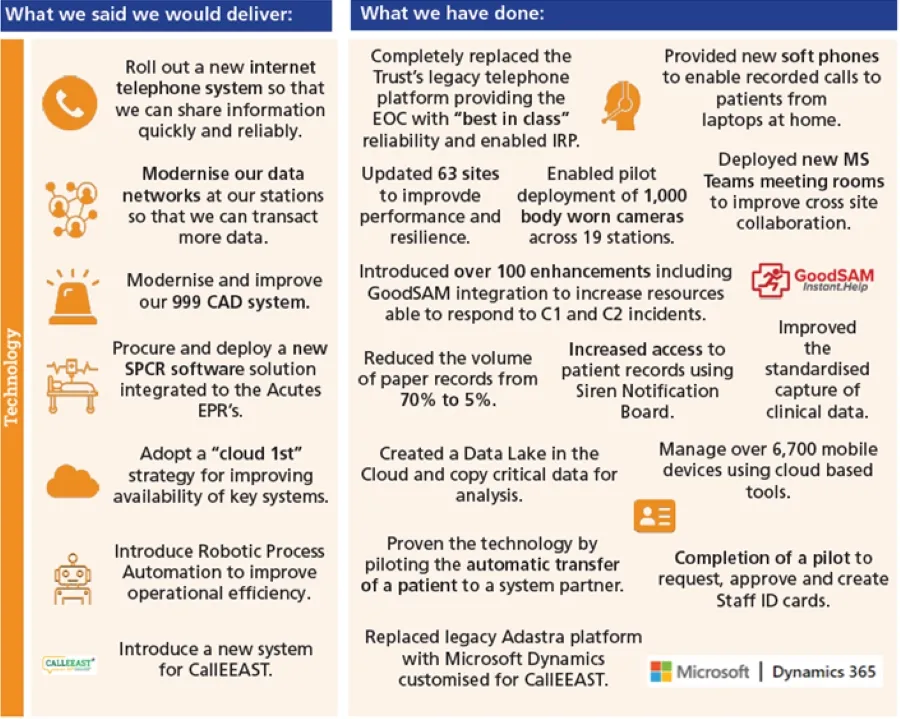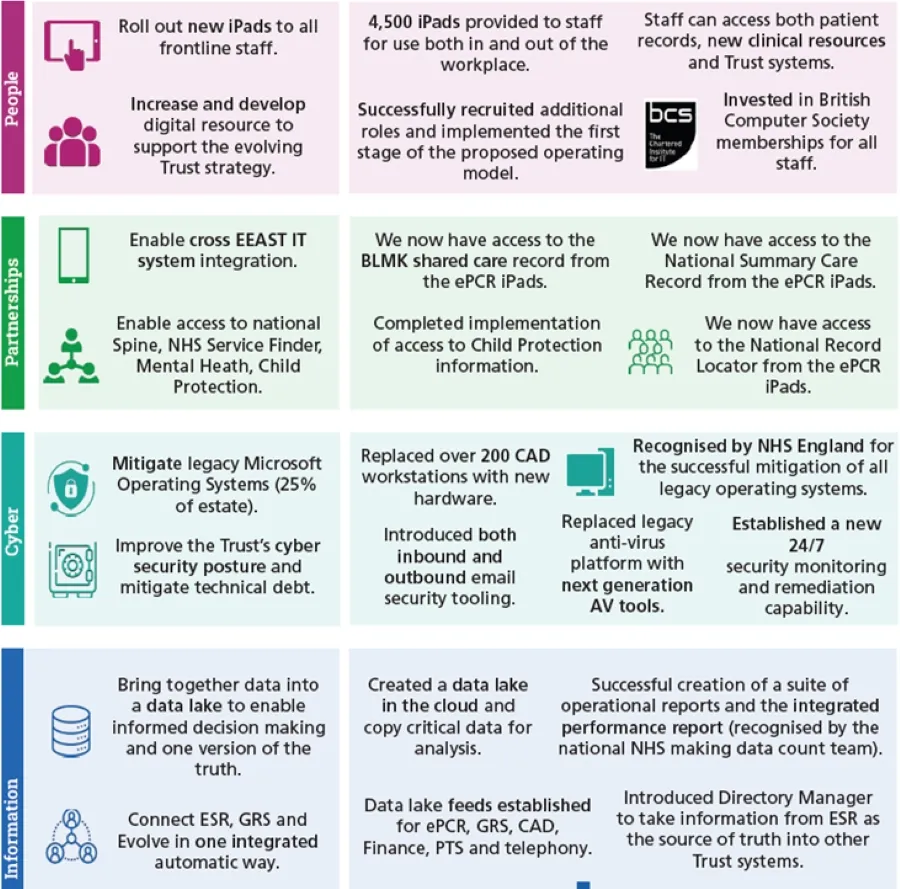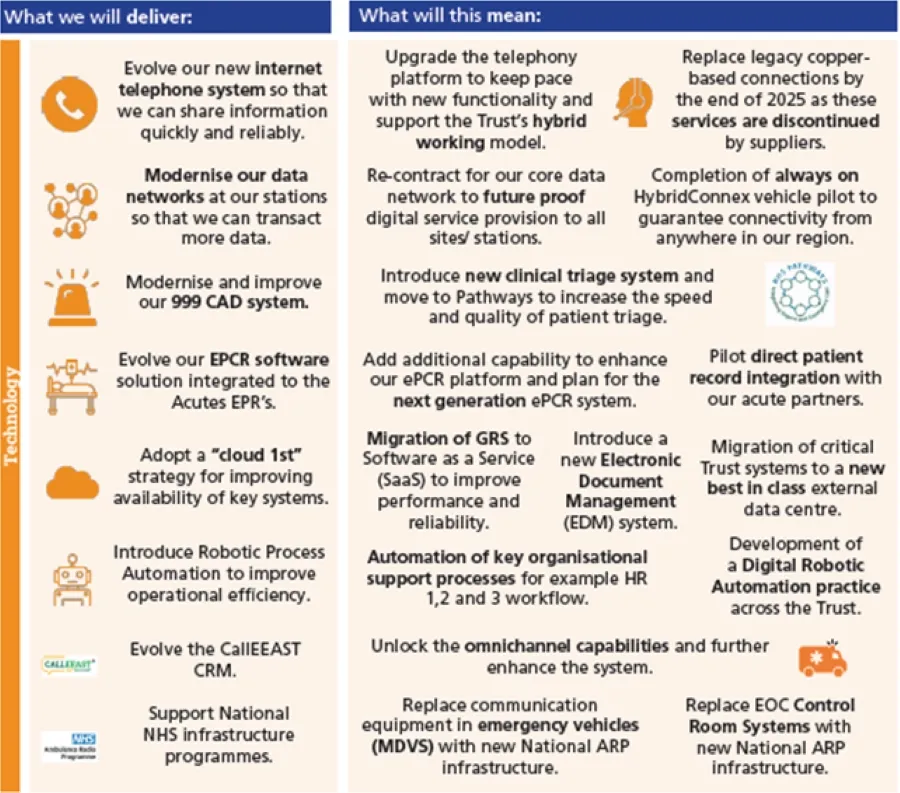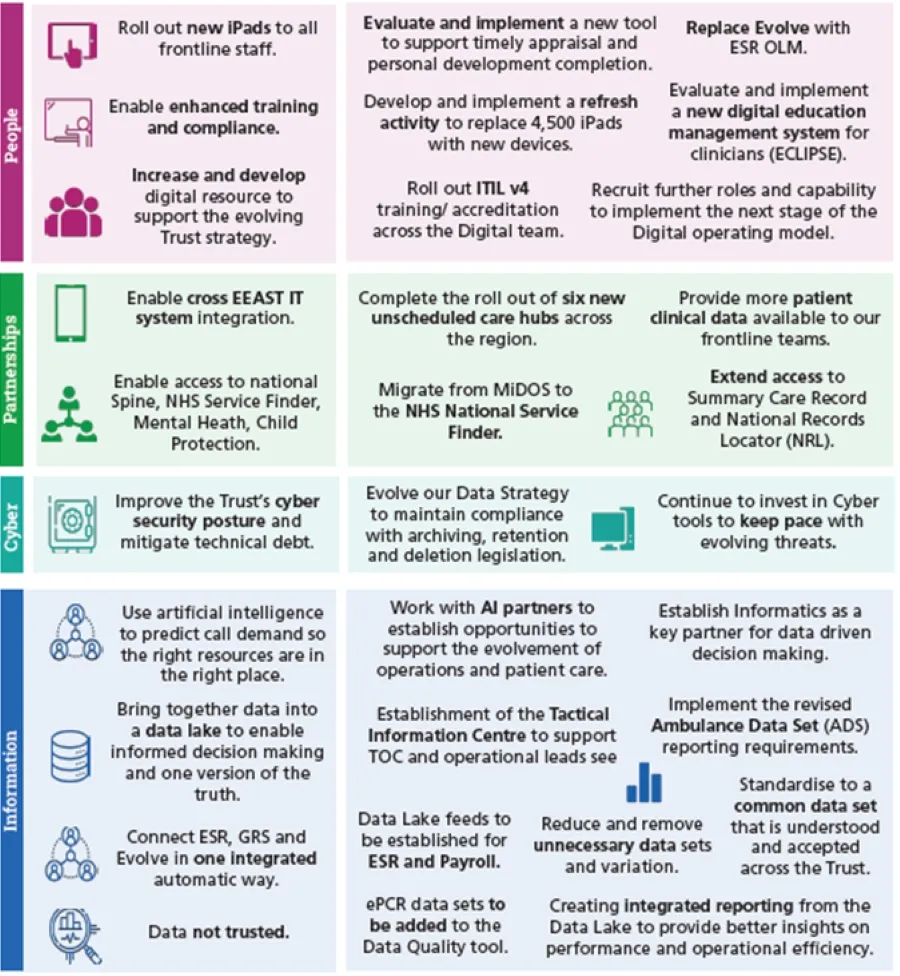Annual Report and Accounts 2023-24
Date published: 2 August 2024
Summary
Our annual report is produced so that we can present information about our services and report on our performance. We do this in line with our commitment to openness and transparency and the published guidance set out by the Department for Health and Social Care (DHSC).
In this report
- Introduction
- Welcome from our Chair
- Overview from our Chief Executive
- Our Trust
- Highlights from 2023/24
- Section 1: be an exceptional place to work, volunteer and learn
- #CareerForLife
- Our People
- Colleague Experience
- Colleague Training and Education
- Health and Wellbeing
- Our Volunteers
- Section 2: Provide outstanding quality of care and performance to our patients
- Quality Account
- Patient and Public Involvement
- Compliments, concerns and complaints
- Patient Safety
- Infection prevention and control
- Health and Safety
- Safeguarding
- Section 3: Delivering outstanding care, with exceptional people, every hour of every day
- Urgent and Emergency Services
- Clinical Assessment Service
- 999 Call Answering
- Single Point of Contact (SPOC)
- Hospital Handover
- Emergency Preparedness, Resilience and Response
- Non-Emergency Patient Transport Services
- Section 4: Be excellent collaborators and innovators as system partners
- Our Partnerships
- Commercial Partnerships
- The East of England Ambulance Service Charity
- Section 5: Be an environmentally and financially sustainable organisation
- Sustainability
- Finance
- Section 6: Delivering our strategic goals
- At a glance highlights
- Our Digital Strategic Planning progress and priorities for 2024/25
- Our Trust Strategy 2025 to 2030
- Section 7: Accountability report
- Directors' report
- Governance statement
Welcome from our Chair
I became chair of EEAST in June last year, after three years as a Non-Executive Director. The one thing I have learnt in my four years here is that this organisation never stands still. The last year has been filled with challenges but also remarkable progress that I think everyone at EEAST should be very proud of.
As a board, we have set a clear direction for the organisation with three overarching priorities:
- To drive culture change and improve staff wellbeing
- To reduce Category 2 ambulance response times
- To improve navigation of 999 calls to improve patient outcomes
To do this we have strategies that have outline on what we will do, within EEAST, and how we will continue to work with our partners outside the organisation, across the wider health and social care system.
Internally, we have made significant progress including the recruitment of over 700 front line staff, a reduction in staff turnover and improved wellbeing in the workplace, evidenced through lower sickness rates and continued improvements in our staff survey results.
Externally, we have done a lot of work to share our plans and priorities with our partners across our six integrated care systems. We have taken shared responsibility for ambulance response times as hospitals have increased their focus on handover delays. Also, we have worked with our partners to set up new Unscheduled Care Hubs, which provide community-based support for those 999 calls that are not best served by an ambulance response.
Through all of this work, we have made significant improvements to the service we provide for the public of the east of England for ambulance response times compared to last year with many more being handled by our community-based partners. This progress was recognised by our regulators when we came out of special measures which was a testament to the hard work of all of our staff and volunteers. Thank you for this.
However, we are under no illusion, there remains much work to be done. For example, we need to get better at how we manage and maintain our fleet, we need to do further work on improving the culture at EEAST making our organisation one where everyone feels they belong, our ambulance response times are still too long and variable.
This is why we are building on the progress we have made so far with energy and a determination to further improve outcomes for our patients and the experience of our people. We have set clear deliverables for the coming year to further improve performance against our priorities. We have also started work on a 2030 strategy for EEAST that is grounded in what the public of the east of England needs from its ambulance service and listening to our people about what they think the service should look like. We will keep you updated on this work.
Over the last year, I have made it a priority to meet as many staff, volunteers and patients as I can. Our people have hosted me at stations, control centres, hospitals, training centres, in ambulances, team meetings, conferences and awards ceremonies. It has been my pleasure to spend this time with you and I fully intend to continue to listen to you. Thank you to everyone I have met.
And finally, I would like to take a moment to say thank you to Nicola Scrivings, my predecessor as chair. She guided the organisation through an incredibly difficult period during the covid pandemic and was the one that first recruited me to the board. Without her, I would not have the pleasure of being here and being your chair.
Mrunal Sisodia, Trust Chair
19 June 2024
Overview from our Chief Executive
As we look back on the year 2023/24, the East of England Ambulance Service NHS Trust has navigated another period of remarkable challenges and significant achievements. Our commitment to providing exceptional care and improving our service has led to good progress against those areas where we know we need to improve.
This year, we have secured a 10% increase in ambulance hours on the road, now totalling approximately 12,300 hours per day. Our staffing has seen a significant boost, with over 200 more frontline clinicians now working on the frontline. These numbers not only represent our growth but also our relentless dedication to meeting the ever-increasing demands of our community.
We have also worked hard to change our service, seen through a doubling of our referrals to alternative pathways, which increased by 120% over the course of the past year. This leap forward in patient care efficiency exemplifies our commitment to adopting more effective and responsive care delivery models.
Our collaboration with fire services and the establishment of Community Wellbeing Officer teams have expanded our reach and enhanced our co-response capabilities. With 13 Fire Stations now actively responding to Category 1 calls, and our community-first responders providing invaluable support, we have strengthened our collective ability to respond more effectively to emergencies.
This work has helped us deliver faster responses to our patients, with improvements across all call categories, of note we have responded 34% faster to Category 2 incidents and seen a significant reduction in patient safety incidents related to delayed responses to our patients.
Culturally, we have made great strides. Our staff survey data shows us as the most improved ambulance service for the second consecutive year. This, coupled with the removal of our Trust from the National Recovery Support Programme by NHS England and the lifting of conditions by the CQC, marks a pivotal regulatory accomplishment and a step forward in our improvement journey.
Looking ahead to 2024/25, we aim to further increase our ambulance hours on the road by over 5%, while continuing our focus on efficiency, productivity, and engagement. Our plans to expand the use of alternative pathways and to develop targeted strategies for improving clinical outcomes in emergencies like cardiac arrests and falls, highlight our ongoing commitment to improving patient care.
Infrastructure-wise, we are on track to see the opening of our first new ambulance station for many years during 2024/25 and the beginning of work on at least two further new stations, this, alongside the planned replacement of over 150 ambulance vehicles demonstrate our commitment to make sure our people have the resources they need to deliver top-tier care and service to our communities.
We will also continue to drive the transformation of our service, be that through further integrating our service, our continued work to improve our culture and regulatory position so we can continue to build an ambulance service that our people and our communities are proud of.
In closing, I extend my deepest gratitude to every member of our team for their exceptional dedication and hard work. Your contributions are the foundation of our successes and together, we continue to rise to the challenges we face, guided by our shared purpose of saving lives and serving our community.
Tom Abell, Chief Executive
19 June 2024
Our Trust
The East of England Ambulance Service (EEAST) provides emergency and urgent care services throughout Bedfordshire, Cambridgeshire, Essex, Hertfordshire, Norfolk and Suffolk.
The east of England is made up of both urban and rural areas with a diverse population.
As well as a resident population of about 6.3 million people, several thousand more tourists enjoy visiting our area in peak seasons each year.
Our area also contains several airports including London-Luton and London-Stansted as well as major transport routes which increase the number of people in our region daily.
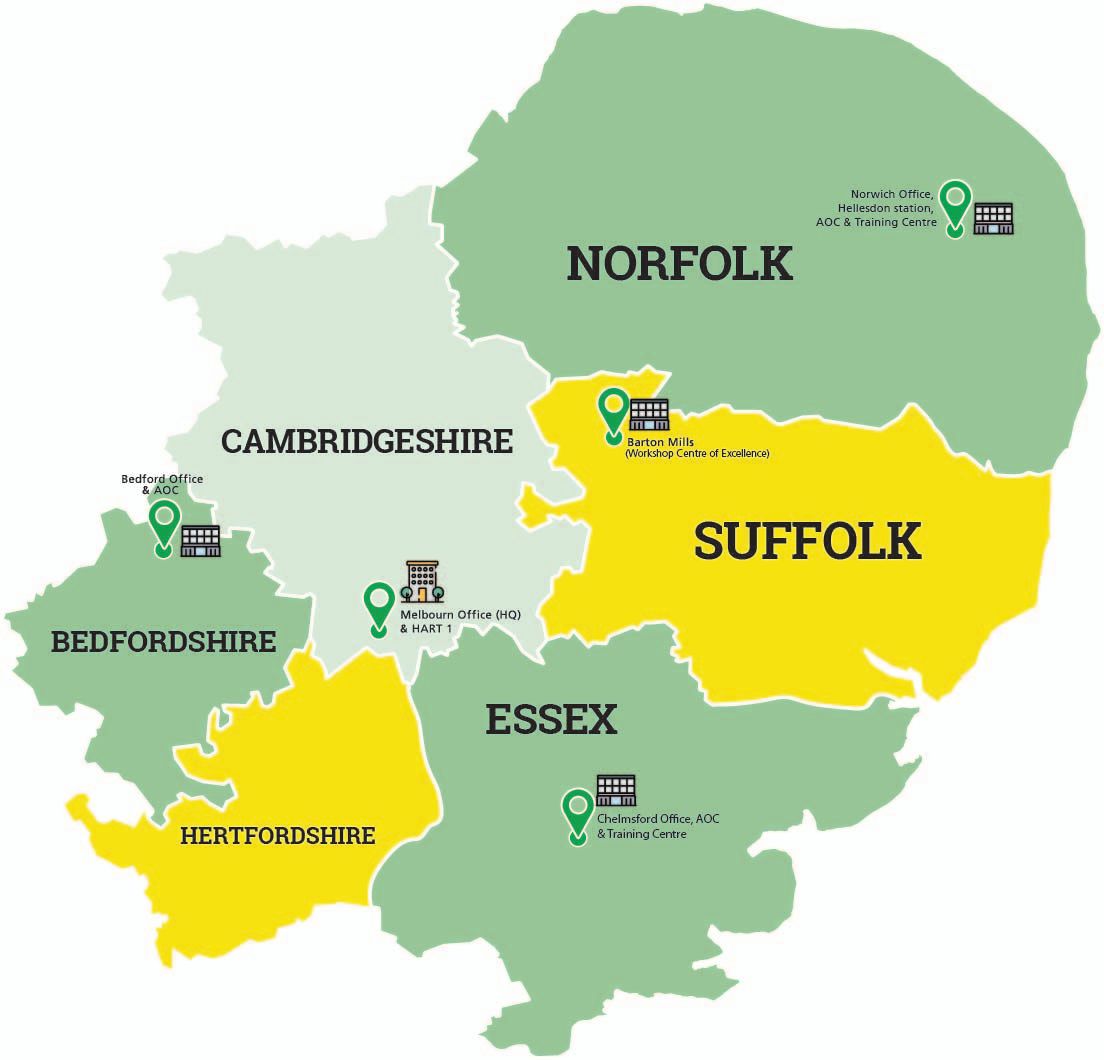
During 2023/24 we provided non-emergency patient transport services for patients needing non-emergency transport to and from hospital, treatment centres and other similar facilities within Cambridgeshire, parts of Essex, Bedfordshire and Hertfordshire.
We work with six Integrated Care Systems (ICS) covering an area of approximately 7,500 square miles.
We employ more than 5,000 colleagues operating from over 120 sites and are supported by more than 1,000 dedicated volunteers working in a variety of roles including: Community First Responders; volunteer car drivers; BASICS doctors; chaplains and our community engagement group.
EEAST’s Headquarters is based in Melbourn, Cambridgeshire and there are ambulance emergency operations centres (EOC) at each of the three locality offices in Bedford, Chelmsford and Norwich which receive over 1.3 million emergency calls from across the region each year as well as calls for patients booking non-emergency transport.
Response to 999 calls as an emergency and urgent care service
In 2023/24, our emergency operations centre (EOC) received 1,384,547 emergency contacts from the public. On average, over 2,750 emergency 999 calls came into the ambulance service every day.
Call handlers record information about the nature of the patient’s illness or injury using sophisticated software to make sure they get the right kind of medical help. This is known as triaging and allows us to ensure that the most seriously ill patients can be prioritised and get the fastest and most appropriate response.
Scheduled Care Service – Patient Transport Service
We deliver a Non-Emergency Patient Transport Service (NEPTS), working in collaboration with hospitals and treatment centres, transporting and caring for a variety of patients, including elderly and vulnerable people, and those with mental ill health, to and from outpatient clinics, day-care centres, and other treatment facilities.
Colleagues are trained to lift and manoeuvre patients in and out of vehicles, ensuring patients are safe and comfortable during the journey and arrive on time for appointments. Colleagues are trained to administer first aid or life saving techniques should this be necessary. Other duties include making sure vehicles are clean and tidy, in line with strict infection and prevention guidelines and keeping accurate records of journeys.
During 2023/24 we undertook 437, 647 patient journeys and 41,728 escort journeys – a total of 479, 375 NEPTS journeys.
Resilience and Special operations
EEAST operates two hazardous area response teams (HART) and has a resilience and specialist operations team which oversees the Trust’s preparation for responding to a major incident along with business continuity incidents. The team works very closely with partner agencies and local resilience forums.
Commercial services
We operate several Commercial services that generate income for the Trust, as well as providing organisational resilience:
- CallEEAST, our non-emergency and commercial contact centre, offers an array of contact centre solutions to commercial organisations and other NHS Trusts. The team supports 80 separate contracts handling more than 850,000 calls every year.
- The National Performance Advisory Group (NPAG) brings people together nationally to share best practice and showcase industry developments across the NHS enabling innovation and efficiency.
- TrainEEAST, EEAST’s commercial training department offers a wide range of first aid and emergency care training courses for businesses, organisations, individuals and our own colleagues.
Highlights from 2023/24
Two EEAST clinicians were chosen to be part of just 22 representatives of the nation’s ambulance service that formed part of the honour guard for the King’s Coronation.
Paul Leech, a Leading Operations Manager based in Suffolk and Jason Buxton, a senior paramedic and instructor from Cromer joined other representatives of the uniformed services to line the route of the coronation in full dress uniform when the King and Queen passed through to and from the ceremony.
Thomas Pont, Duty Manager at EEAST’s Norwich Emergency Operations Centre, won an award from the Association of Ambulance Chief Executives (AACE) in recognition for outstanding service.
Thomas said: “Being nominated for this award was such a shock, and it is such an honour to be nominated let alone win this award! I love my job and far from being exceptional, I just always try to do my best for my colleagues and our patients”.
Staff at EEAST picked up two awards at the prestigious Control Room Awards 2023.
For a second time in the last three years, Ben Hawkins, a dispatch team leader, won a Control Room award when picking up the Community Champion Award.
Francesca Kusel-Baum, a regional clinical co-ordinator at EEAST, received the Young Achiever Award.
Francesca said: “I am so honoured to have been nominated for such an award and to win is so unexpected. It is humbling to know that success is recognised, in what we consider the ordinary within the Emergency Operation Centre”.
Staff at EEAST joined colleagues from across the NHS at a service at Westminster Abbey to mark the NHS’s 75th Birthday.
Terry Hicks, head of operations for Cambridgeshire and Peterborough, Zoe Martindale, Philip Bygrave, and Chaplain Tony Mills all made the journey to London to join colleagues from across the NHS at the service.
A senior paramedic who has worked for EEAST for 34 years was among the finalists for the Sun newspaper’s, Who Cares Win Awards.
Mark Giddens, who works out of Stevenage Ambulance Station, was one of three finalists for the 999 Hero category at the annual awards broadcast on Channel 4.
The Sun shortlisted Mark for the award after hearing of his tireless dedication to the ambulance service and patients – both inside and outside of working hours.
Paul Henry, who worked as deputy director of operations support, retired after more than 40 years of service.
Paul joined the NHS in 1983 and started his career with the Norfolk Ambulance Service before going on to become one of the county’s first paramedics in 1987. He then took responsibility for the training and development of all ambulance staff in Norfolk four years later. Since then, Paul has held a variety of senior operational and management roles within EEAST, as well as taking responsibility for a range of major projects.
The industry-leading work EEAST has put into assessing and managing patients with skin tears over the course of the last 3 years has been recognised by the Journal of Wound Care, after being shortlisted for an award at its annual ceremony in London.
Tim Hickey, EEAST Clinical Lead for Primary and Urgent Care said 'We're absolutely thrilled to have been nominated for this award which reflects the huge efforts by the EEAST project team and frontline staff of all clinical grades to make the introduction of the Trust-wide skin tear management pathway and Biatain Silicone dressings a success'.
Gino Anzivino retires after 43 years of service. Retirement was well deserved after so many years of dedicated service.
Gino started work with the Cambridgeshire Ambulance Service in 1980 and has been based in Peterborough, North Cambs, throughout his long career. Over the 43 years of service, he has seen enormous changes in the development of our service. Most recently Gino has worked as an RRV Paramedic in the Peterborough area.
EEAST's medical devices team was awarded an international ISO quality standard following an extensive audit process.
We are the first ambulance service in the UK to receive the global ISO 13485:2016 accreditation for medical devices.
Katie Birkenhead, Head of Medical Devices said: “This certification is a fantastic achievement for the team, they have all worked incredibly hard and it is a credit to their commitment.”
#CareerForLife
EEAST launched its recruitment campaign - #CareerForLife.
There are hundreds of people at EEAST who have been with the Trust for many years, many with careers spanning decades. We wanted potential recruits to know that a career within the ambulance service can be a career for life. Everyone has a different journey and story to tell.
The campaign focused on our own people stories and their career journeys to inspire others to start their own journey at EEAST.
The #CareerForLife case studies showed some unique career journeys and the diverse range of career options available within EEAST – whether that’s moving from one department to another, progressing in their role, or staying in their role long term if that’s the journey that works best for them.
Our People
Central to our vision is the steadfast belief that EEAST should not only be a place to work, but also a community where individuals feel valued, supported and inspired. We recognise that our success depends on the wellbeing, engagement and professional development of all our people.
As EEAST progressed on our cultural improvement journey, our focus remained on fostering an environment where learning was celebrated, growth was encouraged, and collaboration thrived. Throughout 2023/24, we worked to develop our leaders, embed improved processes and deliver year one of our People Strategy. This ensured the right mechanisms were in place to empower and support our people to deliver the right care to our patients and communities.
EEAST focused on creating an inclusive, engaging and progressive environment where the safety and wellbeing of our people, is at the heart of everything we do, to enable us to deliver the right care, to the right patient at the right time.
Our colleagues on the front-line, those in control rooms and those providing non-emergency services are the ‘face’ of EEAST. Supporting these colleagues are hundreds of others within our support services functions. These include our Make Ready Services, Finance, HR, Estates, Communications and many others.
Each member of our EEAST team, regardless of their role, play a crucial part in guaranteeing that we offer our patients the highest standard of care possible.
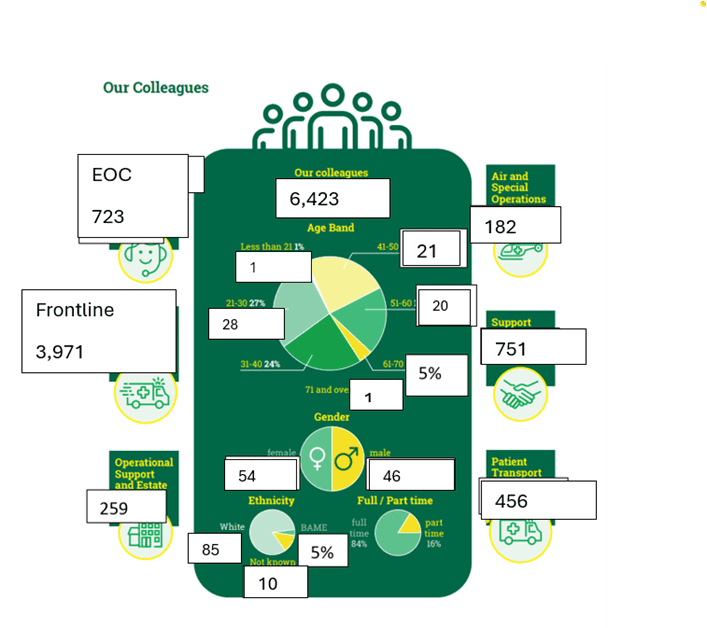
Turnover and Retention
EEAST successfully reduced staff turnover through a well-planned strategy, keeping a strong workforce with valuable experience and skills, while saving money on recruitment and external staffing.
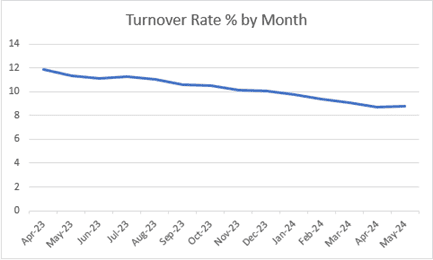
We knew change wouldn't happen overnight, so we focused on making lasting improvements that were both impactful and financially responsible. Retaining the skills and experience of our people remained a top priority for EEAST.
Turnover and retention remained key issues generally within the NHS. EEAST's turnover rate decreased steadily from 11.9% in April 2023 to 9.1% by March 2024, as a consequence of EEAST’s long-term interventions.
We worked closely with national and regional partners, aligning efforts with initiatives like the Regional Retention Improvement Plan, and implemented internal strategies outlined in the EEAST Retention Improvement Plan, all in line with our People Strategy and Wellbeing Plan.
Our workforce led local initiatives that made a real difference, included:
- Improving recruitment and onboarding processes.
- Developing clear career pathways for staff.
- Supporting leaders with exit processes through the HR Business Partner Team.
- Using data to refine our organisational strategies.
- Enhancing our redeployment process, resulting in 49 successful redeployments since August 2022.
Together, these efforts improved the overall experience for our people, ensuring a positive journey throughout their time at EEAST.
EEAST became the first ambulance service to be awarded the prestigious bronze level Dyslexia Friendly Quality Mark by the British Dyslexia Association.
The award, only issued to schools or organisations which demonstrate they provide high quality education and/or practice for dyslexic individuals.
To mark Dyslexia Awareness Week our CEO Tom Abell and Director of Strategy and Culture Hein Scheffer met with Justin Honey-Jones, specialist lecturer practitioner to sign the British Dyslexia Association Workplace Pledge, reaffirming our commitment to learning more about dyslexia and challenging stigma, discrimination, and prejudice.
Justin said: “Dyslexia is not a barrier to achieving ambition in our Trust and we are committed to inclusion and supporting our people to achieve their potential.”
EEAST welcomed its first students with autism for work experience trials.
Two students from the Wherry School in Norwich – a specialist school for students with autism - joined the team at the Longwater ambulance base to try out working in the Make Ready service. They were mentored by Make Ready lead Steve Hill, who said: “I’m really excited to play a part in supporting the students in gaining an understanding of working, whilst being in a working environment. I hope they enjoy the moment and take away the experience to fulfil whatever career they choose.”
Colleague Experience
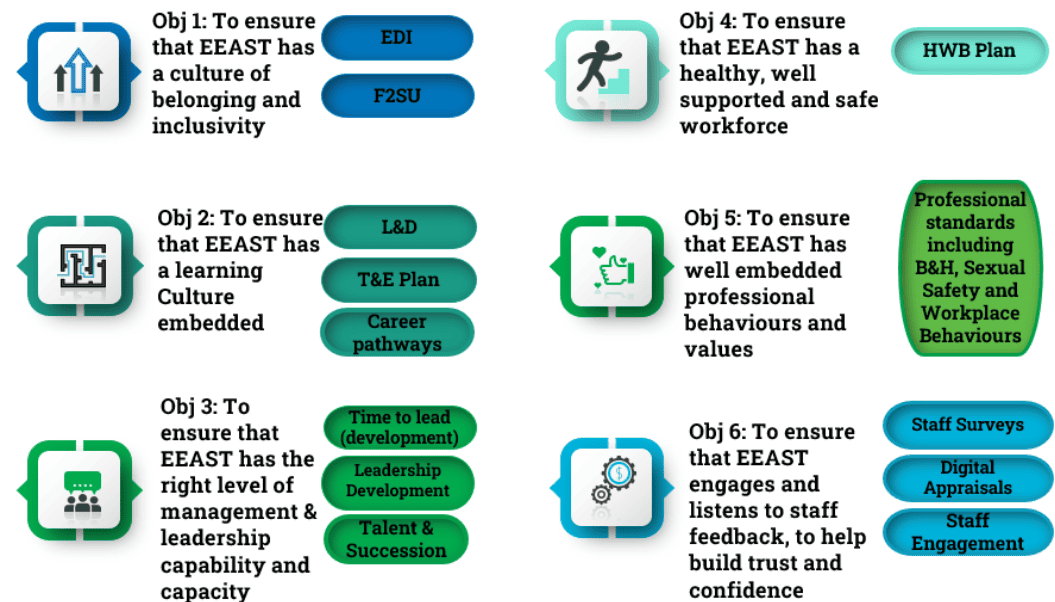
During last year, EEAST continued to enhance its cultural journey by taking account of previous national staff survey, local pulse survey results and direct feedback, as a result EEAST expanded the number of programmes supporting colleague experience development, from 5 to 14, which encompassed a wider range of initiatives to be introduced.
EEAST was always clear on the improvements required to enhance colleague experience and worked during the year on six objectives, outlined in the graphic to the left.
All activity was tracked to programme plan and delivery outputs, measured via our culture dashboard, which showed month on month improvement during 2023/24.
EEAST's vision for being a great place to work
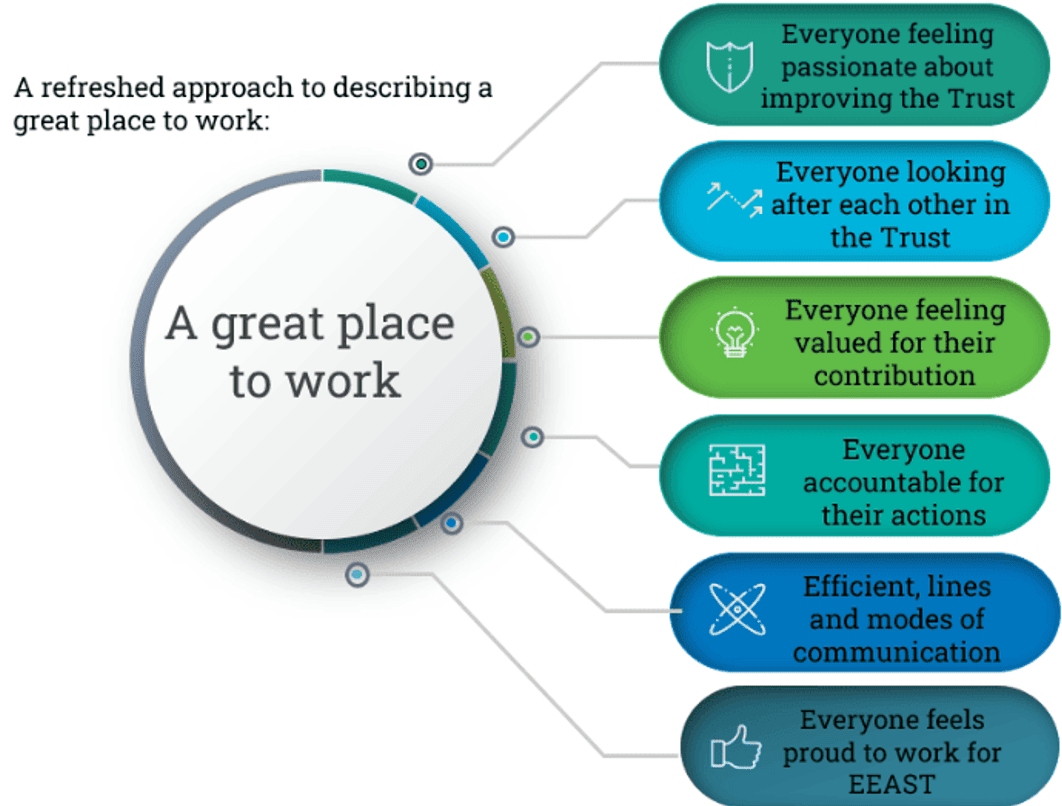
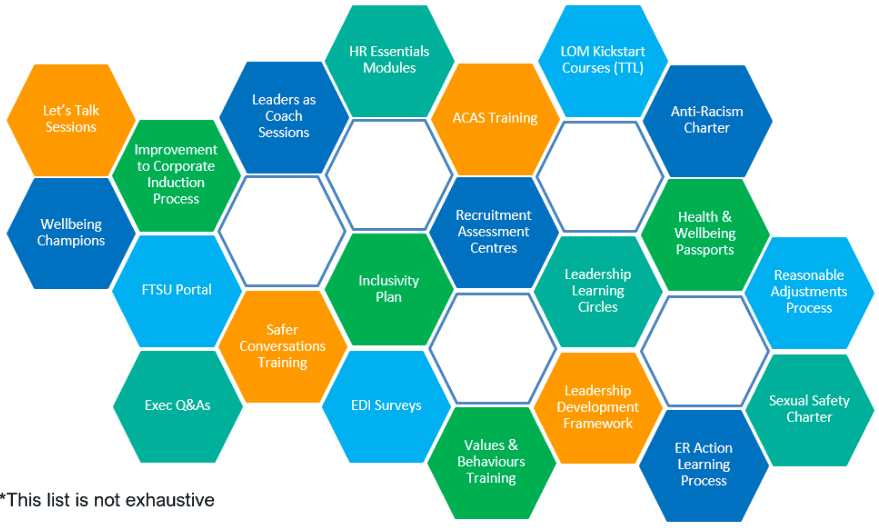
The graphic above highlights some of the themes and actions to support our effort to make EEAST a great place to work.
Colleague Feedback
The NHS 2023 staff survey report obtained a strong completion rate of 52%. Whilst lower than the previous year, EEAST’s response remained comparable with other ambulance trusts across the UK.
EEAST continued to take a positive step forward with regards to colleague experience; 93% of questions scored more positively than in 2022, which retained EEAST the accolade for most improved survey results, for the second year in a row. EEAST saw a 10% improvement in staff recommending the organisation as a great place to work, compared to 2022.
These results demonstrated EEAST continued to improve colleague perception and experience, particularly in areas around colleague development and support which held the largest satisfaction increases in the 2023 survey. This trend was also reflected in the pulse surveys conducted over the last year, which further highlighted an upward improvement of positive responses in all EEAST’s nine engagement measures.
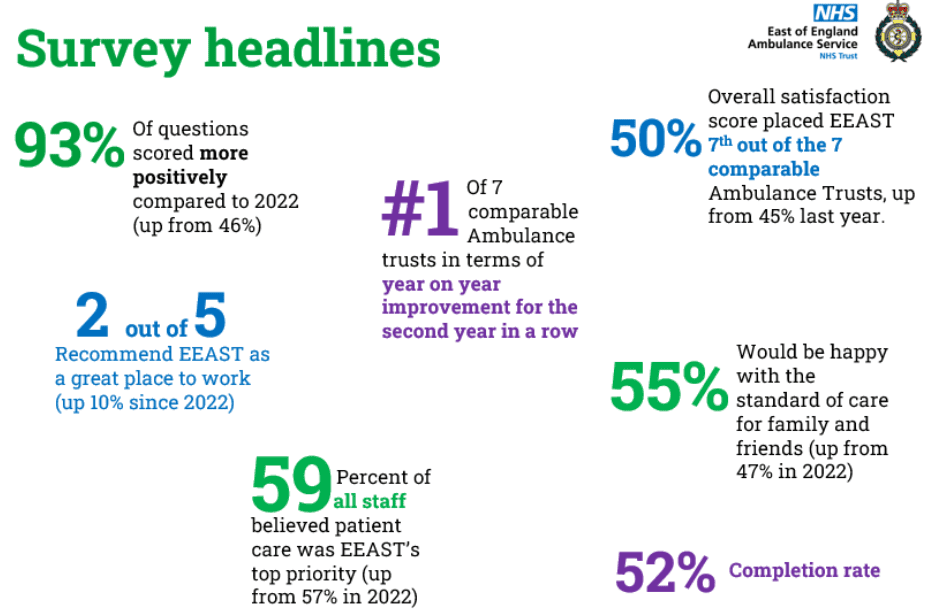
The graphic below shows a comparison over the past two years of the most improved areas and areas showing a reduction.
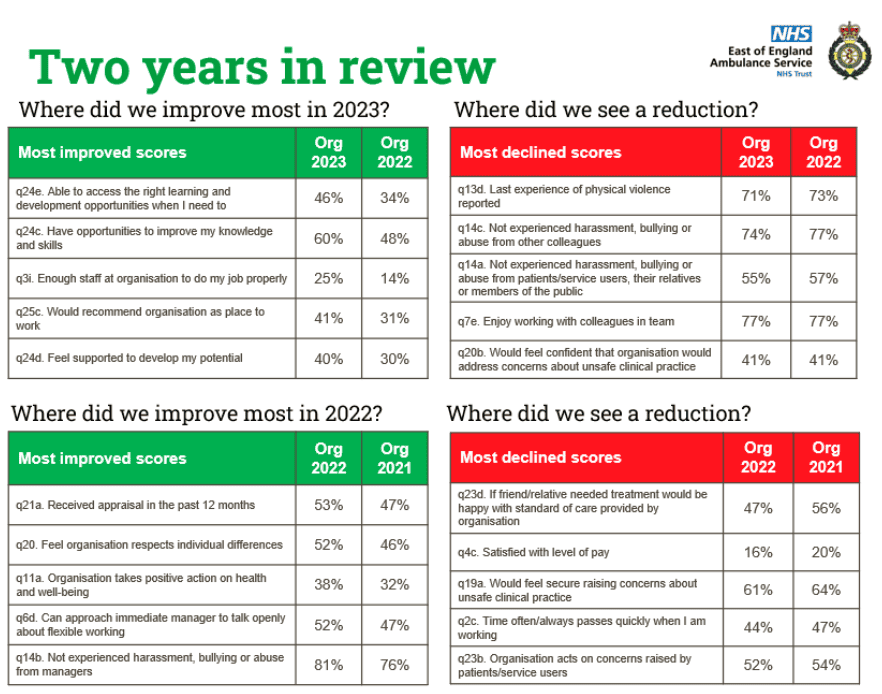
EEAST’s board believed this survey demonstrated a great step forward and reminder that we are heading in the right direction and are well on the way to becoming a great place to work.
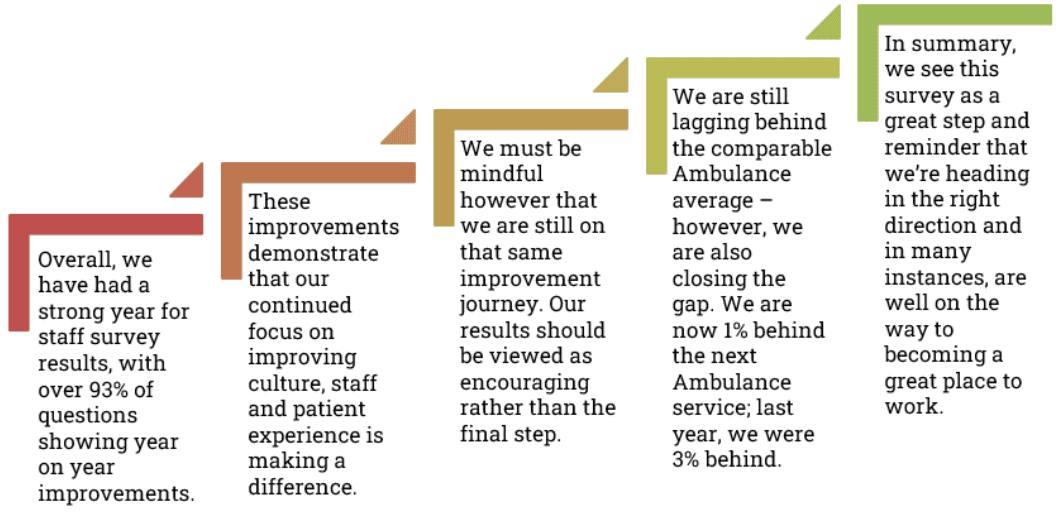
During 2023/24 all directorates developed action plans in response to their staff survey results to ensure continued focus and effort. We also introduced ‘Listening into action’ events during 2024, to allow our colleagues to learn, co-create and inform the action plan for their directorate.
The staff survey data continued to be triangulated with other staff data, such as employee relation cases, patient safety cases and Freedom to Speak up information, to identify trends across EEAST and put suitable action plans in place where required. Cross directorate sharing forums are in place between multi-disciplinary teams to review this data on an ongoing basis and provide support where required.
Our approach was to continually build momentum and impact following the annual staff survey. EEAST continued to implement ‘additions’ each year so we can increase the level of engagement with our people – not only about the results, but also how we co-create solutions. The graphic on the left demonstrates EEAST’s ambition for next year compared to previous years.
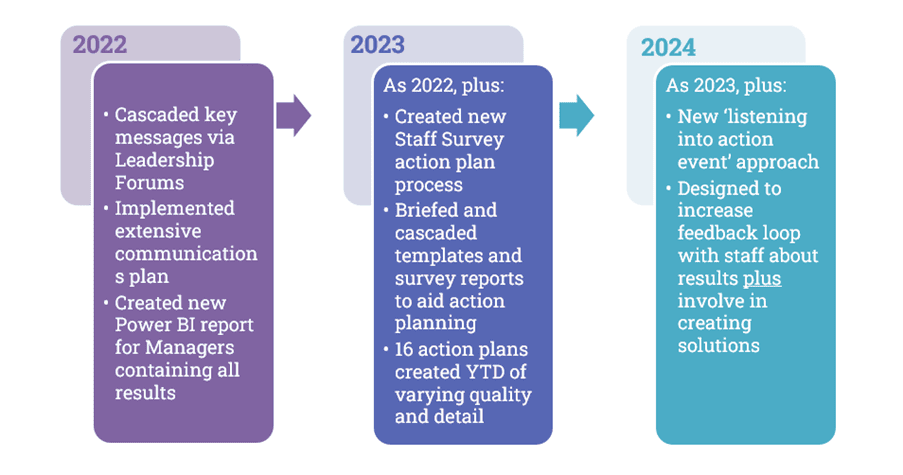
EEAST Surveys
EEAST continued to conduct annual colleague surveys for minority groups as part of a three-year inclusivity plan, to understand what our baseline of colleague lived experience was supporting us to form valid and relevant targeted action plans.
The three surveys were carried out between January and April 2024 for colleagues who are Black and Minority Ethnic (BME), LGBT+, or have a disability or neurodiverse condition. Our surveys are supported by the different equality, diversity and inclusion networks within EEAST.
The graphic below shows the results compared to previous years.
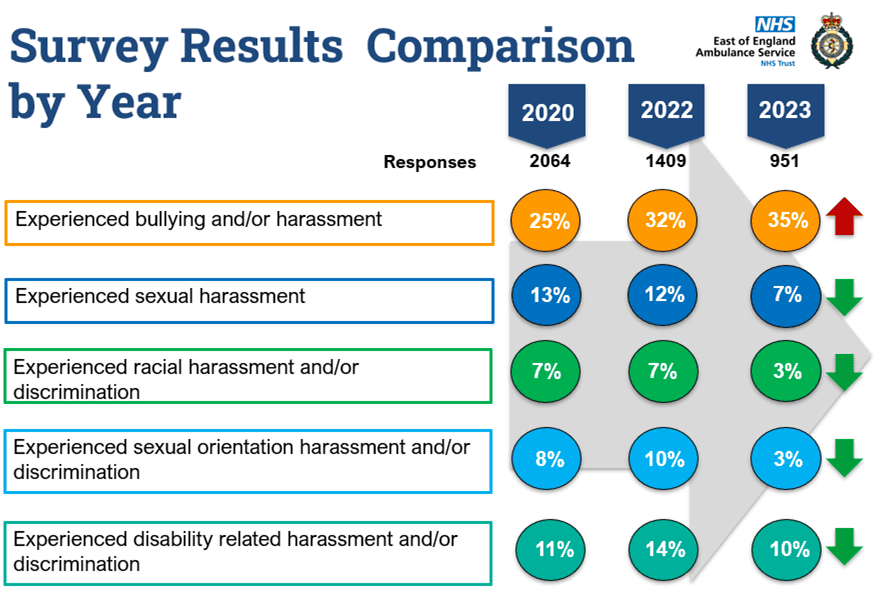
Raising Concerns: Freedom to Speak Up (FTSU)
Over the past year, FTSU benefited from an increased resource of two additional Guardians and 15 Ambassadors which led to an increase in colleague and organisational understanding of what speaking up is about. Also, improved visibility, availability, capacity and resilience of the FTSU team, inevitably led to an increase in the number of new cases raised.
The continued engagement from the Chief Executive Office developed a bi-weekly executive message which provided updates on service developments, plans and appreciation shown for the work colleagues undertake via the ‘Thank you Thursday’ message.
The executive Question&Answer sessions continued on alternate weeks to provide a confidential and anonymous route for colleagues to ask questions or raise concerns directly with the executive team and senior leaders. This along with regular messaging on the various routes for colleagues to speak up, some which focused on specific themes such as bullying and harassment, provided evidence to colleagues that speaking up was being driven and welcomed by the leadership.
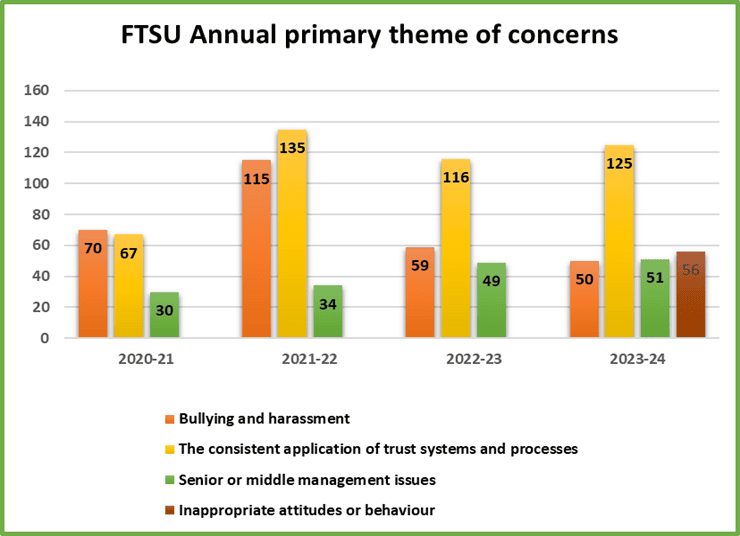
The top three themes of concerns reported correlate with previous years, with 8% more colleagues reporting a lack of consistency in the application of some of EEAST’s systems and processes.
There has been a slight reduction in the number of colleagues reporting bullying and harassment and a significant increase in reports of inappropriate attitudes or behaviours. EEAST’s work on culture, professional standards and civility is in its infancy and these numbers are expected to reduce over the next year. Issues regarding senior and middle managers remained the third highest reported theme. Last year 338 colleagues raised a new concern.
The graphic below demonstrates case numbers, by month, compared to previous years.
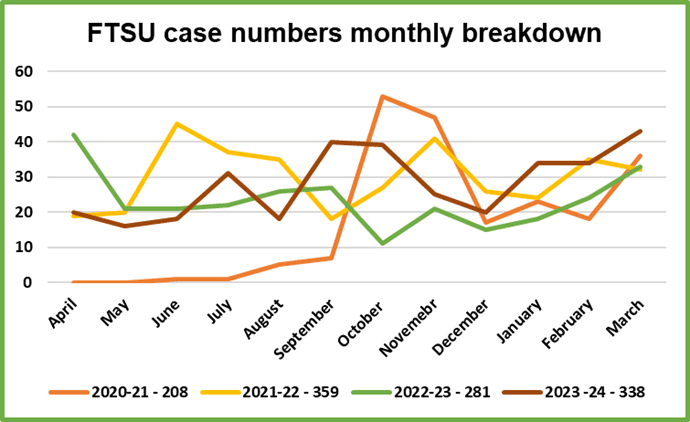
There has been a number of successes within FTSU including the National Guardian's Office requesting an EEAST FTSU case study which was included in its national annual report. In June 2023, it also published an analysis of the speaking up questions from the 2022 NHS Staff Survey, which replaced the preceding FTSU index. The survey identified EEAST as third in the top ten most improved FTSU score for trusts.
Question 23e of the national staff survey, “I Feel safe to speak up about anything that concerns me in this organisation” exceeded our target and increased to 49%, an increase of 3%. It provided EEAST with the assurance that the challenging work currently being undertaken around cultural change was making a difference to the culture of speaking up.
The year by year percentages of 'yes' responses are as follows:
- 2020: 43%
- 2021: 43%
- 2022: 46%
- 2023: 49%
- Average: 55%
- EEAST: 49%
Through our Raising Concerns Forum, EEAST conducted a data triangulation exercise during June 2023. This exercise combined multiple sets of data to identify trends and ‘hot spots’ in the organisation. Seven key themes that needed further review and action were identified.
- Staff perceptions of work
- Team working
- Line Management
- Health and Wellbeing
- Bullying and Harassment
- Appraisals
- Advocacy and trust.
The graphic below shows the themes and related actions to support improvement.
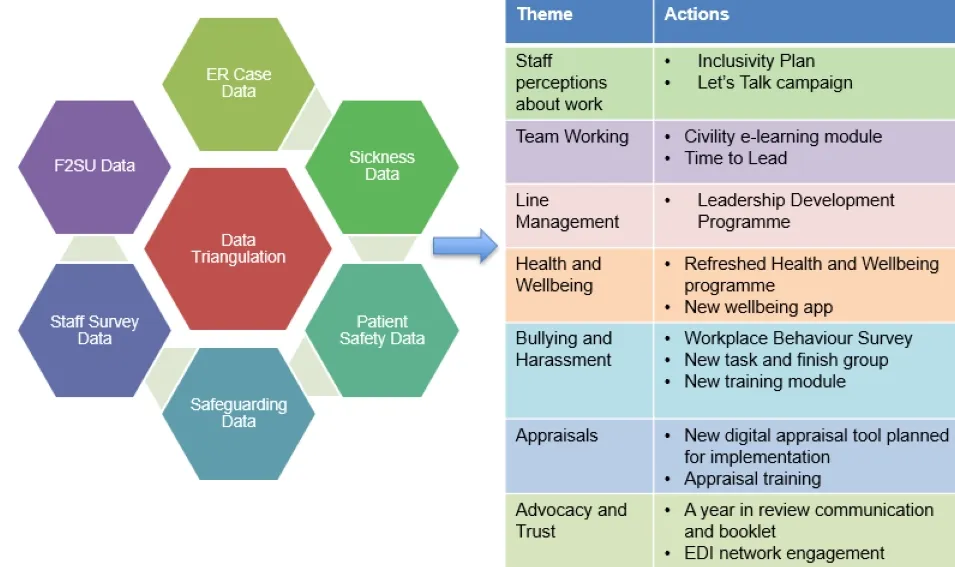
EEAST launched ‘Let’s Talk’ campaign
The ‘Let’s Talk’ campaign aimed to raise awareness about subject matters that may impact on the culture and working life within EEAST. To improve our awareness and understanding of the many different cultures around us, we must open the conversation and equip ourselves with the skills and tools to learn. The ‘Let’s Talk’ campaign brought together a range of actions that were either already taking place, or due to begin development soon
Leadership Learning Circle session on "Understanding Reasonable Adjustments and Process for Our People": As EEAST is working towards becoming a disability confident employer, it is crucial for our leaders to have a deep understanding of reasonable adjustments and the process involved in supporting our people. This Leadership Learning Circle session aimed to address this challenging topic and provided valuable insights and knowledge to deal with practical issues at work.
National Inclusion Week was the perfect time for us all to reflect on how we can do our bit to make sure all our colleagues feel valued and appreciated in the workplace. We want to be a Trust that celebrates, and learns from, each other’s differences which is why our EEAST Inclusivity Plan is going to play such an important part in how we develop over the next three years. The plan lays out the importance of making all our people feel safe, comfortable and supported. It has four clear aims which cover making EEAST a safe place for all, developing community partnerships, developing a recruitment campaign, and developing clear pathways for all our people.
Equality, Diversity and Inclusion
As EEAST continued its journey towards inclusivity, key initiatives that commenced during 2023/24 included:
- Achieving Disability Confident Level 2 Employer status
- Collaborating with Jobcentre Plus on a Positive Action project for long-term unemployed BME individuals and people with disabilities
- Finalising the implementation of Cultural Inclusion Agents, with six new members to be in place by Autumn 2024.
During 2023/24, EEAST made significant strides toward realising its vision of fostering an intentionally inclusive environment for both our colleagues and patients. This progress was guided by key objectives, comprising:
- Being Inclusive by Design
- An Employer of Choice
- Building an Inclusive, Respectful Culture for All
- Dedicated Inclusive Leadership
Last year, several noteworthy milestones were achieved aligned with these objectives.
The achievements of 2023/24 reflect EEAST's resolute commitment and aim of fostering an inclusive environment where it is intentionally inclusive, improve diversity and promote equality. As EEAST looks to the future, it remains dedicated to building on this progress and creating a workplace where everyone feels valued and empowered.
The graphic to below shows the themes being supported across EEAST.
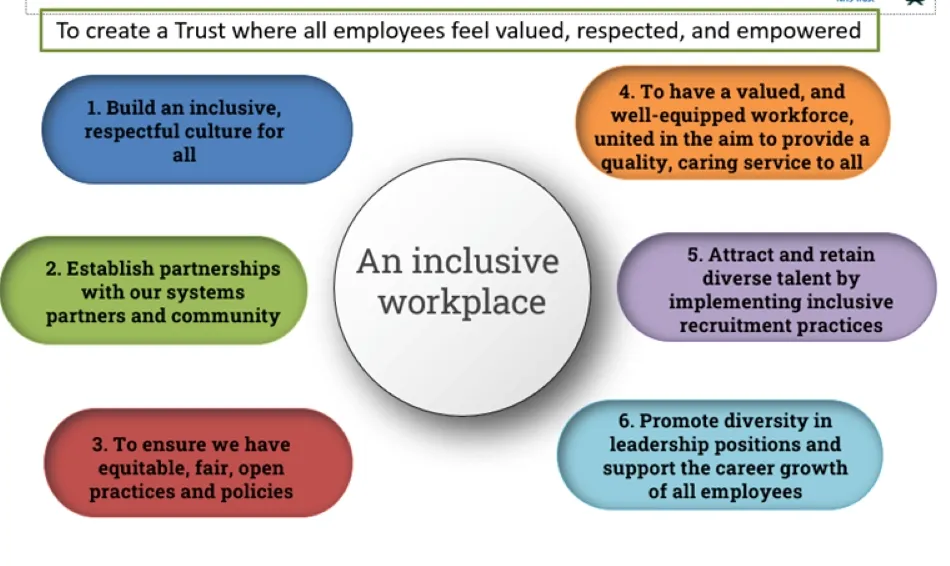
The Inclusivity Plan is crucial for creating a workplace that celebrates diversity, fosters inclusivity, and attracts and retains talent. Inclusivity is an integral part of building a stronger, reliant and sustainable Trust in today's culturally diverse society.
The graphic below shows the four themes of our Inclusivity Plan.
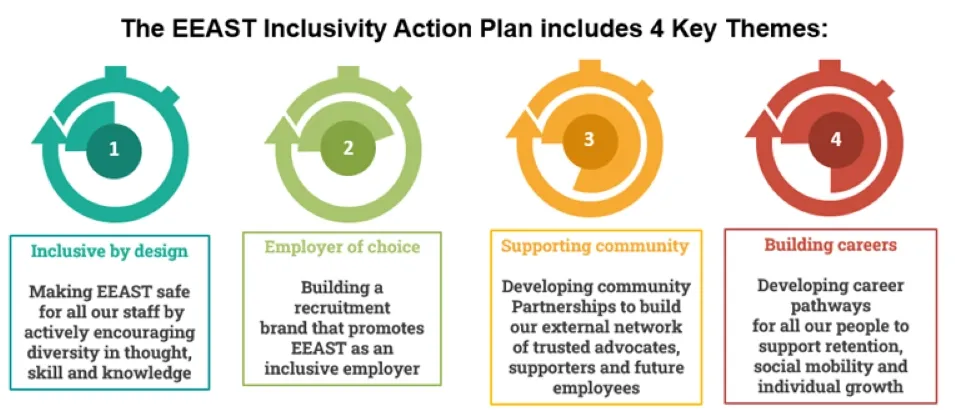
Enhanced Cultural Awareness: cultural masterclasses were delivered for operational leaders, providing them with invaluable insights and tools to navigate diverse environments. We commenced our "Let's Talk About..." campaign fostering open dialogue among colleagues, creating a psychologically safe space to discuss and explore pertinent topics such as racism, men's health, allyship, bullying, identity and menopause.
Equality Staff Network Engagement: the staff networks prioritised cultural awareness and engagement by hosting events and initiatives aimed at fostering understanding and involvement within our diverse communities. Highlights included events addressing prostate cancer, men's wellbeing, Pride celebrations, and a joint Black History month event honouring the achievements of Black women.
Equitable, and Accessible Systems: EEAST integrated an equality assurance audit system into the recruitment and HR processes, ensuring fairness and accessibility. Additionally, equality reviews had been conducted on several significant projects including Time to Lead, and St Alban Hub, over 20 separate equality impact assessments have been undertaken. An Associate Reasonable Adjustment Advisor was appointed to oversee a standardised system for EEAST.
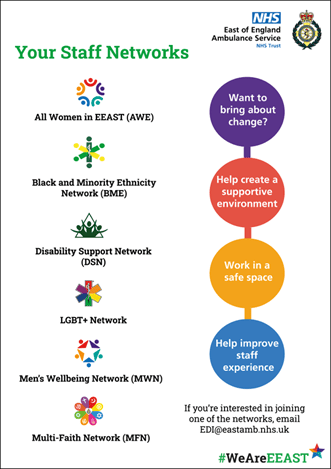
Leadership Development Programmes: The introduction of the Calibre programme, designed specifically for colleagues with disabilities, marked a significant step in our commitment to leadership development. The programme culminated in a successful graduation ceremony, with three graduates achieving promotions.
Community Engagement and Social Impact: in realising our aim to improve engagement and involvement with our BME communities led to starting several flagship projects including monthly attendance of job clubs and a reverse job fair for autistic people and people with learning disabilities.
EEAST was focused on establishing a culturally competent workforce and reviewed its recruitment and progression mechanisms particularly the “Expression of Interest” model, to explore areas for potential bias. Work continued with external stakeholders to improve EEAST’s attraction rate for both BME people and people with disabilities.
Colleague Training and Education
EEAST delivered the first in-house qualification that allows our volunteer trainers to assist with the induction training for Community First Responders.
By completing this course, they received the full Level 3 Award in Assessing Vocationally Related Achievement which allowed them to acutely assess students for the CFR’s regulated medical qualification completed at induction, the Level 3 Award for First Responders on Scene: Ambulance Service Community Responder. This allowed them to work alongside our Community Response Training Officers supporting training more CFRs across the region and helping to support patients and frontline crews.
The first cohort of EEAST colleagues to qualify as paramedics through a new apprenticeship degree programme with the University of Cumbria were celebrated at a special ceremony after achieving ‘phenomenal’ results.
The group of 20, who graduated, were presented with a certificate to mark their achievements on completing the Level 6 Degree Apprenticeship Paramedic Programme at a ceremony at The Athenaeum in Bury St Edmunds.
Over 80% on the programme achieved an upper-class honours degree with five of the group achieving a first and 11 achieving a 2:1.
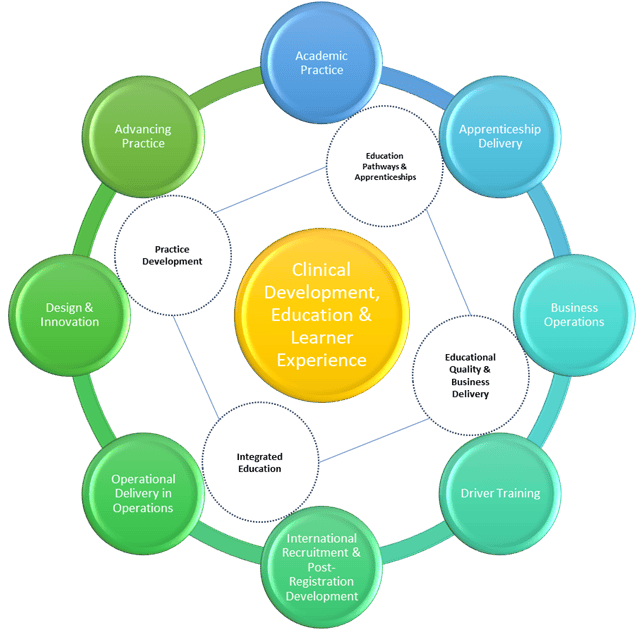
One of the key components making EEAST a great place to WORK, VOLUNTEER and LEARN is our ability to provide a breadth of career pathways and development opportunities for all our people.
During 2023/4, EEAST continued to be education partners with Anglia Ruskin University, University of Bedfordshire, University of East Anglia, University of Hertfordshire, and the University of Suffolk.
Our Practice Educators for our BSc (Hons) Paramedic Science programmes supported 500 placement learners and over 200,000 hours. We trained over 700 new Practice Educators to support our learners in practice.
We continued to work with the University of Cumbria to support the upskilling of current Emergency Medical Technicians to Paramedics through the Paramedic Degree Apprenticeship and so far, 81 have graduated from the 24-month programme.
Over the year EEAST increased degree apprenticeship spaces from 90 to 150 per year to allow more colleagues to progress their clinical careers. 327 learners have graduated from their Associate Ambulance Practitioner apprenticeship with our education partners at MediPro.
To allow EEAST to become more multidisciplinary in its skill mix, we launched an education programme for Pre-Hospital Nurse Practitioners.
We have trained 685 new clinical colleagues in the year and upskilled another 300 to a higher skill grade to better support our deployment model and clinical response priorities.
Across the region we delivered a programme of mandatory training including in resuscitation skills, moving and handling, and safeguarding training.
EEAST’s CPD catalogue delivered 358 courses during 2023/4 which 5,648 colleagues attended face to face training.
We supported over 600 colleagues to become trained in driving skills, including gaining a C1 driving license as well as emergency response driving capabilities.
We partnered:
- with the University of East Anglia for our new Advanced Clinical Practitioner Apprenticeship in Urgent Care which had 25 new Advanced Clinical Practitioners in training, supporting community management of patients, and a further 18 specialist paramedics upskilling their qualifications.
- for a new Advanced Clinical Practitioner Apprenticeship in Critical Care and enrolled 10 colleagues, which was run in partnership with East Anglian Air Ambulance and the University of East Anglia.
- with the University of Nottingham to upskill 20 advanced paramedics on prescribing programmes to upskill their capabilities further across both urgent and critical care teams.
Health and Wellbeing
Over the past few years, colleagues within EEAST and the rest of the NHS, have been faced with immense demands and emotional exhaustion caused initially by the pandemic.
As a result, it became more apparent that developing wellbeing capabilities at individual, manager, and leader levels, was an urgent and high priority, along with providing better support for colleagues dealing with mental health challenges.
It is essential for all EEAST colleagues to be able to manage their own wellbeing to function effectively, with mental health awareness essential for managers, supporting them to feel comfortable discussing mental health issues with their teams. To maximise wellbeing enhancing policies, procedures, and processes within EEAST’s cultural delivery, it was important that the leadership appreciated the business benefits of wellbeing.
We confirmed a non-executive board member who serves as a "Wellbeing Guardian" for EEAST to effectively address the wellbeing agenda across the organisation.
Key achievements included:
- Continuing to build our health and wellbeing team with an increased ability to concentrate on strategic, transformative wellbeing activities with a stronger emphasis on prevention. Occupational health management responsibilities were removed from the wellbeing team's portfolio.
- Launching our wellbeing network and monthly newsletter which was very well received.
- Agreeing to the blue light commitment for mental health at work.
Our activity during 2023/24 included:
- Following the purchase of welfare wagons, EEAST arranged for them to be kitted out with fridges and water units.
- Welfare wagon project meetings were arranged fortnightly with all stakeholders.
- A feedback form and interaction log for welfare wagons created (monitoring for KPI reporting). Stock check form created to monitor snacks and consumables. Planned servicing and MOTs for welfare wagons with fleet team ensured they were not off the road all at the same time.
- Arranged and held official launch of the welfare wagons early 2024.
- Mental health awareness courses, delivered by MIND, for both managers and wellbeing champions exceeded the target set and will continue to deliver into 2024/25.
- A suicide and prevention working group established with a refreshed new focus on mental health and suicide prevention which meets bi-monthly.
- A suicide prevention and postvention resource pack produced and added to East24. Support with postventions continued and increased during the year.
- On site crisis support arranged and delivered to stations for crews which are struggling with their mental health via The Ambulance Service Charity. (TASC).
- A mental health video was created in association with Magneto and colleagues from EEAST and a new mental health risk assessment was launched. A soft launch of the video was held at the People Services away day, in March with a full launch at the welfare wagon launch.
- Time for Me App, powered by Hapstar - the creation of a new app and platform that will assist all our people with keeping their mental health in check, with support and resources immediately available. Soft launch currently underway with our champions and looking to launch to the whole trust mid-May 2024.
- We tendered for a mental health first aid provider and successfully appointed Big Dog, Little Dog (BDLD) which received superb feedback.
- Expanded our Trauma Risk Management (TRiM) teams, including advanced TRiM practitioners with training procured and provided by March on Stress.
- Launched our refreshed wellbeing champions programme and integrated it across EEAST.
- All staff champion monthly check-ins established to support all staff champions.
- A new health and wellbeing service group created and continued to be held monthly.
- A process map was created for major incidents in relation to Wellbeing.
- A task and finish group which included the chair of the multi faith network and our Chaplain, was set up to develop a broad support group which recognised all faiths and beliefs to deliver in terms of an inclusive community and holistic approach.
- Menopause awareness sessions started, followed up by training for menopause mentors across EEAST.
- Electronic feedback forms created for all training that was delivered to ensure EEAST learns from feedback.
Our activity for the early part of 2024/25 includes:
- Self-harm/Suicidal ideation or intent Prevention Guidance for Managers has been drafted and will be published shortly.
- Aligning health and wellbeing with Time to Lead - mental health toolkit underway, including a wellbeing passport and a directory of service.
- A review of the TRiM form is underway with TRiM Practitioners and the communications team.
- A review of health and wellbeing by our Internal Auditors.
- Recruitment process for welfare wagon volunteers commences.
Our Volunteers
Volunteering at a glance during one month – April 2023
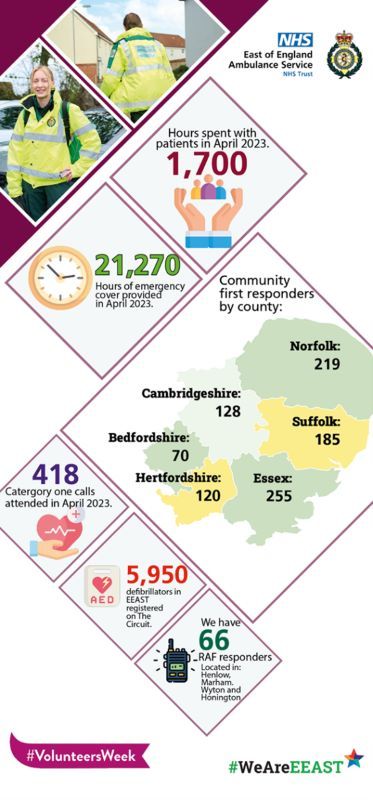
A new programme run by EEAST provided a direct route for volunteers to start a career with the ambulance service.
The ‘Volunteer to Career’ programme provided training for people to get the skills needed to begin full time roles at EEAST.
The course had its first success stories, with graduates Grant Harvey and Matt Sharp taking up new roles as emergency care assistants in Ipswich and Hellesdon respectively.
We are exceptionally proud of the commitment and professionalism shown by all our volunteers every year.
We have around 1000 active volunteers who supported our communities and patients last year. EEAST started to develop dedicated volunteer support for all volunteer roles within EEAST through the establishment of the volunteer hub, which included recruitment to new roles and increased our volunteer membership in all roles. During the year we continued to maintain the safety of our volunteers while responding to patients and engaging with the public in local communities.
Our volunteer workforce is extremely varied, and includes our community first responders, co-responders which are military and other blue light personnel, car drivers within our patient transport services, community engagement volunteers, chaplains and other faith representatives, general supporters, EEAST Heart volunteers for community education and wellbeing volunteers. We were supported by British Association for Immediate Care (BASIC) doctors and paramedics.
Community first responders are volunteers within our local communities attended a wide variety of calls on behalf of our ambulance services. Calls range from being the first ambulance service resource at a prehospital cardiac arrest to assisting with a care line call activation.
The graphic below shows the number of 999 calls allocated to community first responders for the year 2023-2024.
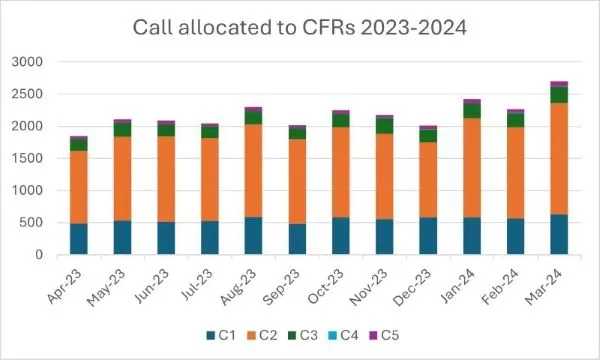
This commitment to their local community went beyond that of a community first responder, many volunteers supported local communities through community awareness sessions, and ongoing social support for the vulnerable within their local communities.
This is how calls are defined nationally:
- C1: immediate response to life threatening condition, such as cardiac or respiratory arrest
- C2: serious condition, such as stroke or chest pain, which may require rapid assessment and/or transport
- C3: urgent problem, such as an uncomplicated diabetic issue, which requires treatment and transport to an acute setting
- C4: non-urgent problem such as stable clinical cases, which requires transportation to a hospital ward or clinic
- C5: conditions identified as suitable for clinical triage which can be resolved, or sign posted to self care or another agency
EEAST Heart in partnership with the East of England Ambulance Service Charity delivered training sessions to the local communities in Basic life support and AED awareness. Over 4000 members of the public received training and new partnerships with community resilience teams will enable more communities to be reached.
EEAST continued to support and expand our falls community first responders enabling them through enhanced training, to attend non injured patients who required assistance in getting up from the floor. Teams were able to discharge the patient from scene with the support of the clinical advice line.
This enabled us to attend patients who had fallen, quicker, and made a difference to many patients experience and care over the course of the year.
Through charity funding in partnership with NHS Charities together we mobilised CFR cars around the Trust, these cars enabled volunteers to travel further distances to life threatening emergencies and patients who have fallen providing volunteer care to more communities, irrespective of socio-economic demographics.
EEAST undertook ongoing refresher training during the year to maintain volunteer skills and competence.
Our volunteer trainers had the opportunity to undertake the Award in Education and Training (AET) and the Certificate in Assessing Vocational Achievement (CAVA), to assist them with a recognised training and assessment qualification, along with offering invigilator training for them to assist with the assessments for the induction course.
These training courses not only value our volunteers in providing them with transferable skills, but also supports the capacity within the training team to deliver training and provides a standard for local training.
The volunteers are always very appreciative of the charitable donations we receive as an organisation from patients and the public to support care in the community, through the provision of community response, community education, and public access defibrillation.
Volunteer car drivers supported the Non-Emergency Patient Transport Services (NEPTS) operated within our PTS contracts. Their role is to support EEAST by taking patients to and from routine hospital appointments. In the coming year there are plans to increase recruitment for this opportunity and develop further volunteering roles within the NEPTS teams.
Welfare volunteers are currently being recruited, these will offer refreshments at hospitals to help improve staff morale.
The Trust is currently reviewing how we can support both integration through our staff networks, and developing volunteer roles that can support colleague wellbeing.
Volunteer Emergency Responder Scheme
Police officers and fire fighters joined a new volunteer emergency responder scheme in Bedfordshire and Hertfordshire, a partnership between EEAST and the Beds and Herts Emergency Critical Care Scheme (BHECCS).
The scheme was launched in February, with volunteers out on their first shift in March. Over the first weekend in operation, emergency responders volunteered a total of 99.5 hours. The emergency responders will be based at Hemel Hempstead ambulance station.
Indra, Community Engagement Group Volunteer:
"I am proud to be a volunteer at EEAST and have immensely enjoyed my role for the past six years. As a volunteer, I have felt respected, included, and fully supported to be creative and flexible in helping others when and where I can.
"As a bonus, I am given many opportunities to use my clinical knowledge and academic skills to support both learners and staff in their own developments which I see as a gateway to improving patient care. For me, volunteering at EEAST has been a highly rewarding and I have never looked back."
Ben, Community Engagement Group Volunteer:
"As a volunteer, I really enjoy working with other volunteers across the region, in partnership with the Trust, to continuously improve the services for our patients, whilst also ensuring staff and volunteer wellbeing is prioritised.
"For anyone looking to work or volunteer within the EEAST team, I would very much recommend it. In my case, I know if I need support in my role, I have many people to ask for this. I am proud to be a part of the EEAST team because every contribution from our volunteers make a huge difference to the work the EEAST does."
Community Engagement Group
The restructure of EEAST’s Community Engagement Group (CEG) was completed last year and the process was co-produced with CEG members. This led to a clearer structure and work plan for the group around both community engagement and strategic involvement within EEAST. The group’s action plan was entirely coproduced with its members, reflecting both EEAST priorities for public engagement and members interests and areas of expertise.
Following this restructure, the CEG recruited some new members.
Quality Account
Every NHS trust produces a quality account which reflects on the progress made during the previous year and identifies priorities for the coming year, around three themes, patient safety, clinical effectiveness and patient experience. Our priorities for 2023-24 continued to focus on the core priorities which match the mandatory indicators for ambulance trusts set by the Department of Health.
Our full version of the quality account can be found on our website: Annual Quality Account 2023-2024.
EEAST’s quality account is set against the framework of three overlapping key themes, patient safety, clinical effectiveness and patient experience, which define quality of care.
EEAST’s local priorities are detailed below
Patient Safety
- Continue to produce quality shared judgement reviews under the Learning from Deaths programme.
- Continue with embedding the Patient Safety Incident Response Framework into the organisation.
- To train all band 7 clinical managers in the organisation in the After Action Review process.
Clinical Effectiveness
- Reduction of on scene times for STEMI and stroke patients.
- Safe discharge of patients left on scene.
- To implement a new mandatory quality indicator and to establish a benchmark on which to build around falls in older people.

Patient Experience
- Continue to undertake an extensive patient survey programme to ensure that views are obtained from patients who have used different aspects of the service or are from seldom heard groups.
- Ensure patient engagement and feedback is part of EEAST’s ongoing strategy.
- Increase the representation dynamics within the Community Engagement Group.
Patient and Public Involvement
Co-production
During the last year, EEAST built on its co-production efforts around patient surveys by co-producing a short video to sit alongside the easy read survey. This was codesigned with the Norfolk and Norwich Send Association Disability Real Action Group of Norfolk (NANSA Dragons) and a young person provided the voice-over for the video, as part of this work. The video was available following the launch of the new EEAST website. This survey project highlighted the importance of co-production and working with ‘experts by experience’ as equal partners.
Throughout the year the Easy Read Survey was completed by patients who have used our service, and the results show that the majority of patients with communication and sensory needs are satisfied with the way that these needs have been met.
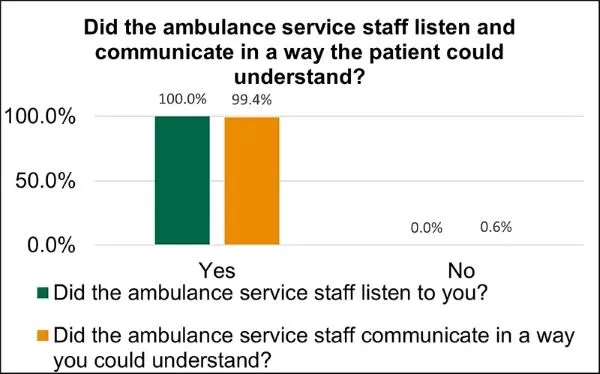
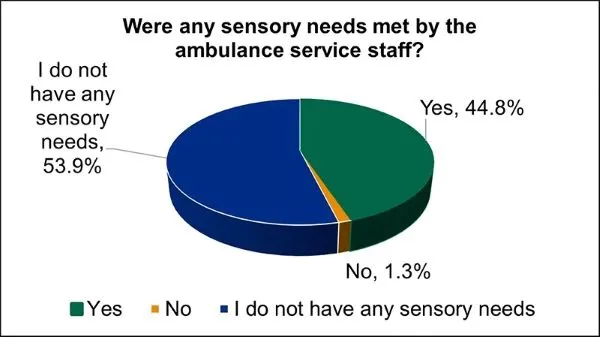
Finding new ways to gain and use feedback
EEAST made efforts to reach more of its patients by launching an SMS pilot for surveys for the Patient Transport Service. The launch for this resulted in significantly higher volumes of feedback received and an increase in compliments for all areas in the pilot.
EEAST continued to offer the young people’s mental health survey via Instagram, which was a popular way for young patients to provide us with feedback.
As a result of last year’s young people’s mental health survey, training around mental health was provided to call handlers. Following this, training patient satisfaction has increased with respondents describing colleague attitude as 7/10 on average.
It was notable that a higher percentage of respondents appeared to receive an emergency response, with 60% receiving an emergency response this year compared to 49% the previous year.
Links with Healthwatch and patient representative groups
Our patient and public involvement team and our Community Engagement Group members regularly attend a variety of meetings of patient representative groups including mental health groups, diabetes groups, young carers and Healthwatch.
EEAST continued to expand its representation with other organisations and specialist groups across the region. The Deputy CEO maintained regular contact with the Healthwatch groups across the region.
Engagement Activities
Face-to-Face engagement events provided an opportunity to meet with the public and gain feedback from people who may not usually have contacted EEAST. It gave an opportunity to provide education around first aid and CPR training, health promotion and what to expect when you call an ambulance.
This work included attendance at events, school visits and work with community groups and has been undertaken by the PPI team, frontline staff, and volunteers. The team received great feedback from these events, including a young person who put their first aid training into action whilst out shopping, just weeks after receiving the training.
Patient and Family Stories
EEAST’s discovery interviews with patients or their families supplemented our other feedback received by giving people the opportunity to share their story, in their own words. These are filmed and are shown at public board meetings and discussed by the board. We have used them this year to support learning from complaints and serious incidents and find that hearing directly from the patient was a powerful learning tool. This year we have completed discovery interviews on areas such as end of life, non-conveyance to hospital, a patients experience of being treated whilst under the influence of alcohol, and home birth.
The Trust has a comprehensive annual patient survey programme which included continuous surveys for the emergency service and patient transport service.
During 2023/24, planned survey projects related to: patient assessment and treatment within the home setting, no-sends, maternity care, safeguarding and mental health.
Feedback received was shared internally and externally, working with partner organisations and ‘experts by experience’ to improve the service experienced by patients, like the need for improved mental health provision, signposting, and support.
Feedback received generally remained positive, demonstrating the kindness, care, and professionalism of colleagues. Areas of dissatisfaction raised through survey feedback generally related to delays/non-attendance, attitude, clinical treatment and assessment.
The annual patient survey programme
| Overall, how was your experience of our service? | Percentage of ‘good’ and ‘very good’ responses |
|---|---|
| Emergency Services/Clinical Assessment Service | 88.8% |
| Patient Transport Service | 84.2% |
| All services | 86.0% |
Since April 2023, 2,078 patients responded to the overall satisfaction question included within the continuous emergency service and patient transport service surveys. Overall, 86.3% of these patients rated their experience as ‘good’ or ‘very good’.
Compliments, concerns and complaints
Compliments
During 2023/24, 3634 compliments were reported to EEAST, which equated to an average of 302 per month, a significant increase on the previous year’s average of 225 per month.
Compliments are reported to the trust board and the individual colleague and recorded on their personnel files.
EEAST started looking at themes arising from compliments to help learning. The common themes included kindness and compassion, calmness and reassurance, professionalism, good clinical assessment and treatment, which many compliments described as lifesaving.
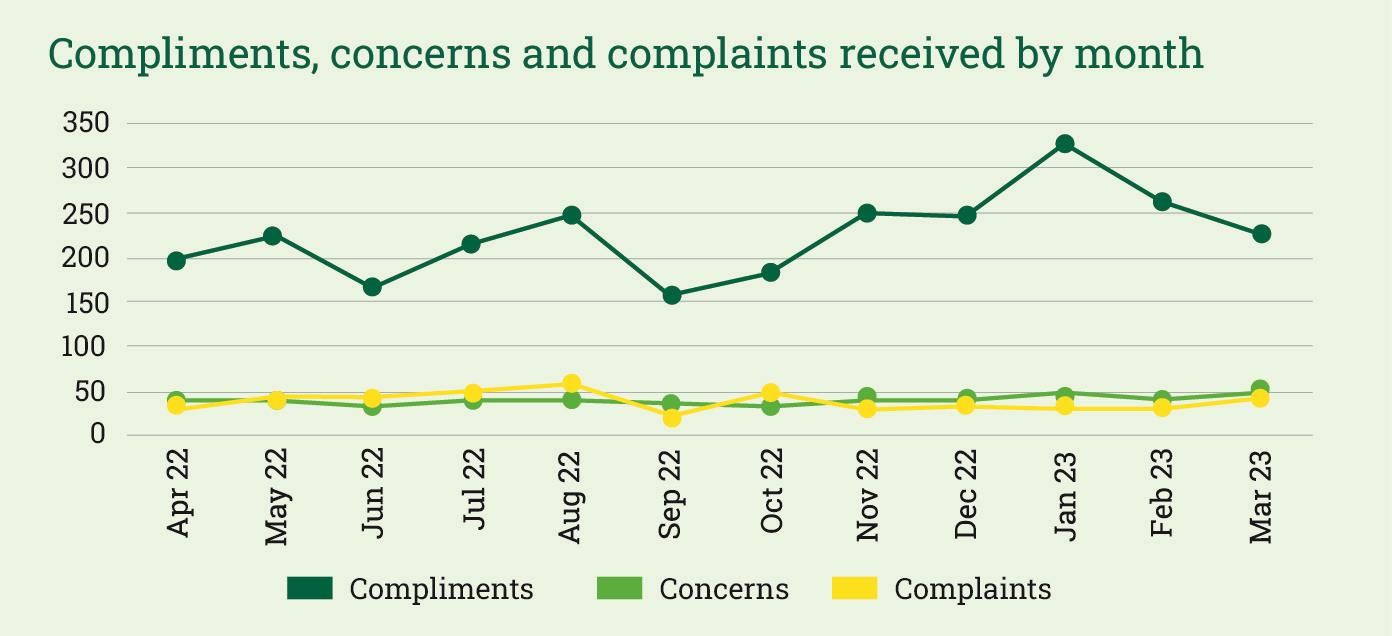
Feedback from our patients
“I just want to say a huge thank you to the crew who attended. Thanks to their excellent care, professionalism, and compassion I survived a major heart attack.”
“We would like to thank the dispatcher who spoke to my wife during my emergency. The dispatcher with whom she spoke was entirely professional and reassuring. Many thanks to all for an excellent service.”
“I would like to say a big thank you to the crew who attended one of the residents at the care home that I manage. They were so kind and caring and really put the patient at ease.”
“I want to thank you both for your sensitive, understanding, and excellent care when I was in such pain. I appreciate your care and assistance to manage the pain. You are excellent.”
“We owe our lives to the crew who attended to my husband. They were great and even looked after me. The crew was amazing, and I can’t thank them enough.”
Complaints and concerns
EEAST closely monitored the number and themes of complaints received and used this learning to support service improvement.
During 2023/24, 0.06% of our interactions with patients resulted in complaints and concerns. This was a reduction on 2022/2023, when 0.07% of our patient interactions resulted in complaints and concerns, and suggests an improvement in patient experience.
All complaints and concerns which cannot be resolved under our early resolution approach, received a local investigation and depending on the nature of the complaint or concern, was reviewed by the patient safety team. Complainants were supported through the process of raising a complaint and investigation by our patient experience coordinators, and upon receiving a written response, face-to-face meetings were arranged where complainants required further support.
The number of re-opened complaints remained low, meaning complainants were usually satisfied that our responses addressed their questions and concerns and where able resolved.
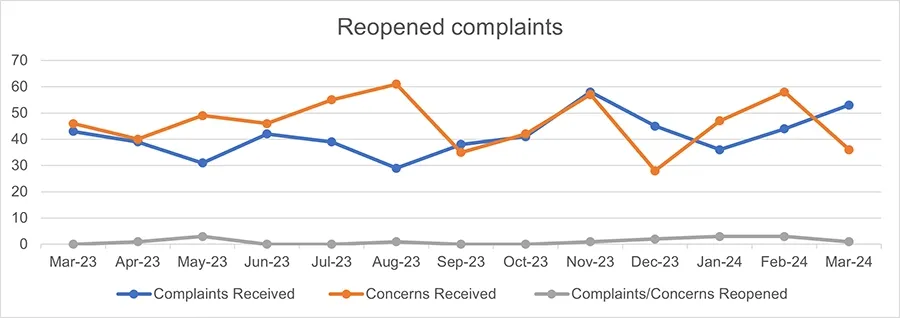
The main themes from complaints and concerns last year were:
- Delay - these mostly related to delays in the Patient Transport Service, with only 22% of delay complaints relating to Emergency Operations Centres and Emergency Services.
- Transport and Driving - which mostly related to the Patient Transport Service, which accounted for 93% of these.
- Clinical Assessment and Treatment - of which 89.5% were for Emergency Operations Centres and Emergency Services.
These themes reflected the improvements in emergency ambulance attendance times achieved via EEAST’s delay action plan. A significant number of the clinical assessment and treatment complaints related to either ‘no sends’ or ‘treatment at home’ under the same plan, suggesting that some patients did not feel confident that the alternative care pathways offered, were right for them. These complaint themes also reflected a challenging year for the patient transport service, with some of our services delivering journey volumes more than the contracted levels.
Patient Safety
Celebrating World Patient Safety Day 2023
World Patient Safety Day theme from the World Healthcare Organisation asked us to ‘elevate the voice of patients.’ The great news is that we have two of our own patients helping us do just that, in newly created volunteer roles as patient safety partners.
It was important that we listened to what our patients and families share with us about their experience of the care they receive as it allows us to learn and continue to improve our services.
The new roles were introduced as part of the new national Patient Safety Incident Response Framework (PSIRF), the NHSE initiative launched across the country in September 2023. PSIRF provides a framework for us to investigate and learn from serious incidents through open conversation with patients and their families, whilst offering support to our own colleagues who are involved, replacing the previous serious incident investigations.
Both of our new Patient Safety Partners have had experience as patients who were cared for by EEAST colleagues. They work with us and are the voice of patients and families in their communities. They help us to shape our services and be a ‘critical friend’ bringing patient and family experiences to us to understand the best ways to improve what we do.
Patient Safety
Patient safety is more than measuring how many incidents are reported, it included engaging with patients, carers, family members and professional colleagues to use their lived experience as an opportunity to learn and improve services. It was about encouraging colleagues to be honest and open, by providing a supportive environment where a just culture can thrive. Incident reporting remained high last year and continued to increase month on month, suggesting that EEAST had a good culture of reporting incidents. Reassuringly, most patient safety incidents reported resulted in no harm to the patient.
In October 2023 EEAST transitioned to the new Patient Safety Incident Response Framework (PSIRF) and no longer operated under the Serious Incident Framework.
Since adopting the new framework, EEAST refreshed its approach, emphasising a proactive approach to improving safety at a system level by completing in-depth reviews of incidents according to identified themes.
EEAST continued to review serious incidents (SI) declared until the end of September 2023 and identified learning from every review undertaken. Work towards delivering the national patient safety strategy continued, patients should expect a continually improved and safer service in future years.
Patient Safety Events
There was a significant decrease in patient safety events during 2023/24 compared with the previous year; the number of incidents reported remained within the normal range as seen for recent years.
This can be partly attributed to an improvement in system delays throughout the year following the implementation of EEAST’s delay action plan, as well as the proactive work undertaken between EEAST system partners across the organisation.
The Head of Patient Safety and the Patient Safety Specialists meet with our system partners at the urgent and emergency care forum monthly to extract system learning to further improve system delays. EEAST’s delay action plan was updated to incorporate the improvement workstreams ongoing in EEAST throughout 2024/25 period.
The key themes of serious incidents or those incidents that are noted as causing harm, rated as moderate or higher are as shown in the graphic below, with a comparison to the previous two years.
Table outlining moderate or higher harm PSIRF
| Moderate or higher harm PSIRF under | Apr 2023 – Sep 23 (SI’s) | 2022/23 | 2021/22 | |
|---|---|---|---|---|
| Delay | 24 | 36 | 214 | 114 |
| ECAT/EOC | 4 | 2 | 12 | 8 |
| Patient Injury | 1 | 7 | 3 | 8 |
| Clinical Treatment | 7 | 1 | 18 | 11 |
| Non-conveyance | 13 | 4 | 2 | 17 |
| Other | 0 | 4 | 10 | 3 |
| Missed Stemi | 1 | |||
| Patient injury PTS | 9 | |||
| Patient injury A&E ops | 1 |
Patient safety incident review actions
An action setting group was established in early 2023. This group enabled operational teams to meet with the central Patient Safety Team to develop and agree actions from patient safety events following the SMART process, in particular, they are achievable and realistic. This enabled the team to more easily:
- follow up actions,
- confirm completion,
- review the impact.
The NHS set key priorities for delivery within the national patient safety strategy.
Patient Safety Specialists
- EEAST has six Patient Safety Specialists (PSS), each of which is allocated to an Integrated Care Board area. The Patient Safety Specialists provides expertise and links with other providers within local systems supported by the Head of Patient Safety
Patient Safety Syllabus
- All EEAST colleagues were encouraged to complete level 1 and 2 training.
- All Patient Safety Specialists at EEAST were enrolled onto the mandated level 3 and 4 training.
Patient Safety Incident Response Framework (PSIRF)
- PSIRF was fully implemented from September 2023.
Duty of Candour (DOC)
All NHS trusts have a statutory duty to inform and involve patients and their families in investigations where there has been severe harm under Regulation 20 of the Health and Social Care Act. EEAST continued to perform well against this statutory requirement.
The decreased number of Duty of Candour cases last year, correlated with the decreased number of serious incidents and PSIR’s reported.
| 2023/24 | 2022/23 | 2021/22 | 2020/21 | 2019/20 | |
|---|---|---|---|---|---|
| Number of cases initially requiring Duty of Candour (DoC) | 111 | 272 | 161 | 40 | 55 |
| Duty of Candour discharged | 109 | 272 | 161 | 35 | 50 |
| Average timeframe for DOC to occur (working days) | 6 | 4.0 | 4.5 | 2.0 | 4.4 |
| Average timeframe for letter follow-up (working days) | 1.0 | 1.0 | 1.7 | 2.6 | 1.2 |
Infection prevention and control
EEAST put infection prevention and control at the heart of good clinical practice. Basic hygiene and cleanliness are fundamental to deliver safe and effective care for our patients and to maintain a safe working environment for our colleagues. To deliver this standard, we are committed to ensuring that appropriate resources are allocated for the effective protection of patients, their relatives, colleagues, and members of the public.
Over the year, emphasis was given to the prevention of healthcare associated infection, the sustained improvement of colleague practice and the cleanliness of our vehicles and stations. Infection prevention and control activity was integrated into the heart of EEAST’s work with effective collaboration amongst colleagues in operations, estates, make ready, training, health and safety, occupational health, and medicines management.
Infection prevention and control activity was intertwined into the daily business across EEAST and strived for innovative solutions to reduce the burden caused by infections. Our team has undertaken academic learning to bring greater expert knowledge and leadership into EEAST.
EEAST plans to develop the team over the coming year and build deeper relationships with key colleagues who can help support our Infection prevention and control practices into an even stronger position.
Measles Infection
We saw a national increase in measles cases across the country and in all localised cases EEAST was prepared with communications and staff vaccination. We continued to work closely with occupational health for colleague safety and preparedness. Further, with medicines management to ensure we are allocating antimicrobials adequately and maintaining a good antimicrobial stewardship programme.
COVID-19
At the beginning of the 2023/24 year, the NHS moved away from the mandated COVID-19 guidance elements and EEAST closed our COVID-19 Track & Trace Service.
We implemented the standard IP&C precautions outlined within the NHS manual and removed the need for elements such as distancing and mask wearing on premises. We have not forgotten about COVID-19 and now continue to use vital learning from the pandemic to quickly react to emerging situations.
We utilised an outbreak management protocol as standard across EEAST and this was particularly beneficial in our call centres over the winter period. Those environments have a lot of colleagues working shift so infectious outbreaks can have a devastating effect on staffing levels. Throughout the year we were able to quickly contain outbreaks of COVID-19, respiratory infections and gastro infections to protect colleagues and EEAST. This step up and down of enhanced IP&C precautions, mask wearing etc, was embedded into our usual business as needed.
Make Ready Service
Our Make Ready Service teams continued to expand during 2023/34 and all areas across EEAST have a team of make ready colleagues that prepare vehicles for operational use. This included ensuring the consumables and the equipment were clean, serviced and ready to use and maintained the daily and deep cleaning of vehicles as per the target.
Throughout the year the cleaning schedule was maintained above the requirement and even during times of extreme pressure over the winter period the compliance was well maintained. The compliance checks completed by local managers and the IPC consistently show that our vehicles were clean and safe for our patients.
The Infection Prevention Control Team provided assurance by conducting quality audits across EEAST and this consistently showed that figures being reported by local areas were accurate. The figures below show little variance when compared with the quality audits which was a great achievement to gain that continuity and be confident that they are a true representation of position.

The compliance against standards throughout the year showed that infection prevention control standards were continually met with most audits achieving above target.
The main area for improvement was the premises audits. There were some key actions that were taken to ensure that aspects such as housekeeping, and waste management were brought up to the aspirational target.
Compliance facilitators for all areas were identified and trained to enable them to be in place from the start of the new financial year. This role was integral to close the small gaps and maintain higher compliance on premises. The make ready teams are taking a more active role with certain areas of the premises following our introduction of make ready infection prevention and control champions. Infection prevention and control and estates colleagues are working closely together to bring the remaining parts of the cleaning standards on stations up to the aspirational level. Overall, the premises standards are good.
EEAST introduced a new clinical waste stream to align to waste standards which actually drove down costs and was better for the environment. This will continue to be a key focus for the coming year.
We embedded further observational audits of colleagues and work closely with local management teams to ensure that infection prevention and control practices are followed perfectly to protect colleagues and patients.
During the year one of our objectives was to increase compliance with the national bare below the elbow requirement. This was very successful, and EEAST went from around 50-60% compliant each month to over 90% compliant toward the end of the 2023/24 period.
Health and Safety
During the past year, the Health Safety and Security Team undertook a series of engagement events across the region meeting with many of our frontline and patient transport colleagues to listen to concerns as well as provide assurance.
The team’s programme of assurance visits to all sites across EEAST continued. The visits combined an inspection of the sites, in line the Health and Safety at Work Act 1974, and all sites were inspected within the year with feedback and support to local managers as well as liaison with estates teams.
The Team worked hard to ensure EEAST risk assessments were suitable and sufficient meaning all are being reviewed, rewritten, and published on the EEAST Trust Intranet (East24).
At year end we had 44 published visible for all colleagues, as well as several templates available for use.
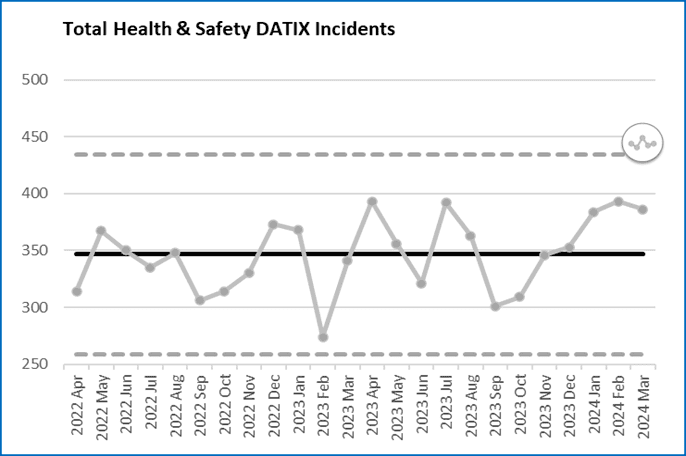
During 2023/2024, There was 4,297 incidents reported as Health & Safety related.
Each of these incidents were closely monitored to identify themes and root causes and working alongside other departments to ensure a proactive and integrated approach to Health, Safety & Security Management of incidents was embedded into EEAST.
One hundred and twenty four of these incidents were reported to the Health & Safety Executive under the Reporting of Injuries, Diseases and Dangerous Occurrence Regulations. This was a reduction in the previous five years of data.
The number of incidents related to verbal and physical assaults nationally and as reported by EEAST colleagues in recent years had increased.
The utilisation of body worn cameras daily increased as well as the number of evidential activations saved for Police prosecutions.
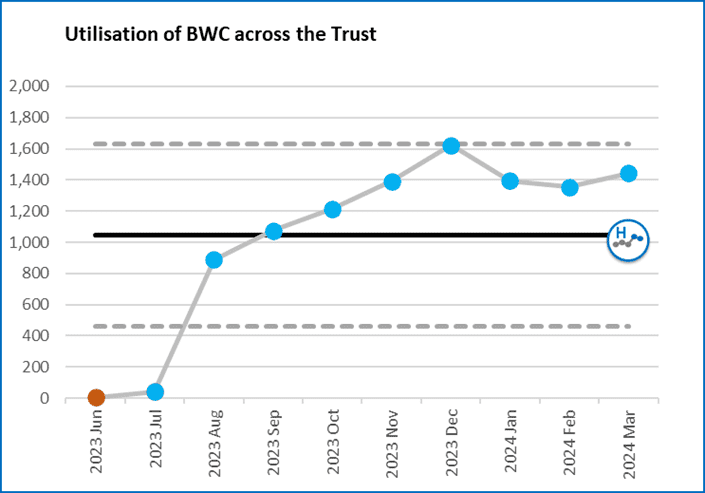
We are aware one of the police forces in the east of England, put forward a recent attempted assault on an ambulance crew to the Crown Prosecution Service based on body worn camera footage. The footage “provided over-whelming evidence”, the investigating police force commented.
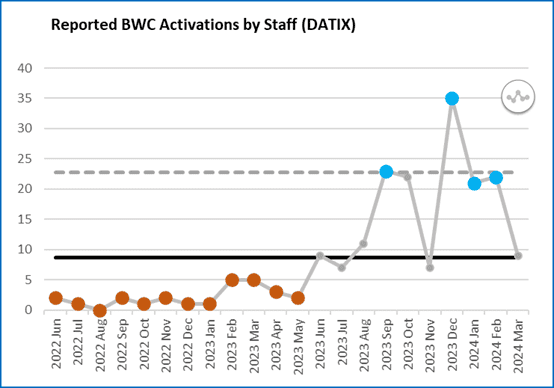
Safeguarding
To celebrate National Safeguarding Awareness Week, the EEAST safeguarding team was out on the road, explaining more about the work they do and why we all have a part to play.
The team participated in the National Safeguarding Awareness Week during November 2023, utilising EEAST welfare wagons to raise its profile. This included 15 hospital visits across the region, EOC visits and the production of five Need to Know articles with a different safeguarding focus each day.
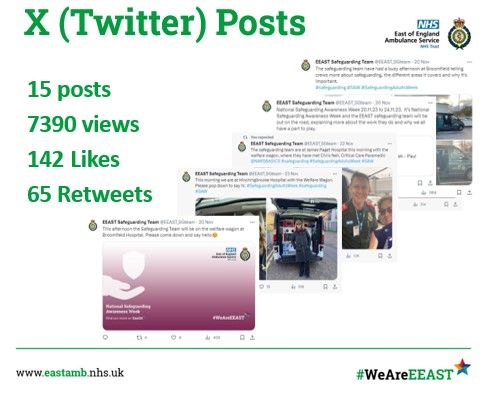
Safeguarding
During 2023/24, EEAST remodelled the way of working and enhanced its multi-disciplinary focus by ensuring that the safeguarding team had representation from paramedic, social work and criminal justice backgrounds. This enabled a robust multi-dimensional approach when producing and delivering our training materials, considering learning to be taken from case reviews and enquiries, provision of guidance and support to colleagues alongside reviews of policies and procedures.
This multi-disciplinary approach allowed further alignment to our sector based working model enhancing the visibility of the team, attendance at operational delivery groups and closer interactions with sector colleagues and management. Our Facilitators are well skilled to provide comprehensive feedback to our colleagues when it is received from external parties like local authorities.
Learning and Development
EEAST achieved or exceeded our training target compliance for safeguarding level 1, level 2 and basic prevention awareness training (BPAT). The Workshop to Raise Awareness of Prevent (WRAP) was at 89%.
During 2023/24 we delivered weekly virtual level 3 training sessions for registrants. The target timeframe for achieving 90% compliance has been extended until July 2024. Level 3 compliance had increased to 66%, this was an increase from 34% during 2022-2023.
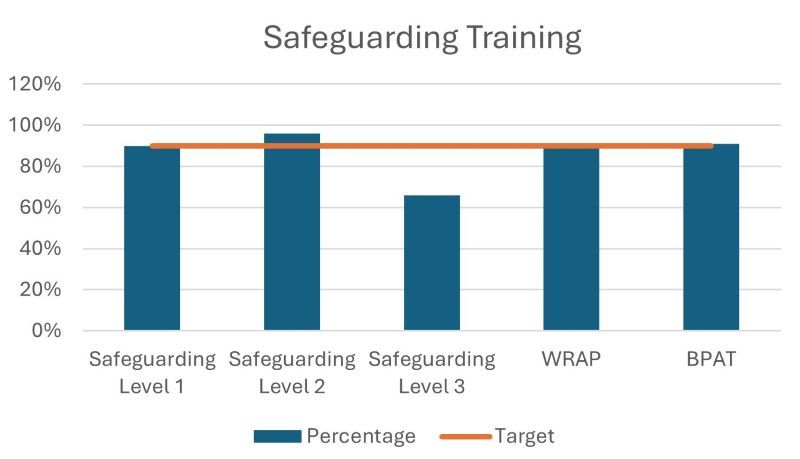
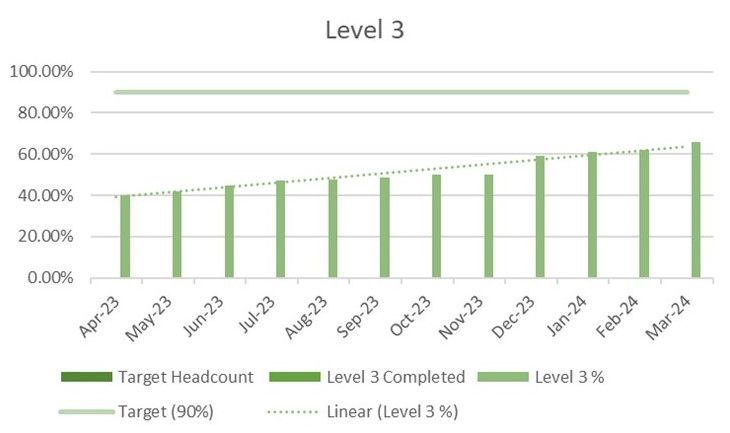
Quality Improvement
The safeguarding team was proactive in embracing quality improvement methodologies within its day-to-day business. The workplan included an audit cycle for initial and follow-up audits to ensure that our training reflects identified learning and findings supporting further enhancements and a continuous review cycle.
Audits undertaken throughout the year included:
-
A random sample of 300 Mental Capacity Assessments identifying that there was high compliance with Yes/No questions but more limited compliance in relation to supplementary comments documenting the process undertaken to inform the decision regarding the patient’s capacity to consent.
-
A fourth Patient Experience Safeguarding Survey focussed on those where a safeguarding referral had been initiated by EEAST. The survey demonstrated a continued high level of satisfaction with the service 95.9%.
-
Safeguarding Referral Audit reviewing random sample of social care and safeguarding referrals for children and adults resulting in four recommendations:
- The audit should be completed annually to ensure that EEAST can continue to receive assurance about the quality of the external referrals that it produces.
- Alternative referral making models should be explored including the possibility of crews making referrals electronically through ePCR.
- The safeguarding team will continue to seek local authority feedback in relation to the 64 cases so that analysis can be completed, and any addition learning and recommendations can be identified.
- The learning from the review should be incorporated into future training delivered to EEAST staff, including utilising information from EPCR’s within their safeguarding referrals.
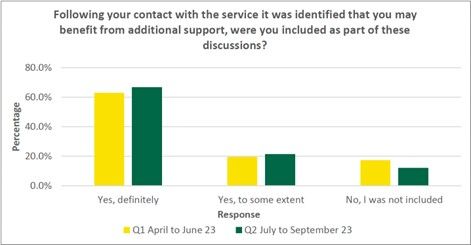
Urgent and Emergency Services
EEAST provided urgent and emergency care (UEC) ambulance services 24 hours a day, every day of the year for patients with illnesses and conditions that are immediately life threatening through to minor injuries.
Our Emergency Operations Centres (EOC) based in Bedford, Chelmsford, and Norwich are the first point of contact for all 999 calls and requests for emergency and urgent care. Our teams work across the three core areas of call handling, dispatch and clinical assessment to provide the best possible care to our patients.
Emergency calls are connected to our team of dedicated and highly skilled call handlers by the BT Operator. Call handlers are the first point of contact and often a first link in the chain of survival. They are responsible for carrying out initial triage, assessment and recording all appropriate information onto our computerised systems. Dispatch teams are responsible for overseeing a specific geographical area and co-ordinating all available emergency resources which includes community first responders, ambulance, rapid response vehicles, critical care teams and helicopters to ensure they are deployed to emergency calls in a timely manner.
To ensure that our sickest patients get the fastest response 999 calls are triaged into one of four responding priorities:
- Category 1 – Immediately Life Threatening
- Category 2 – Emergency
- Category 3 – Urgent
- Category 4 – Less Urgent
Not every call requires an emergency ambulance response. To ensure we are able to respond to our sickest patients as quickly as possible, we have a team of clinicians based within the EOC. Our telephone clinical assessment service supports patients who do not need an ambulance and our team of clinicians undertake our ‘hear and treat’ process organising alternative care, or referrals to a GP, pharmacist, or walk-in centre. Our clinicians ensure patients can access the most appropriate healthcare for their needs and ensures patient safety is maintained within the Emergency Operations Centre.
These functions relate to three of the organisations five critical functions.
EEAST works closely with local system partners, NHS services and colleagues across Fire, Police, Coastguard and British Transport Police under the Civil Contingencies Act to keep our communities safe and respond to civil emergencies as required.
Within the EOC we use enhanced and sophisticated telephony technology which ensures 999 emergency calls are presented to the next available call handler across our EOC. We have built in resilience and flexibility which ensures that if the call handlers in one centre are already on 999 calls, the next incoming call will automatically divert to the next available call handler in another one of our centres. This level of automation is then expanded nationally to allow alternative ambulance services to answer our calls and vice versa when there are extreme amounts of calls to ambulance services across England.
This practice ensures a robust approach to 999 call management and helps to reduce patient safety incidents, risk, and delays.
Demand on the ambulance service grows year-on-year which means the volume of 999 calls handled by our EOC teams increases. Across the year we have seen periods of challenge and pressure which is further impacted by seasonal variations, time of year, weekends, and bank holidays when access to NHS primary care services is often limited. Significant events across the region like music concerts, a football match, or an outbreak of a healthcare condition such as Flu can also increase call demand.
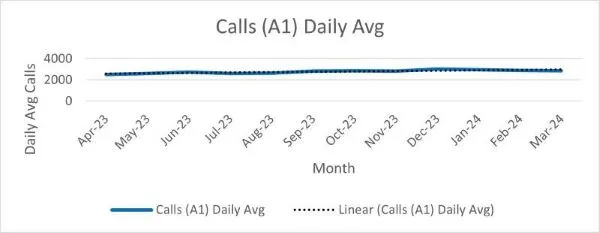
The graphic above shows the demand and call volume changes across the year.
Ambulance services across England are measured and report against 11 Ambulance Quality Indicators (AQIs), which allow our performance to be compared with that of other services across the country. The indicators are split into ambulance systems and clinical outcomes.
Ambulance system indicators consider the way in which we answer and manage responses to all emergency calls coming into EEAST, whilst clinical outcome indicators consider the care that we deliver to some of the most seriously unwell patients that we attend.
Whilst response times are still an important part of the AQIs and the current target of responding to Category 1 life threatening calls within a mean average time of 7 minutes and at least nine out of 10 times within 15 minutes, EEAST welcomes a focus on clinical outcomes for our patients
The table below provides further detail on each of the main responding categories along with the national standard and our performance over the year 2023-24.
| Category | Response | Target Average Response Time | EEAST Response Time 2023-24 |
|---|---|---|---|
| 1 Life Threatening | An immediate response to life threatening condition, such as cardiac or respiratory arrest | 7 minutes | 9 minutes 3 seconds |
| 2 Emergency | A serious condition, such as stroke or chest pain, which may require rapid assessment and/or transport | 18 minutes | 43 minutes 51 seconds |
| 3 Urgent | An urgent problem, such as an uncomplicated diabetic issue, which requires treatment and transport to an acute setting | 2 hours | 5 hours 3 minutes |
| 4 Less Urgent | A non-urgent problem such as stable clinical cases, which requires transportation to a hospital ward or clinic | 3 hours | 8 hours 49 minutes |
AQI data shows that we responded to our sickest patients (Category 1) in an average of 9 minutes and 3 seconds, and to 9 out of 10 in 17 minutes and 4 seconds. This is outside of the national standard, but it should be noted this is an improvement on the same reporting period in the previous year.
EEAST provide urgent and emergency care services for a population of more than 6.3 million people across an area of around 7,500 square miles. The East of England has some of the most rural areas in England mixed in with highly populated urban areas and beautiful coastline holiday destinations which increases the population by many thousands with tourists and holiday makers visiting our region not just during the summer months but across the whole year. As a result of the increased visitors, the road network can become challenged at some points throughout the year. EEAST must utilise its resources wisely and it is not always possible to reach some destinations as quickly as we would like. That is why the EOC have experienced clinicians to thoroughly assess patients, to ensure the right level of care to patients by the right service. Sometimes, this means that patients will be passed onto the local unscheduled care services which have access to a wider choice of services to meet patient needs. Sometimes it means that one of the dedicated Community First Responders living locally will attend to the patient first and sometimes it may be a paramedic on a bicycle or in rapid response vehicle. The EOC play a fundamental part in ensuring the safety of patients through numerous processes to ensure the right care is delivered. All life-threatening emergency calls are responded to immediately, even whilst the call is still in progress our dedicated team will be organising help for the patient to maximise the chain of survival and enhance outcomes.
Clinical Assessment Service
Our telephone Clinical Assessment Service supports patients who do not need an ambulance response following their call. Our team of EOC clinicians undertake the ‘hear and treat’ process providing support and advice, organising alternative care, or referrals to a GP, pharmacist, or walk-in centre.
Our Clinicians ensure patients can access the most appropriate healthcare for their needs. This also ensures that our resources remain available to respond to our sickest patients and those in need who may be experiencing a life-threatening emergency. On average around 10% of emergency calls can be safely managed by our ‘hear and treat’ EOC clinicians.
During 2023-24 our EOC Clinicians supported around 9.6% (83,038) of patients through the hear and treat process ensuring an appropriate and alternative care pathway.
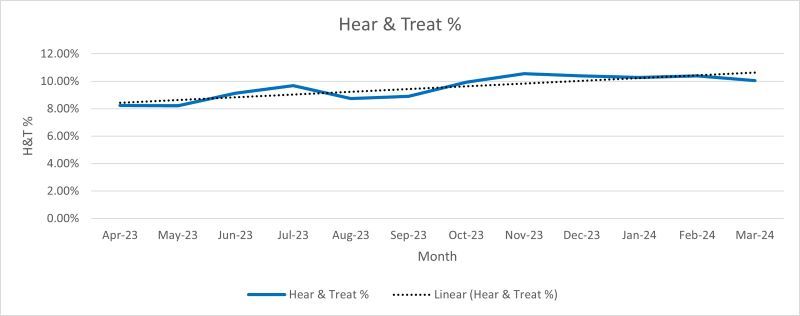
The graphic above shows Hear and Treat rate across 2023-24 period
Due to the continuing success with partnership collaboration with unscheduled care services our EOC clinicians do not always close calls after their clinical assessment has been completed. A number of our calls are assessed by the local unscheduled care provider which can deliver care closer to home and has access to a higher level of patient information. Calls passed to unscheduled care providers include calls where an emergency ambulance response is not required.
Whilst this ongoing collaboration enhances patient care and outcomes and ensures our resources are kept available for our sickest patients it has created a downward trend for patients being clinically assessed within EEAST. This is because these patients are clinically assessed outside of our hear and treat process by their local service.
We are seeing an increase in access to local services regularly going live and it is anticipated that hours of operation will also improve over time.
999 Call Answering
Ambulance services across England are measured on 999 emergency call answer time. The national standard is to answer 999 emergency calls within 5 seconds, with 9 out of 10 calls being answered within this time frame.
This standard ensures that calls for our most unwell patients, such as those in cardiac arrest or with a life-threatening emergency, are answered as quickly as possible and that help is organised as soon as possible. We recognise that in a time critical life-threatening emergency every second makes a difference, and our team are often the first link in the chain of survival.
The table below shows the increased pressures our EOC teams were under across the year with high call demand making the call answer standard challenging at times.
However, we can also see great improvements in call answering over the last year. This has been due to modernising the telephony systems, resilience and infrastructure, processes, recruiting to additional levels of call handling staff and sharing call handling best practice with our teams.
| Mean Call Pickup (seconds) average | Call Pickup 90th percentile (seconds) 9 out of 10 times | |
|---|---|---|
| April 2023 | 2 | 0 |
| May 2023 | 4 | 0 |
| June 2023 | 8 | 20 |
| July 2023 | 5 | 0 |
| August 2023 | 7 | 18 |
| September 2023 | 10 | 37 |
| October 2023 | 11 | 38 |
| November 2023 | 9 | 28 |
| December 2023 | 9 | 27 |
| January 2024 | 6 | 16 |
| February 2024 | 10 | 38 |
| March 2024 | 7 | 18 |
The above table shows mean call answer times across 2023-24 period.
Single Point of Contact (SPOC)
The SPOC was established to ensure our operational colleagues are able to provide the best possible support to patients to access the right care to meet their needs by making referrals to alternative care pathways.
Referral pathways include safeguarding concerns, social care, GP support and notifications, falls and diabetic hypo education referrals, safe and well referrals, admission avoidance across West Hertfordshire, as well as supporting colleagues with incident reporting such as Datix.
The SPOC is staffed 24/7 by dedicated specialist call handlers who provide advice, support, and guidance to colleagues across EEAST. There is a dedicated telephone number for the SPOC team which ensures our operational colleagues can contact the service whenever they need to.
The table below shows the types of referrals made and the number of each within each type.
| Type of Referral | Total number of patients referred | Percentage of patients referred |
|---|---|---|
| Social Care | 32,275 | 24.9% |
| Falls Service | 20,930 | 16.1% |
| GP | 67,015 | 51.7% |
| Hertfordshire Admission Avoidance Response Car | 2,133 | 1.6% |
| Diabetic Hypo | 1,135 | 0.9% |
| Safe and Well | 2,459 | 1.9% |
| Datix (Telephone) | 3,618 | 2.8% |
Hospital Handover
An important part of planning aims to reduce the time it takes for an ambulance crew to hand over the patient to the care of the hospital. Any delay in this process can have an impact on the patient and increases the time before the crew can respond to another emergency. This can also impact on the demands on our 999 call handling capacity, as patients try to call for an estimated timeframe for an ambulance.
Most ambulance services experience a loss of their emergency capacity because of delays in handing patients over to hospitals and this creates a delay in responding to other emergencies. As a result, we continue to work with regulators, commissioners, and hospitals to understand the delays, so that our patients in the community are waiting less time for an ambulance. An example of this is a handover escalation protocol which helps all organisations rapidly identify cases of concern and work together to accelerate care and reduce delays.
EEAST implemented and developed several contingency measures to support the ongoing delivery of services. This included recruiting more colleagues, greater collaboration with partners, and introducing other ways to help patients, including assistance by telephone. These initiatives provide additional resources enabling EEAST to respond to 999 calls during the peak pressure periods.
- We continued to invest in increasing call handling capacity to support resilience, enabling a reduction in waiting times for calls to be answered during the peak demand periods.
- To support admissions avoidance, not taking patients to emergency departments, we utilised a clinical assessment process to transfer patients to other appropriate services such as 111, while maintaining patient safety and appropriate use of services.
- We worked with other care providers across the region to establish referral pathways for urgent community response, for example falls services and mental health responses.
- The make ready teams enable our ambulances to be ready between shifts as quickly as possible. Make ready ensures that all ambulances are fully serviced maintained and kitted out with all the required equipment and medical devices and are infection prevention control compliant, prior to the crew starting shift.
Emergency Preparedness, Resilience and Response
Our resilience and specialist operations teams were involved in both responding to, and helping EEAST to prepare if, any untoward, adverse or major incidents, or terrorist attacks were to occur. The team engaged during the year with the six Local Resilience Forms across the east of England as well as with numerous Safety Advisory Groups which operate across the region.
During last year resilience managers attended just under 1,000 Local Resilience Forum meetings with partner agencies, while also attending just over 800 Safety Advisory Group (SAG) meetings to support events.
The number of meetings and the time these meetings are taking is increasing year on year as SAG chairs start to consider the learning coming from the Manchester Arena Inquiry and the engagement which is expected to come from the Protect Duty.
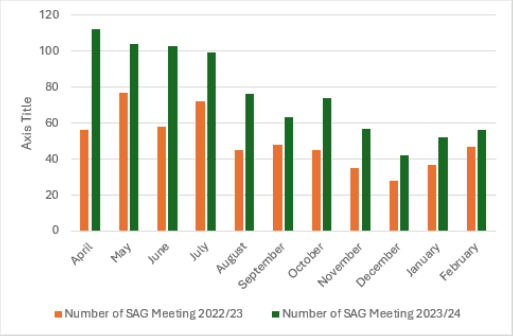
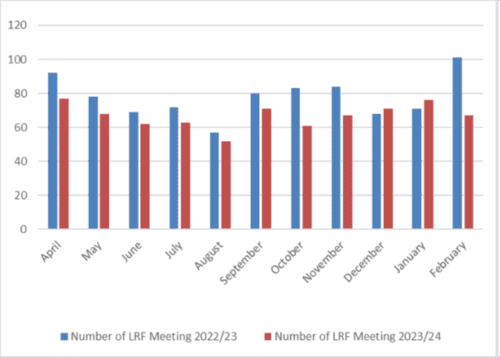
Hazardous Area Response Team (HART)
Hazardous Area Response Teams (HART) respond to patients requiring medical care in any hazardous environment, including at height, in confined spaces and in and around water. The team also support ambulance crews responding to patients who are not necessarily in a hazardous area but who are hard-to-reach or where multiple clinicians are required.
HART colleagues supported partner agencies at several large-scale incidents, be these individuals protesting and bringing roadways to a stop or putting themselves into a dangerous position. As well as supporting incidents where dangerous chemicals had been found during police investigations and accidents which had led to patients finding themselves in hazardous environments.
During two of the police investigations the team attended, it was necessary for the colleagues to stay on scene for multiple days, wearing chemical protective suits to be ready to respond to any adverse incidents involving the responders. The team’s presence not only ensured immediate medical mitigation was in place but also prevented the need for an ambulance to be tied up at the incident.
There is a requirement under both the Civil Contingencies Act and the NHS Core Standards to ensure all EEAST Commanders are suitably trained and that they maintain their Command qualifications.
Our Resilience Team continued to run the Foundation Command Training Course for managers taking a command function at a critical or major incident. This training was in addition to the major incident training which was delivered to all new students who joined EEAST, ensuring they can effectively respond to these significant incidents. Those commanders who are not trained or whose training has expired are being stood down, as a commander, until they have requalified in their command role.
To allow our commanders to put this command training in to practice we ran multiagency exercises bringing partners from police, fire, health and other agencies together to respond to a potential marauding terrorist attack occurring in a hospital. During the 14 exercises, which ran during September and October 2023, just under 950 responders improved their clinical and command skills and another 400 gained a better understanding of how an incident of this nature would be managed and care delivered to those in need.
These exercises generated 85 learning points, shared between ambulance, police and fire services. Those learning points which are specific to EEAST are being reviewed and an implementation plan developed to ensure the Trust learns from the exercises and continues to ensure the Trust can quickly and efficiently respond to an incident of this nature.
We have been using the Airbox situational awareness software for the last six years and, following a grant from NHS Digital, the department has now rolled out Airbox to all levels of commander within EEAST. This software has allowed live time mapping, imagery and timelines to be shared between commanders irrespective of where they are operating, giving them real time information. This brings huge benefits to EEAST and commanders during large scale protests, incidents and VIP visits all of which have occurred during the year. Part of the team’s role is to ensure EEAST, as well as individual directorates, are prepared for an incident which affects their operational productivity.
Business continuity remains an extremely important part of EEAST’s day-to-day business. The Business Continuity Team continued to grow and develop this capability across all parts of EEAST and has worked to ensure the Trust is able to continue working even when key parts of the organisation stop working effectively.
This business continuity planning proved hugely beneficial during the year with, for example, ambulance stations having to be temporarily closed and people moved to operate from other locations due to flooding and adverse incidents; other business continuity incidents included challenges to the Airwave Radio system and IT problems within the control rooms.
Each year English NHS trusts complete a statutory annual self-assessment and review of compliance against the NHS Emergency Preparedness, Resilience and Response Framework, in line with the Civil Contingencies Act 2004.
We maintained our overall compliance as SUBSTANTIAL and compliance with interoperable capabilities was also rated as SUBSTANTIAL. To ensure continual development and following external audit, the department maintains and manages an action plan to ensure the Trust develops and can deliver a high-level service.
Listening to the patient voice is crucial to highlight areas of excellence but also to improve the services provided. EEAST’s patient survey programme included continuous surveys for the Patient Transport Service (PTS), with survey signposting undertaken via patient information cards, social media, and invitation to feedback letters. A four-month SMS survey pilot was rolled out for patients who used the PTS within the Cambridgeshire and Peterborough area. Following review, the SMS survey was rolled out to the remaining PTS contract areas. All surveys will continue to remain available in alternative formats, including an EasyRead option.
EEAST officially opened its new patient transport service base in Dunstable. The new site on London Road, which has been in use since October, was welcomed by Tom Abell, Chief Executive and local MP, Andrew Selous in an event in February. They were joined by Mrunal Sisodia OBE, Trust Chair and Felicity Cox, Chief Executive of Bedfordshire, Luton and Milton Keynes Integrated Care Board.
Non-Emergency Patient Transport Services
Listening to the patient voice is crucial to highlight areas of excellence but also to improve the services provided.
EEAST's patient survey programme included continuous surveys for the Patient Transport Service (PTS), with survey signposting undertaken via patient information cards, social media, and invitation to feedback letters.
A four month SMS survey pilot was rolled out for patients who used the PTS within the Cambridgeshire and Peterborough area. Following the review, the SMS survey was rolled out the remaining PTS contract areas. All surveys will continue to remain available in alternative formats, including an EasyRead option.
EEAST officially opened its new patient transport service base in Dunstable.
The new site on London Road, which has been in use since October, was welcomed by Tom Abell, Chief Executive and local MP, Andrew Selous in an event in February. They were joined by Mrunal Sisodia OBE, Trust Chair and Felicity Cox, Chief Executive of Bedfordshire, Luton and Milton Keynes Integrated Care Board.
During 2023/24 EEAST provided non-emergency patient transport services (NEPTS) for patients needing non-emergency transport to and from hospital, treatment centres and other similar facilities within Cambridgeshire, parts of Essex, Bedfordshire and Hertfordshire.
During 2023/24 we undertook 437, 647 patient journeys and 41,728 escort journeys – a total of 479, 375 NEPTS journeys.
In the pursuit of delivering exceptional healthcare services, EEAST remained committed to continuously enhancing patient transport services. Over the past year, we have embarked on a journey of innovation and improvement, driven by our unwavering dedication to ensure the seamless transportation of patients to and from medical facilities.
We remain steadfast in our dedication to continually enhancing patient transport services, ensuring that every patient receives the care and attention they deserve from the moment they embark on their journey with us.
Procurement of Wheelchair Accessible Vehicles (WAVS) to Meet Rising Travel Needs.
As the demand for patient transport services continued to grow, particularly considering evolving healthcare needs, we recognised the importance of equipping our fleet with suitable vehicles. To address this, we secured several wheelchair accessible vehicles to cater to the increasing procurement travel requirements. These WAVS not only enhanced accessibility but also signify our commitment to ensuring that every patient receives transportation that is tailored to their specific needs.
Securing Authorisation for Cleric Upgrade
One of the noteworthy achievements of the year has been the successful authorisation and finalisation of the Cleric system upgrade, scheduled to be rolled out in May 2024.
This upgrade marks a significant milestone in our efforts to modernise and optimise patient transport services. The Cleric upgrade promises enhanced efficiency, improved coordination, and streamlined communication, all of which are essential for delivering prompt and reliable transportation solutions to our patients.
Negotiating Contract Variations and Extensions
In a dynamic healthcare landscape, flexibility and adaptability are paramount. Throughout the year, EEAST negotiated contract variations and extensions with our commissioners. These negotiations were essential in ensuring that our services remained responsive to the evolving needs of our patients while upholding the highest standards of quality and reliability. The successful outcomes of these negotiations demonstrated our proactive approach to service optimisation and resource management.
Relocation of Control Rooms for Improved Efficiency
Recognising the importance of operational efficiency in delivering timely and effective patient transport services, we undertook the relocation of control rooms. This strategic initiative aimed to centralise and optimise control room operations, resulting in improved coordination, faster response times, and enhanced overall efficiency. By relocating control rooms, we have further strengthened our capacity to deliver seamless transportation solutions that prioritise patient welfare and satisfaction.
Our Partnerships
We understand the importance of EEAST working collaboratively across our region to deliver quality patient care. Consequently, over the past year we have worked very closely with local acute, primary and secondary care services, community health, mental health and social care partners and with the voluntary sector.
Integrated Care System (ICS) is a partnership of organisations that come together to plan and deliver joined up health and care services, and to improve the lives of people who live and work in their area. The graphic below shows the east of England ICS.
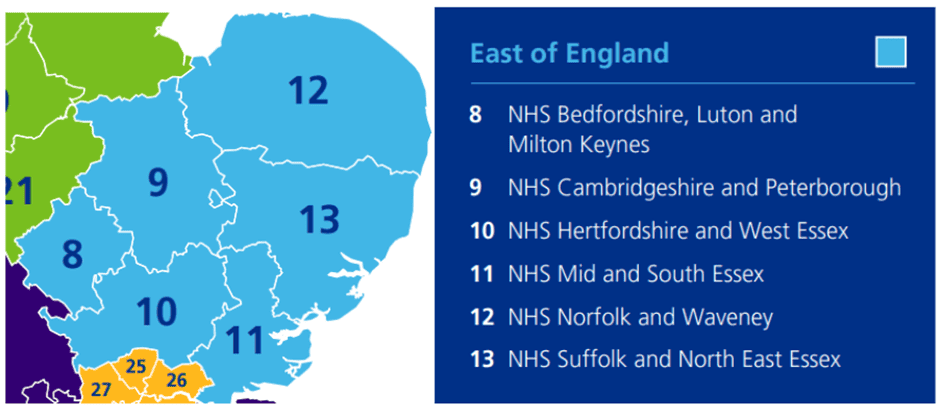
Integrated Care Board (ICB) is a statutory NHS organisation which is responsible for developing a plan for meeting the health needs of the population, managing the NHS budget and arranging for the provision of health services in a geographical area.
How we work with the ICBs
As a regional provider, EEAST works with Suffolk & North East Essex ICB (SNEE) as the nominated Lead Commissioner on behalf of all ICBs within the counties of Bedfordshire, Hertfordshire, Essex, Norfolk, Suffolk and Cambridgeshire by means of a Consortium Agreement. Suffolk and North East Essex ICB will lead regional discussions on behalf of the ICBs. We also work with each ICB on a local level, supporting local initiatives and interventions.
Business and Partnership Leads
Part of the Integration Directorate, the team lead the engagement and commissioning interface between EEAST and system partners including contract performance, financial performance, negotiation and monitoring. The team has participated and lead on EEAST’s response to tenders and service developments, ensuring operational, financial and corporate agreement is achieved.
Integrated Neighbourhood Teams
EEAST is an active member of the Mid and South Essex Integrated Neighbourhoods. An Integrated Neighbourhood is a collaboration and a way of existing teams working together in a coordinated and purposeful way. These are networks of multi-agency professionals, volunteers and communities who are all serving their local population in the place where they usually live. EEAST is a member of this collaboration and has worked with system colleagues to address the needs of frequent service users.
Rapid Intervention Service
This scheme involves an Advanced Paramedic working with GP localities in three primary care network areas in West Essex to provide home visits with the community provider to provide a joint assignment. This has enabled more patients to be treated at home and reduced the number of patients taken into hospital. 999 data shows that West Essex receives less HCP calls as this service can safely manage them in the community. Therefore, helping the system care for patients within the community. The scheme has been in operation since 2017 and EEAST was successful at maintaining the contract for a further 5 years following a tender process.
Stansted Airport
EEAST provided a two-person crew along with a dual staffed ambulance (DSA) at Stansted Airport, 18 hours a day, 7 days a week. EEAST has won the contract for a second time following a tender process and will continue to provide medical provision for the next 5 years.
Mental Health Joint Response
The Mental Health Joint Response Model is a resource dedicated to responding to patients in need of a specialist response for mental health. To meet mental health needs in the community setting and improve access to appropriate care pathways. In partnership with the local system, EEAST provided the vehicle and emergency clinicians, with mental health professionals from the local mental health provider joining the team. There are Mental Health Joint Response Schemes in each ICB area.
Emergency Department Avoidance
We continue to work with system partners to open pathways for EEAST to avoid taking patients unnecessarily to emergency departments. This has included lots of joint work with the urgent community response teams, exploring access to a consultant in frailty/Silver line, virtual wards and direct access to hospital site Same Day Emergency Care hot clinics.
Call Before You Convey
Call before you convey provides ambulance crews with a single phone number within their ICS to call and either gain clinical advice from the system or to access prompt referrals into alternative care pathways such as frailty assessment, virtual wards, and same day emergency care services.
Unscheduled Care Co-ordination Hub
Within each ICS area, an unscheduled care co-ordination hub has been established to support a swift response to emergency calls categorised as C3 - C5. The Unscheduled Care Co-Ordination Hub is a system partnership hosting multi-disciplinary teams of clinicians such as Emergency Department Consultants, Nurse Practitioner and EEAST Paramedics. The team will assess patients and explore the most appropriate care pathway based on the patient’s presenting condition. This supports meeting the patients’ needs out of hospital with more direct referral pathways to other parts of the system. The hubs ensure that alternative care is available for patients in line with their needs.
Hospital Handovers
We continue to collaborate with partners across the system to try to minimise the turnaround times at hospitals. This includes Hospital Admissions Liaison Officers (HALO) at acute trusts to facilitate smoother and faster handovers. These have been successful and are now a permanent position within EEAST.
National Ambulance Disability Network
EEAST has supported the creation and ongoing development of the Association of Ambulance Chief Executives, National Ambulance Disability Network. Through partnership working, the national network brings together representatives from each NHS ambulance trust and represents the voices of disabled staff across the UK. The network provides expertise to the sector and co-ordinates, supports and shares best practice. The network develops policy and practice and has worked with the Joint Royal Colleges Ambulance Liaison Committee (JRCALC) to develop clinical practice guidelines to support episodes of care for Disabled patients and tackle healthcare inequalities.
EEAST continued to build on its previous successful collaboration projects with the regional Fire and Rescue Services. This included a suite of offers across the region. We have 16 fire stations across Cambridgeshire, Norfolk, Bedfordshire and Hertfordshire which can respond to C1 cardiac arrests within their local community. We also have co-response capability within Bedfordshire to respond to C1 and C2 calls, along with a falls capable team to assist with long lies in Bedfordshire. This team works in collaboration with the Urgent Community Response Team to provide additional capability.
EEAST launched multiple Community Welfare Officers (CWOs) teams within Bedfordshire, Cambridgeshire and Essex which operate on a shift basis with the capability to attend falls patients in the community, along with C1 medical emergencies, and provide a holistic home fire safety visit during their time on scene. Teams were able to swiftly attend lower acuity fallers and safety render aid preventing the need for admission to an emergency department.
Commercial Partnerships
During last year, EEAST focused on aligning the commercial services teams into a singular structure to enable a shared vision and approach to not only commercial growth, but the value commercial services generate for EEAST and the wider health economy.
Reinvesting profit to enhance the outcomes for patients and communities, while delivering social value through partnership.
These principles were adopted to achieve the goal:
-
Partnership Working: Our focus is on providing innovative and high-quality services that meet your business needs while simultaneously creating social value within our partnerships. Collaboration is key to our success.
-
Service Provision: We strive to deliver innovative and customer-focused services to both NHS and commercial businesses, aiming to improve overall experiences and outcomes.
-
Revenue Generation: All profitable income generated is reinvested into our commercial fund, which supports innovative initiatives across the East of England Ambulance Service. This direct investment has a tangible impact on your communities.
-
Sharing Best Practice: As a connected entity within the national NHS Trust network, The National Performance Advisory Group actively facilitate the sharing of best practices. By doing so, we contribute to the improvement of health equality and foster a culture of innovation.
-
Community and Business-Based Training: Through TrainEEAST delivering our paramedic-led training programmes, we empower communities by providing continuous training opportunities. This enables them to better serve the population and respond effectively to immediate intervervention needs.
CallEEAST
CallEEAST, our contact centre specialising in non-emergency and commercial services, provided a wide range of contact centre services to both commercial organisations and NHS trusts. The team successfully managed services for over 100 clients, received over 850,000 calls. Over the year, CallEEAST continued to build on the success of its commercial approach, including new partnerships developed with health and social care colleagues, and commercial organisations.
CallEEAST was proud to launch its own website - Enhance Your Customer Experience | 24/7 Contact Centre Services (calleeast.co.uk) which has had a positive impact and generated new business enquiries as well as increasing its online presence. CallEEAST had several successes in increasing its portfolio size and offering, with new clients such as Mid & South Essex Integrated Care Board, and new GP surgeries across the region.
Early in March 2024. CallEEAST launched a virtual ward monitoring out of hours service in collaboration with Suffolk and North East Essex Integrated Care Board and East Suffolk and North Essex NHS Foundation Trust. The partnership designed this service, being the first non-clinical monitoring service, integrated with EEAST’s Clinical Assessment Service, to reduce out-of-hours calls to 999 or 111 services, providing 24/7 seamless service to support patient experience and reduce unnecessary admissions to emergency departments. Early feedback has been positive, and all feedback will continue to ensure the service develops in the best way.
CallEEAST will continue to build on the commercial agenda, increasing partnerships and increased value to the health system as well as the generation of revenue.
TrainEEAST
TrainEEAST delivered professional training to organisations and individuals across the east of England and beyond. The trainers are skilled ambulance clinicians, with many years of experience working as Paramedics and Emergency Medical Technicians within EEAST. TrainEEAST offer a range of courses from Basic Life Support to First Response in Emergency Care. The team provided products such as Automated external defibrillators (AEDs) commercially.
TrainEEAST trained over 5000 individuals in pre-hospital emergency care and 999 protocols, received significantly positive feedback from External Quality Assurance
“The report said: "I want to say a huge thank you to everyone at East of England Ambulance Service. It is clear from reviewing documentation and speaking to various stakeholders you are working hard to continually strive for excellence in the delivery and assessment of regulated qualifications."
The National Performance Advisory Group
The National Performance Advisory group, bring people together nationally to share best practice and showcase industry developments across the NHS, enabling innovation and efficiency. Our focus was to expand and enable network growth and continue to promote innovation throughout the NHS across a range of specialisms.
Last year we saw NPAG grow in team size and in memberships across multiple Best Value Groups and a range of specialisms. Furthermore, the team has expanded its training offering with new training courses. Successes this past year also came from NPAGs hosted conferences, Theatres and Decontamination, National District Nurse Conference, Clinical engineering, successfully hosted its first Net Zero Virtual Waste Conference.
The East of England Ambulance Service Charity
The Charity is a separate legal entity from EEAST, with the Trust Board being the corporate trustee for the charity (registered charity number 1047987).
During 2023/24 the charity has continued to develop. The charity receives no government funding but has had increased impact thanks to the continued support from our donors, fundraisers, gifts in wills, and grant opportunities.
This generosity enables us to provide vital support to staff, volunteers, and local communities, strengthening the provision of care to patients across the east of England. Our work is to enhance that of the Trust and is intended to be beyond that ordinarily funded by NHS budgets.
Progress is well underway against the agreed charity strategy, with the appointment of a dedicated Charity Support Officer to build and develop income opportunities, and development of our supporter journey. In addition, an NHS Charities Together development grant enabled the recruitment of a Charity Communications Officer to develop brand awareness, social media presence and demonstrate our charity impact.
Together, we make a difference
This year has been no exception in terms of the number of schemes and projects supported, all thanks to our exceptional supporters.
Supporting colleagues
Following the introduction of the cultural ambassador programme during 2022, the charity supported £35k funding to train an additional 30 cultural inclusion agents to aid with the change in culture and the development of cultural competence across EEAST. These new roles directly impact on the experience of EEAST colleagues and volunteers, as they represent all individuals with protected characteristics, specifically around race, disability, and sexual orientation.
Additionally, the charity has supported the Good Dog scheme, an internal scheme ran by EEAST staff volunteers for EEAST colleagues. The scheme provided access to trained wellbeing dogs (along with their volunteer owners), to visit stations and colleagues when they need it most. In April 2023 the scheme went live with the first two trained GoodDOGs (Lennie and Togo), currently there are 28 dogs across the region with further training planned.
Thanks to your donations, support has continued the development of outside spaces for health and wellbeing across stations across the region, as well as inside stations, enhancing crew rooms and wellbeing areas. The charity has supported a further five gardens this year providing calming spaces to relax and enjoy during busy shifts.
Supporting volunteers
During the year, over £160k has funded EEAST volunteer Community First Responders (CFR), in providing uniform, additional CFR equipment and community Automated Emergency Defibrillators (AEDs). Not only do these incredible volunteers, provide potentially life-saving treatment in response to 999 calls, the CFR groups also actively fundraise, as well as run lifesaving CPR awareness sessions free of charge to support their local communities, using all donations to positively influence and raise awareness of the work they do on behalf of EEAST.
To further support, CFR Roadshows and continued professional development days have been funded by the charity to develop and enhance the skills and knowledge of these dedicated volunteers.Additionally, to support the development of the centralised volunteer hub, £35k has funded a volunteer management system, which will enable EEAST and the Charity to develop, govern, manage, and demonstrate impact of all volunteering roles implemented within the Trust, including volunteer fundraisers, community educators and champions to actively promote and enhance the work of our incredible volunteers across the Trust.
Supporting local communities
EEAST Heart is a community-based education programme in Basic Life Support (BLS) for the members of the public run by East of England Ambulance service NHS Trust qualified staff & volunteers. Funded solely from the generosity of donors, many of whom have attended the awareness sessions themselves. All donations received, are reinvested into the project to provide training aids, certificates, promotional materials and other equipment to support sessions.
Working with NHS Charities Together
NHS CT projects
Projects continued thanks to funding received in the prior year from the NHS Charities Together Ambulance Grant. The grant has helped to provide specialist falls equipment, CFR kits and enhanced training for 18 targeted groups, enabling volunteer CFRs to provide crucial support to patients who have had a fall.
The grant also funded six roving cars for CFRs, which means they can support over a wider area, provide training opportunities, and offer emergency cover in areas of high demand. In 2023 alone, these cars aided almost 3,500 patients.
The final installation £23k of funding was also received from the grant for the Unmet Needs Navigator Scheme, a sign posting pathway helping to link patients with non-clinical or social needs to the support services and community pathways they require, easing demand on the Ambulance Services and creating a direct link into the community for patients and their families to access the pathways which will support them during a time of need.
During 2023/24 the charity had further success with an award of £45k from the NHS Charities Together Recovery Grant to support the EEAST welfare wagons as the first instalment of a wider grant of £121k.
The Welfare Wagons started during COVID-19 and are a join initiative with the Trust, providing drinks and small snacks to frontline staff at emergency departments during periods of high demand. The grant will be used to support the transformation of the existing welfare wagon model, to include providing a wide scope of health and wellbeing support, on the dedicated wellbeing vehicles, to support East of England Ambulance Service (EEAST) staff and volunteers, whilst at Emergency Departments, Ambulance Operations Centres, stations, and offices across our region.
Our Supporters
The Charity relies solely on donations and fundraising activities from our incredible supporters, generosity from legacies and income opportunities from grant programmes to enable these workstreams to happen.
This year is no exception, with incredible fundraisers taking on challenges to raise funds in support of local stations and CFR Groups. Nine-year-old Grace Graver conquered the ‘Outrun an Ambulance’ challenge after being inspired by the work of her mum Rachel, a lecturer practitioner here at EEAST, and her colleagues. Alongside her dad, Craig, Grace has cycled 77 miles to beat her chosen target for the fundraising challenge, raising over £700. Grace said: “My mum has worked for the ambulance service my whole entire life and I am very proud of what she does. I know they all work very, very hard and try their best to help everybody they can. I would really like to raise as much money for the Ambulance Service as I possibly can.”
Additionally, volunteer CFRs have secured donations and grants to provide potentially lifesaving medical equipment for use by their groups in local communities to improve responses to 999 calls. Bungay CFR Group received £6.1k in year from Bungay Health Centre to provide specialist falls equipment, from grants and a generous legacy. Another group to receive extraordinary support was the Little Gaddenston CFR group, who received a grant of £10.5k from The Lawson Trust for the provision of three new CFR full medical kits to aid their growing group. Raising funds to support staff, volunteers and local communities of the East of England Ambulance Service, strengthening the rovision of outstanding care to patients.
To find out more about our charity please visit https://www.eastamb.nhs.uk/about-us/charity
Sustainability
EEAST continued to embed environmental sustainability across the Trust and to use our influence with our partners and suppliers over the last year. Colleagues are increasingly interested in working in a more sustainable way.
Our Green Champions network was relaunched with an article on our intranet, East24, and discussions with different departments to raise awareness and grow the network. By the end of 2023/24, 10 members had remained in the network with a further 15 colleagues joining. The relaunch meeting provided an opportunity for members to meet each other, discuss sustainability ideas and provide feedback. We will continue to support the Green Champions network with a programme of events and projects to gain further momentum.
EEAST’s growing team was essential to ensure EEAST embed sustainability across our operations and most importantly, to achieve our sustainability targets.
Estate improvements
We continued to improve the energy efficiency and sustainability of our estate via our capital investment programme. Key projects that took place during 2023/24 included:
-
Whole building refurbishments included upgrading insulation, heating controls and new LED lighting with controls in Beccles, Braintree, Barton Mills, March and Melbourn, with major alterations and expansions at Norwich Office and EOC.
-
Further LED lighting stock was purchased and installed over many sites.
-
Efficient boilers were installed at Kempston, Bedford Office and EOC, Harlow, Basildon, Chelmsford, King’s Lynn, Peterborough and Stevenage.
-
We continued to improve the facilities for our workforce to benefit wellbeing and diversity. A multi-use wellbeing and multifaith room was installed at Cambridge Ambulance Station.
-
In Norfolk, Suffolk and Cambridge, several small projects were undertaken to improve energy efficiency, including insulated doors and heating and lighting upgrades.
-
Solar PV panels and battery storage were installed on south facing rooves at Peterborough and Longwater Ambulance Stations to produce and store electricity. These consisted of a 210-panel system and a 216-panel system, respectively.
The Bury St Edmunds hub is nearing practical completion. The hub is our first site to achieve the independent environmental accreditation of BREEAM Excellent and is due to be operational in September 2024.
Air source heat pumps provide space heating and hot water, and solar PV panels will produce much of the electricity needed on site. The site has 20 electric vehicle (EV) charging spaces and covered cycle parking.
Wellbeing has been incorporated into the design of the building, with gym facilities and a garden which provides a social and calming space for all staff. Planting includes many native and ornamental species, improving biodiversity and providing interest throughout the year.
Carbon footprint
Our strategy to meet net zero is detailed in our 2021-2026 Green Plan which is available on our website under Our Corporate Strategy
The NHS baseline year for our net zero targets was 2019/20 (as we do not have data going back to 1990). This means that the 80% target as stated in Delivering a Net Zero NHS equates to a 47% reduction between 2028-2032. Emissions are measured in tonnes of carbon dioxide equivalent (tCO2e) which provides a common measurement encompassing all greenhouse gases.
We continued to improve the data acquisition, analysis and reporting of our carbon footprint. We have significant gaps in Trust-derived data, including hybrid working, non-telematics fleet, business travel, staff commuting, supply chain and medicines. This means that we cannot currently provide a full footprint of our directly controlled emissions (NHS Carbon Footprint) and emissions we can influence (NHS Carbon Footprint Plus).
EEAST regularly monitor direct emissions from Trust-procured fuel for fleet vehicles (our single biggest source of direct emissions), energy consumption and Entonox (nitrous oxide) usage, although we are working on improving the accuracy of this data.
Fleet fuel emissions
Due to increasing vehicle numbers to fulfil national response targets, our Trust-procured fuel emissions from bunkered fuel stores and fuel cards for 2023/24 increased to 16,122 tCO2e, 1.8% above 2022/23 levels (15,830 tCO2e). Emissions are 23% below the 2019/20 baseline, demonstrating EEAST is on track for net zero by 2040.
EEAST estimated that our fleet emissions make up between 40-85% of our direct carbon footprint. The reason for this uncertainty is because we have significant gaps in data to produce our full fleet emissions footprint and have limited business travel data, particularly for business travel submitted through expenses.
Due to the significance of this emissions source and continued reporting requirements via the Greener NHS Transport Data Collection (ambulance trusts were required to submit data from 2022/23), we aim to increase our data acquisition and analysis.
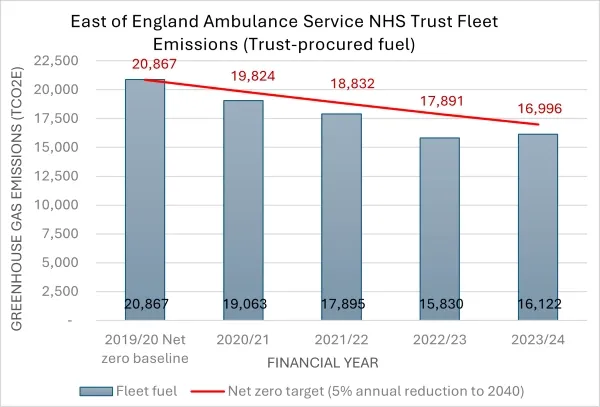
Energy emissions
Historically, much of our utilities data was based on estimated meter readings, this made energy management difficult and led to billing errors. Half-hourly automatic meter reading systems are being installed on all our electricity and gas meters to enable more accurate billing and better visibility to target energy efficiency initiatives. With the project very near to completion, we are beginning to see more accurate data and fewer billing errors.
Overall, 2023/24 energy emissions are 2% below the previous year, with a 2% increase in electricity and 4% decrease in gas. Emissions at 2,785 tCO2e are 18% below the 2019/20 baseline, so we are slightly off track for net zero by 2040 (the 2023/24 target was 20% reduction or 2,761 tCO2e). EEAST continues to identify high energy consuming sites to audit for potential energy saving projects.
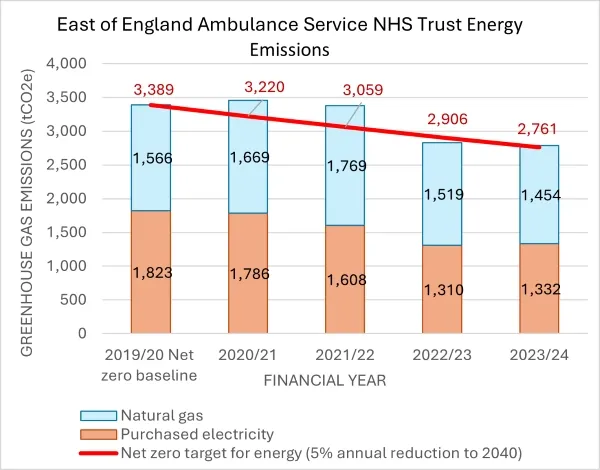
Entonox (nitrous oxide) emissions
EEAST received monthly Entonox usage data from our supplier which enabled us to measure nitrous oxide emissions (which totalled 1,521 tCO2e in 2023/24), this was a 12% reduction compared with last financial year and a 27% reduction since the 2019/20 baseline, meaning EEAST is on track for net zero emissions by 2040. It must be noted that we do not have accurate data on our clinical usage versus waste.
Anaesthetic gases, such as mixed nitrous oxide, are being targeted as a priority area for emissions reductions by the NHS as they are extremely potent greenhouse gases (nitrous oxide is 265 times more potent than carbon dioxide at trapping heat in the atmosphere).
Clinicians currently rely on the fill gauge on cylinders showing red before switching cylinders. Across the sector, this practice leads to an estimated 30% remaining in mixed nitrous oxide cylinders returned to suppliers as waste. Suppliers are required to vent any remaining gas to atmosphere prior to refilling cylinders. We aim to investigate waste reduction techniques, such as an app available via our supplier which monitors usage or through clinical guidance.
The medicines management team will start a trial of Penthrox in Norfolk and Waveney from April 2024. Life cycle analysis shows that Penthrox has a significantly lower climate change impact when compared with nitrous oxide.
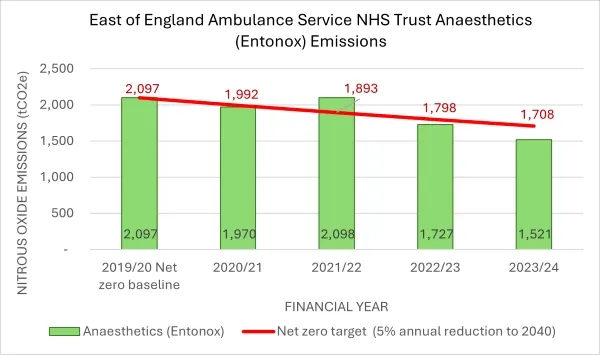
Waste management
National strategy calls for NHS trusts to transfer clinical waste to offensive waste, which has a much lower environmental impact and also saves costs. Hazardous clinical waste is treated with high temperature incineration which produces significant carbon emissions and the heat cannot be recovered. Offensive waste has no hazardous properties and can be treated or disposed of similarly to general municipal waste, which usually includes convential energy from waste (EfW) treatment.
Initial assessments of our clinical waste streams indicated that up to 80% could be treated as offensive waste and can be treated in an energy from waste facility. Offensive waste bins were introduced to sites and vehicles across EEAST during January 2024. When this was introduced, we saw 4.8% of offensive waste in January, 18.3% in February and 31.9% in March. Early data from the frst 3-months of data showed EEAST is on track to achieve the national target of 60% segregation by June/July 2024.
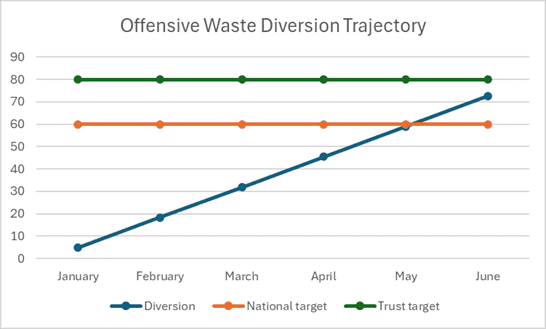
The Facilities Manager, Environment and Sustainability Manager and Procurement Category Manager undertook a Duty of Care audit at Veolia’s depot in Basildon.
The Sustainability Engagement Coordinator started doing investigations of on-site waste practices in March 2024 with the first site visit to North Walsham. Data from February 2024 showed that the site recycled only 4.7% of its waste, compared with a Trust average of 22.7% for the month. After the visit, feedback was reported to the Facilities Manager, this resulted in North Walsham achieved a recycling rate of 28.1% in March 2024 which was over the Trust average of 24.1%.
Fleet improvements
Fleet continued to add electric vehicles to our fleet following the successful trials of response vehicles last financial year. EEAST ordered 12 Mercedes eVito mental health response vehicles (MHRVs), to be delivered early in 2024/25. 15 Skoda Enyaq rapid response vehicles (RRV) also due for delivery in early 2024/25, which makes up 20% of the new RRV fleet.
We are part of an NHS England trial of electric double-staffed ambulances (DSAs), with the first 3 Ford E-Transit vehicles due for conversion and delivery later in 2024-25.
More fuel-efficient DSA-type vehicles (Renault and MAN) were purchased this year as part of the continual replacement of the Mercedes DSA.
The 27 charging units purchased during 2022/23 are expected to be installed in early 2024/25, Fleet is currently not planning any further EV additions to the operational or support fleet until the EV charging infrastructure can be increased to support them. There were no new installations or purchases of EV charging units in 2023/24.
Electric vehicle infrastructure
There will be 13 electric vehicle (EV) chargers installed at 4 sites across the Trust in early 2024/25:
- Waveney Depot – 3 EV chargers
- Peterborough Ambulance Station – 3 EV chargers
- Stevenage Ambulance Station (Unit 4, Babbage Road) – 3 EV chargers
- Southend (Aviation Way) Ambulance Station – 4 EV chargers Sites are being identified for installation of the remaining 14 EV chargers purchased during 2022/23. These will be dependent on operational need, electrical infrastructure and fire risk assessments. The chargers are initially for RRVs and MHRVs and will support electrification of our operational fleet.
We have purchased a back-office charge point management system which allows communication between the vehicle and the charger. The system portal allows us to monitor and report on usage across our estate. RFID cards have also been purchased that will enable fleet vehicles to use the chargers.
Purchasing
All EEAST tenders included a minimum 10% weighting criteria for social value and net zero with tenders above £5 million including the requirement for suppliers to publish a Carbon Reduction Plan in line with legal requirements and in support of our Sustainability Strategy.
EEAST started to implement a platform that allows us to measure, manage and report social value benefits that will also lead to the development of a Trust Social Value Plan next financial year.
The Trust updated its Modern Slavery Statement in line with the Ethical Trading Initiative-Modern Slavery Statement Evaluation Framework and in line with best practice.
Trust tenders supported our net zero and sustainability aims through:
- Use of the Supplier Sustainability Agreement as a pass or fail element within tenders.
- Use of the Standard Selection Questionnaire (SQ) which includes as pass or fail elements for carbon reduction, equality, diversity, and inclusion as well as modern slavery.
- Use of three clear areas of evaluation that include quality, social value and sustainability (minimum 10%) as well as commercial weightings.
Successful suppliers are not only required to commit to reducing carbon emissions and acting more sustainably they must commit to deliver further social benefits over the life of the contract in line with their commitments made in the tender submission. The renewal of the contract for stationery, for instance, included not just a commitment to reduce carbon, but a quarterly donation towards the East of England Ambulance Service Charity.
Electricity contracts are 100% renewable from non-nuclear sources. To ensure we procure renewable electricity and the best rates we add new sites to our utility contracts through Crown Commercial Services.
We purchase 100% recycled, FSC and EU Ecolabel accredited paper and double-sided printing was the default option on all our printers.
Stores are reusing packaging and cardboard boxes rather than disposing of them. New bins to collect cardboard for recycling were introduced at Norwich Office and EOC (Hellesdon) and Letchworth sites. We engaged with our supplier (NHS Supply Chain) to reduce packaging and use of plastic bags. To reduce waste and out-of-date stock, we no longer hold excess stock. To reduce mileage and carbon emissions from deliveries, we use fewer suppliers for purchasing items. Stores have economical vehicles that are lightweight and can carry a large load. Staff are reducing energy usage by using as much natural light as possible and switching lights off and turning PCs off at the end of the day.
Wellbeing gardens and biodiversity
Two wellbeing gardens were completed during 2023/24. One of these was HART at Melbourn which incorporated a gazebo, lights, artificial hedgerow, trellis, and planting on a concrete area to the left side of the depot. The other was at Norwich Office and EOC, transforming an unused piece of land into a tranquil space for colleagues to use on station. Local suppliers and environmentally sustainable materials/products were used wherever possible.
As a part of a rewilding project with Essex Wildlife Trust and their Nextdoor Nature campaign, 60 hedge saplings were planted at Thurrock in November 2023 along with 10 fruit trees in March 2024. The Woodland Trust also sent 50 hedge saplings to Hemel Hempstead Ambulance Station in December.
Digital sustainability
We work with Circular Computing to buy remanufactured laptops rather than new. The company is a BSI Kitemark Certified Remanufacturer and a certified Carbon Neutral organisation. They plant five trees in Africa, India or the USA for every laptop purchased via a partnership with WeForest. All packaging is recyclable with old assets returned for recycling and remanufacturing at the end of their useful life.
In 2023/24, Circular Computing planted 4,160 trees on behalf of the Trust (4% more trees than in 2022/23 at 3,810 trees).
Task Force on Climate-related Financial Disclosure (TCFD)
The Department of Health and Social Care Group Accounting Manual (GAM) has adopted a phased approach to incorporating the TCFD recommended disclosures as part of sustainability annual reporting requirements for NHS bodies, stemming from HM Treasury's TCFD aligned disclosure guidance for public sector annual reports. TCFD recommended disclosures as interpreted and adapted for the public sector by the HM Treasury TCFD aligned disclosure application guidance, will be implemented in sustainability reporting requirements on a phased basis up to the 2025-26 financial year. Local NHS bodies are not required to disclose scope 1, 2 and 3 greenhouse gas emissions under TCFD requirements as these are computed nationally by NHS England. The phased approach incorporates the disclosure requirements of the governance pillar 2023-24. These disclosures are provided below with appropriate cross referencing to relevant information elsewhere in the annual report and in other external publications.
Board oversight of climate-related issues
The East of England Ambulance Service NHS Trust has plans in place which take account of the ‘Delivering a Net Zero National Health Service’ report under the Greener NHS programme. The Trust ensures that its obligations under the Health and Care Act 2022 relating to the Climate Change Act 2008, Environment Act 2021 and climate change adaptation requirements are met.
The Trust has clear governance structures to support climate and sustainability reporting and assurance. One of the Trust’s four strategic goals detailed in the Corporate Strategy 2020-25 is to be an environmentally and financially sustainable organisation with a related strategic risk (SR4) being overseen by the Board devolved authority and sub-board committee and Compliance and Risk Group.
The Trust’s Sustainability Enabling Strategy 2020-25 and Green Plan 2021-26 are underpinned by robust objectives. The Green Plan was approved by the Trust Board in November 2021. The strategy sets out how the Trust will govern, manage and implement its sustainability plans for the 5-year period 2020-2025 and supports the Corporate Strategy approved by the Trust’s Board of Directors.
Assurance and reporting for sustainability issues including climate action and goals is delivered through robust governance assurance processes. The Trust has a designated Board member champion who is responsible for ensuring the delivery of the sustainability agenda. Sustainability agenda assurance is supported by internal audit, monthly integrated performance and Board assurance framework reporting, and an annual report submitted to Board. The Board receive sustainability updates via the CEO report at each bimonthly Board meeting. This report contains progress reports for key scope 1 and 2 emission sources (see Section 5) mapped against the Trust’s net zero pathways as set out in the Green Plan.
Management's role in assessing and managing climate-related issues
The Environment and Sustainability Manager coordinates workstreams and monitors progress against targets, providing assurance reports to internal and external stakeholders. The bimonthly Sustainability Working Group, responsible for the functional delivery of the Strategy and Green Plan, reports to the Board via the monthly Compliance and Risk Group with an escalation process to the Executive Leadership Team and from there to the Board.
The Executive Clinical Group supports the delivery and takes decisions to deliver the strategic objectives of the Trust. In undertaking its role, the Executive Clinical Group takes business as usual and strategic decisions to deliver its ultimate purpose. The Transformation Programme Group is responsible for ensuring connected planning principles are applied to any proposed programmes or initiatives and sustainability is a key consideration in the business case template:
Sustainability - How will the project affect Trust sustainability including environmental considerations, efficiencies, product lifecycles, energy use, community engagement and so on? Include the carbon impact if relevant.
The Trust has established a programme of themed Accountability Forums, which provide an opportunity for each department and sector to consider its areas of delivery, identifying themes for improvement and considering sustainability and climate matters.
Finance
During the financial year 2023/24 EEAST spent £442.0m, an increase of £22.0m over the previous year 2022/23. There was also an increase in income received of £20.5m to £442.9m (2022/23 £422.4m) which generated a surplus for the year of £0.9m (2022-23 £1.9m). The original financial plan for 2023/24 was to deliver a break-even position.
The primary reason for the surplus was due to underspends caused by vacancies which were slow to fill as recruitment proved challenging due to a lack of candidates applying for roles. The risk, as these vacancies fill, is that financial balance may be compromised, but EEAST’s focus on its finances would identify these risks to allow mitigating actions should they be required.
The income arrangement with our commissioners continued to be via a ‘block’ income arrangement. The most significant financial change for 2023/24 was the investment of £12.5m from the National Urgent and Emergency Care (UEC) funding. This allowed for the transformation of services that is required to improve performance to our patients.
We continued to focus on cost efficiency targets across 2023/24. Our target was agreed at £13.6m which was achieved, although a significant element was on a non-recurrent basis. The cost efficiency target for 2024/25 is planned at £16.2m which is a challenging target for EEAST. Plans are being prepared with the view that these will be in place by the end of May 2024.
The Board will continue to monitor our financial position and key risks.
EEAST has submitted a draft plan for 2024/25 which is based on a balanced budget.
Across 2023/24 EEAST invested £14.6m in capital assets:
- £6.1m invested in building projects. This was for the development of existing sites, for station refurbishments and for our electric vehicle charging infrastructure.
- £5.6m was invested in new vehicles including double staffed ambulance (DSA) chassis, welfare vehicles and resilience vehicles.
- £1.7m on IT towards development of a new website, introducing a system to ensure email security and malware software.
- £1.2m was invested in medical devices and training equipment.
- EEAST received capital investment of £1.9m to support the ambulance replacement programme and building projects, together with £0.5m of donated medical equipment assets.
- We disposed of one aged station site, Dunmow, relocating the provision of this locally. This generated capital receipts of £0.1m.
The full financial statements for the year ending 31 March 2024, are presented within the Annual Accounts.
At a glance highlights
What we delivered during 2023/24 and what we will deliver during 2024/25.
Strategic Objective 1: Be an exceptional place to work, volunteer and learn
Commitment: Our people feel valued, involved and supported
-
Delivered 2023-24
- Implemented year one plan or our People Strategy in line with NHS People Promise
- Delivered local intervention with hot spot areas for high staff turnover / sickness
- Focused support from ‘Stay with EEAST questionnaire’ findings reduced regretted attrition
- Improved flexible working options for employees
- Increased local onboarding support for new starters
- Launched ‘Listening into Action’ events following our National Staff Survey results
-
Planned delivery 2024-25
- Deliver Year 2 of our People Strategy in line with the People Promise
- Implement technological improvements to improve the service we provide
- Focus on our reward & recognition activities to improve employee experience and retention, supported by the Exemplar Programme
- Develop Reasonable Adjustments process to further support our people and leaders
- Grow the Green Champion Network further to involve colleagues across all areas of EEAST to engage in the conversation of sustainability.
- Increase the number of Cultural Inclusion Ambassadors across EEAST
- Embed the second year of our Inclusivity Plan, focusing on workforce education and training.
- Introduce digital induction tool to increase onboarding support for new starters.
- Engagement across EEAST from Clinical Quality Teams (Patient Safety, Patient Experience, Safeguarding, Health and Safety) in order that staff are aware of and understand the learning gained from events that have been reviewed and their responsibilities in line with legislation.
- Deliver on our internal professional standards that will be embedded within our People Promise, cultural framework, onboarding, appraisals and 5 year strategy to articulate how we support, take ownership and accountability of our workforces behavioural standards.
Commitment: We are all healthy in our work.
- Delivered 2023-24
- Relaunch of the chaplaincy offering to provide a more diverse model which matches the diversity of our people and communities
- Expansion of welfare wagons to provide better refreshments and additional support by way of councillors, physio chaplains and Good Dogs. The service was made available to all our people and used for recruitment and brand promotion.
- Delivered mental health first aider training and mental health awareness training to assist our leaders in caring for their teams and one another
- Planned delivery 2024-25
- Increase the number of TRiM Practitioners, Mental Health First Aiders, Wellbeing Champions, and Menopause Mentors available to support our people throughout the Trust.
- Launch the Time for Me Hapstar App to staff - the creation of a new app and platform that will assist all our people with keeping their mental health in check, with support and resources immediately available. Soft launch is currently underway with our staff champions and looking to launch to the whole trust mid-May 2024.
- Monitor the utilisation of welfare wagons to ensure value for money and staff uptake.
- Aligning health and wellbeing with Time to Lead - New Mental Health Toolkit underway, including a Wellbeing passport and a Directory of Service.
- Recruit Welfare Wagon volunteers.
- Working with the charitable trust to increase the awareness of our existing wellbeing gardens.
- Promote active travel options to our people.
- Refresh the approach to Occupational Health delivery. Recruiting an internal team to improve the efficiency and effectiveness of the service.
Commitment: We are developed so we can be the best version of ourselves.
-
Delivered 2023-24
- Increased number of career pathways across EEAST
- Expanded access and range of degree apprenticeships
- Transitioned to new e-learning portal to increase learner experience
- Transitioned to new e-learning portal to increase learner experience
- Provided over 15,000 spaces on our annual CPD programme for staff
-
Planned delivery 2024-25
- Expand career pathways to non-clinical directorates
- Provide appraisal training to managers to increase value and output
- Expand new to work apprenticeships
- Continue to explore and develop new ways to share learning
- Work to embed sustainability and sustainable travel into our staff induction and on our staff intranet.
- Adopt e-signatures on all onboarding and induction documents
- Increase recycling and offensive waste rates for efficient and environmentally friendly waste streams.
Commitment: We all own our roles, caring about our teams and place
-
Delivered 2023-24
- Undertook organisational structure review of Operational teams to better align resource with delivery
- Started to introduce digital appraisal system to underpin development needs
- Developed and implemented Greatix system for EEAST, 2799 submissions, 81 % fully processed
- Developed and implemented Display Screen Assessment Process, trial and full roll out pan Trust
-
Planned delivery 2024-25
- Develop an approach to talent and succession planning across EEAST
- Review the structure of the Clinical Quality and Medical teams to ensure they are fit for purpose.
Commitment: We lead well, fairly and with confidence. We are also great followers
-
Delivered 2023-24
- The Time to Lead (TtL) programme was introduced to:
- Support improved operational performance
- Improve colleague welfare
- Improve leadership development offering
- Improved governance model
- Provide clarity on roles and responsibilities
- Ensured positive steps towards delivering against CQC expectations. During 23/24 the TtL programme delivered:
- A revised Operating Model in Front-line Clinical Operations
- Recruitment to the senior leadership and some of the supporting roles within the new operational structure.
- Launched new Leadership Development Programme to all managers and leaders, obtaining a 92% satisfaction rate in the first 4 months
- Provided dedicated 1:1 and team coaching support for Operational Leadership teams
- The Time to Lead (TtL) programme was introduced to:
-
Planned delivery 2024-25
- Expand the reach of the newly implemented Leadership Development Framework to future leaders
- Create opportunities for continuous leadership development for all managers
- Provide training to managers across EEAST to further embed the systems and processes for the Patient Safety Incident Response Framework
- TtL Work continues throughout 24/25 to:
- Recruit and onboard Local Operational Managers and Team Leaders
- Provide access to career and Leadership development opportunities for staff enhancing their health and wellbeing
- Implement a new Governance Framework
- Drive benefits realisation through a business change approach.
Strategic Objective 2: Provide outstanding quality of care and performance
Commitment: Every patient has a predictable, reliable and appropriate pre-hospital experience
-
Delivered 2023-24
- Introduced a new clinical safety plan for use during periods of high demand and system pressure.
- Introduced co-horting of patients at hospitals to release ambulance clinicians back into the community, alongside moving calls to community providers via the Access to Stack process
- EEAST increased the number of C2s receiving an appropriate Hear and Treat outcome from 4% to 6%.
- Delivered statutory/mandatory training for all staff including the roll out of level 3 multiagency safeguarding training to all registered professionals
- Clinical strategy has impacted the reduction in the levels of harm to patients as seen in the lower level of reported incidents that were reported as serious incidents.
- Training received by 2/3rds of the clinical workforce to level 3 standard.
-
Planned delivery 2024-25
- Embedding of the patient safety incident framework
- Implementation of new clinical strategy to ensure we are fit for the future.
- Improve C2 performance by reducing handover delays, improve vehicle availability, increase hear and treat, and reduce on-scene time.
Commitment: All parts of our patient pathways are effective and provide a seamless care experience
-
Delivered 2023-24
- Development of call before you convey services.
- Introduction of electronic patient records with direct access to CPIS (child-protection information service) and direct electronic referral to 111 providers.
- Introduced CPIS access to the electronic patient care record. This supplemented the safeguarding referral made through single point of contact as required.
- Established Advanced Practice Leadership and enrolment of first cohort of trainee Advanced practitioners.
-
Planned delivery 2024-25
- Implementation of local clinical hubs
- Development of advancing practice department
Strategic Objective 3: Be excellent collaborators and innovators as system partners
Commitment: We all work together to improve all the time
- Delivered 2023-24
- We continued to work in this local way, sharing learning and good practice from each area. We continued to support national mandates via local delivery mechanisms, such as Mental Health Joint Response Vehicles.
- Planned delivery 2024-25
- Promote transparency and respect for diversity and inclusion by promoting a notable access to a “Speak Up” culture to report harassment, discrimination and abuse of any form and avail 3rd party investigations.
- Continue to work in a local way, sharing learning and good practice from each area. We will continue to support national mandates via local delivery mechanisms, such as mental health joint response vehicles.
Commitment: We lead as the regional provider, collaborating to support effective pathways of care for our patients
-
Delivered 2023-24
- EEAST led the development of its regional clinical strategy with a partnership approach, including a face-to-face partnership event hosted by University of Suffolk.
- We initiated and supported a range of blue light partnerships and continue to recruit community first responders.
-
Planned delivery 2024-25
- Work with hospital partners to install EV infrastructure to support the electrification of our fleet and reduce air pollution.
- EEAST will implement the clinical strategy by the development of community hubs, call before you convey and utilise access to the stack.
- EEAST will implement its volunteer delivery plan to promote volunteer insight and impact and make every contact count.
Strategic Objective 4: Be an environmentally and financially sustainable organisation
Commitment: We are effective and efficient in our work
-
Delivered 2023-24
- The Trust achieved a surplus of £0.9m which was better than the planned break-even position for 2023/24.
- The Trust achieved cost improvements across 2023/24 of £13.6m, although a significant element was on a non-recurrent basis.
- A new, challenging workforce plan was set in line with a refreshed Clinical Operating Model. Investment in Peoples Services was approved to support the changing and growing workforce at EEAST.
- Roll out of make ready services achieved across the Trust to support efficient operational performance.
-
Planned delivery 2024-25
- EEAST has set a plan to achieve a break-even financial position for 2024/25.
- EEAST is confident it can achieve this plan despite the intense financial pressures currently facing the NHS.
- Increase staff engagement in sustainability through training and events.
- Reduce our directly controlled carbon emissions by 5% annually - aligned to our Green Plan targets to make an 80% reduction between 2028-2032 and to reach net zero by 2040.
- All new hubs will be designed and built to the independently verifies sustainability assessment, BREEAM Excellent.
- Atamis is the e-commercial system to replace Bravo. In time all tenders/evaluations/contract management/contracts will be on the same platform. We implemented the system in March this supports greater collaboration as other trusts information is visible.
- CCIAF- assessment is due in October 2024. EEAST is gathering the information for the peer review now. It is not expected the final assessment and results will be known until January 2025.
- Purchase to Pay- examining options currently.
- Social Value portal is the supplier that will support us on the SV strategy around the National TOMS/SV Model. We are engaged with them now and this will evolve.
Commitment: We are continuously seeking improvement opportunities, learning from insights and our data
-
Delivered 2023-24
- The Operational Performance Improvement Plan set by EEAST identified clear areas for financial and productivity improvements.
- Implementation of the Planning and Resourcing project commence in 2023/24.
- To further enhance our approach to making data count, the Trust started to enhance its business analysis capabilities
-
Planned delivery 2024-25
- EEAST has a challenging Cost Improvement programme target for 2024/25 of £16.2m. Plans for achievement are underway.
- The Operational Performance Improvement Plan set by EEAST identifies clear areas for financial and productivity improvements.
- Implementation of the Planning and Resourcing project commenced in 2023/24 and is due to be fully operational in 2024/25.
- Strive to improve accountability for our fleet and buildings data through periodic audit and enhanced documentations to ensure efficiency across all sites and better work ambience for our staff members.
- Conduct trials in the adoption of cleaner mode of transportation (Rapid Response Fleet) at the value of response time.
- Conduct a green benchmarking of our travel routes (for our fleet) in relation to efficient driving (when not in blue-light mode), value for money and CO2 emission.
- Transitioning our fleet to electric vehicles and installing EV infrastructure.
- Adhere to the NHS Net Zero Supplier roadmap, taking account of social value and carbon reduction plans in our procurement processes.
Our Trust Strategy 2025 to 2030
Where we have come from…
In 2022, a review of EEAST’s strategies identified 17 separate strategic documents, each of which had its own strategic narrative. EEAST’s executive team sought to consolidate these documents into three strategies namely the Clinical, People and Sustainability Strategies.
At this time the organisation commissioned a case for change which highlighted several key areas for improvement. The sections that follow highlight progress made in developing these three strategies, but it is important to note that a lot of good work has already happened in executing against each.
This section concludes with an overview of how this work is evolving as we look to develop our Trust Strategy 2025 to 2030.
Our Clinical Strategy
Demand for support from ambulance services has been increasing over recent years. To manage, within our resources, EEAST must respond differently. To take a holistic, integrated, community focus, we have produced the Clinical Strategy 2023-2026. This has been developed in conjunction with our people, regional partners, patients, and community engagement groups.
EEAST plays a pivotal role in the urgent and emergency care system. Our qualified, experienced, and diverse workforce responds to the individual needs of patients who dial 999. EEAST cannot deliver care without the support of our partners.
Our strategy outlines EEAST’s approach, alongside integrated care boards (ICBs) and other partners, in changing and improving the way we deliver care. Our aim as a system is to provide the right care in the right place at the right time, and as close to the patient’s home as possible. Working hand in hand with ICBs and service providers means we can ensure patients are managed using appropriate alternative care pathways. This enables EEAST to respond to the patients in most need of emergency clinical assessment and emergency ambulance response.
This strategy details how we deliver an integrated approach that will result in a timely response that meets the specific needs of our patients. We work more closely with patients, communities, providers, and partners to ensure this happens and we continually seek to improve how we deliver our service.
Our People Strategy
This strategy outlines our people pledges (aligned to the NHS People Promise) and the improvement actions that will help us to achieve our strategic ambition to invest in our exceptional people, enabling them to be the best they can be every day. This will be achieved through our promise to our people to:
- Prioritise the health and wellbeing of all our people.
- Create a great employee experience.
- Ensure inclusion and belonging for all.
- Support and develop the people profession.
- Harness the talents of all our people.
- Lead improvement, change and innovation.
- Embed digitally enabled solutions.
- Enable new ways of working and planning for the future.
Over the past few years, all of our people have worked incredibly hard to support the delivery of care to our patients under unprecedented conditions. This has been extremely challenging, and it was important that this strategy focused on providing a great employee experience and support for our people, now and in the future.
As we progress with the delivery of actions over the next three years, we will continue to listen to our people and consider what is important to them so that we can adjust along the way. We will ensure that EEAST’s values remain at the heart of everything we do.
Our Sustainability Strategy
The EEAST Sustainability Strategy defines organisational sustainability as meeting the future needs of the organisation without compromising patient care, staff wellbeing, sense of belonging, financial viability, or the environment.
The strategy pulls together the triple bottom line of environmental, social, and economic sustainability and includes, but is not limited to the following key areas:
- Financial Sustainability
- Operational performance and efficiencies
- Digital Transformation – 5 Year Digital Plan
- Sustainable Procurement
- Environmental responsibility – The EEAST Green Plan
- Estates Strategic Enabling Plan
- Fleet Strategic Enabling Plan
- Make Ready Services (MRS) Strategic Enabling Plan
- Medical Devices Strategic Enabling Plan
- Building a Sustainable Workforce – People Strategy and Workforce Plans
The sustainability strategy seeks to provide guidance and set objectives for these strategic enabling plans and will be submitted to the board for sign-off in June 2024.
Strategic evolution
Following a Board decision in October 2023, a framework and programme to design and deliver the next Trust Strategy 2025 to 2030 was established.
The table below shows the strategy development programme of work.
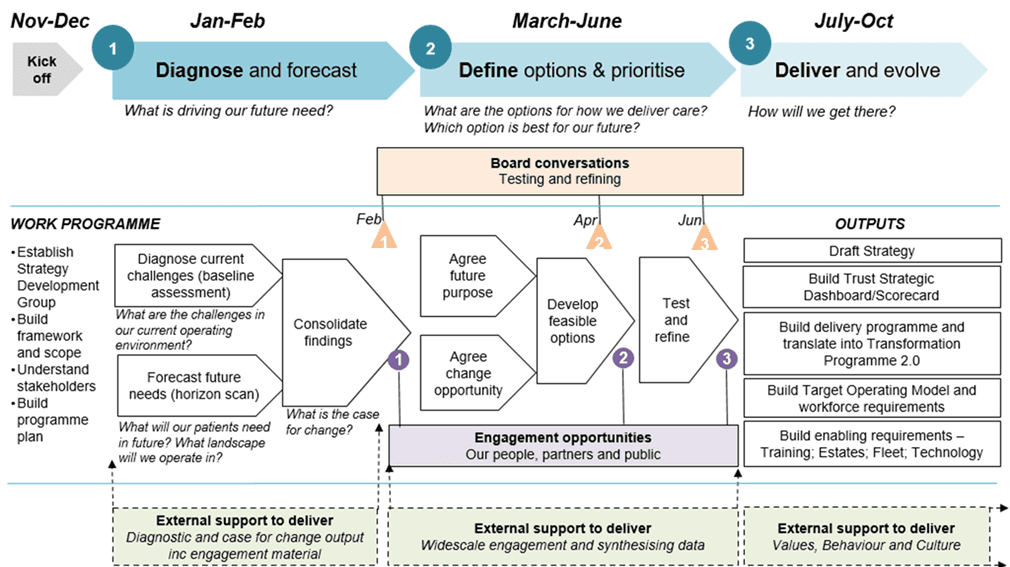
Phase 1 of the programme (Diagnose and Forecast)
This phase looked to understand the factors driving future needs. As agreed by ELT in January 2024, consultants were engaged to construct a Case for Change, which has subsequently been rebranded as the Evidence for Evolution (E4E) in recognition of the amount of work that has already gone into addressing many of the areas identified by the study.
In building the E4E, a combination of internal and external data sources was used to predict future trends and identify areas for improvement. The outcomes of the report were presented and tested with a forum of executive and deputy directors.
Phase 1 on the programme is now complete and the insights drawn from this exercise will help to shape our future operating model.
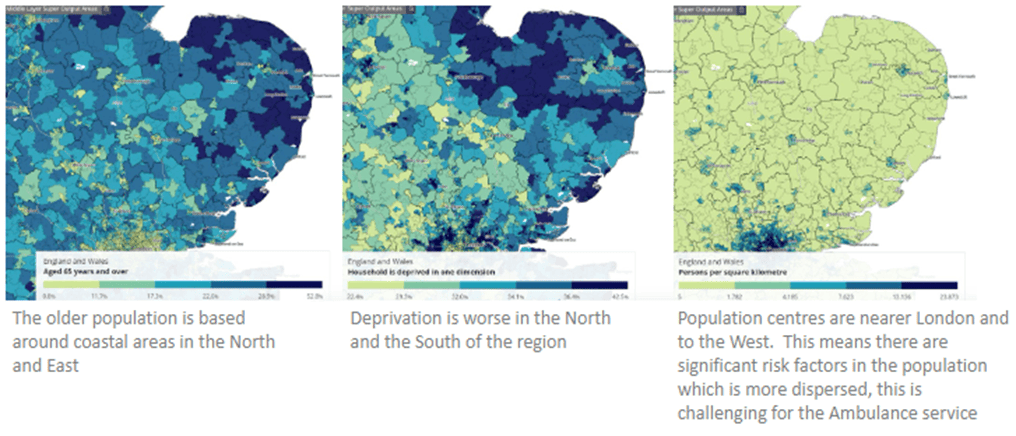
The table above shows many high need patients are situated away from population centres.
Phase 2 (Define Options and Prioritise)
This phase seeks to engage our people, patients, and partners to provide insights that will inform and answer the questions outline by the Board in October 2023. The questions were as follows:
- What do communities in EEAST need and want from an ambulance service in the future?
- What is the right response for our communities? How should the system respond?
- What should the ambulance service deliver within that? And what is for others?
- What is our operating model?
In order to facilitate this level of engagement, EEAST has been making use of an online moderated service provided by Clever Together which connects participants and stimulate discussion surrounding these core questions.
In our first conversation, which concluded in April 2024, we posed four questions to our people to direct and structure a conversation about our shared future.
- What future do we want for each other?
- What future do we want for our patients, families and carers?
- What actions do we need to stop, start or continue?
- What behaviours should we expect from each other, and which behaviours will we no longer tolerate?
It is worth noting that participation was in excess of 10% of our people, who together made more than 5,000 contributions. Our next conversation, which will explore these ideas further, will commence in May, and we are looking to conclude phase 2 towards the end of June 2024.
I confirm that this performance report complies with the reporting requirements.
Tom Abell, Chief Executive Officer
19 June 2024
Directors' report
The Board of Directors is legally responsible for the day-to-day management of the Trust. It is accountable for the operational delivery of services, targets and performance, and responsible for setting our strategy and future direction. Our Board has a duty to provide safe and effective services and robust financial stewardship.
Our Trust Board, consisting of the Chair, five Non-Executive Directors, the CEO and four Executive Director members, is the corporate decision-making body of the Trust, accountable for all strategic, operational, and financial decision-making, and with powers to delegate and make arrangements to exercise any of its appropriate functions through a Sub-Committee.
The Chair is responsible for ensuring the Board of Directors focuses on the strategic development of the Trust and that robust governance and accountability arrangements are in place. We are required by the Health and Social Care Act 2008 (Regulated Activities) Regulations 2014 to ensure that our directors are fit and proper for their roles. To fulfil this responsibility, the Trust has undertaken appropriate Fit and Proper Persons checks for all directors during 2023/24.
Our Trust Board and Sub-Committee structure during 2023-2024
There were changes to Committee structures in September 2023; the Transformation Committee was dissolved and its areas of focus moved to the Transformation Programme Group, with oversight provided twice a year by the Integration and Planning Board.
Committee responsibilities
Audit committee
- Auditing compliance
- Internal/external audit
- Financial systems
- Internal control (standing orders, scheme of delegation, reservation of powers), BGAF
- Risk assurance
- Process for monitoring compliance—regulation, legislation
- Security management
- Systems and processes
- Annual report/account, including charity
- Declarations
- Information governance
- Counter fraud
- Assurance of board sub-committees
- Data quality and security
Remuneration and nomination
- Determining arrangements for remuneration, terms and conditions and performance criteria for the CEO and executive tea
- Non-contractual payment arrangements
- CEO and executive directors’ succession planning
- Trust board structure, size and composition
- Appointments panel for executive directors
Quality governance
- Clinical quality, safety, and effectiveness
- Patient experience
- Clinical audit
- Research and innovation
- Ethics
- Quality account
- CQC registration and compliance
- Learning from experience
- Serious incidents
- Medicine management
- Infection, prevention and control
- Safeguarding
- Mandatory clinical training
- Private ambulance oversight
- Patient and public involvement
Performance and finance
- Delivery of objectives for finance and performance
- Capital development
- Quality cost improvement programmes
- Financial statement and investments
- Activity and performance analysis
- Information management and technology
- Patient transport services provision
People
- Culture
- Workforce performance and development
- Recruitment and retention
- Vetting and barring
- Health, safety and wellbeing
- Employee relations casework and employment tribunals
- Training and education
- OFSTED compliance
- Gender pay gap
- Equality act compliance
- Staff engagement and inclusion
- Staff survey
- Vision and values assurance
Transformation (ceased 19/07/2023)
- Programme and project management
- Strategy development oversight
- Programme delivery
- Sustainable transformation plan progression in line with the NHS long-term plan
- Strategy progression assurance
- Digital strategy progression
- Estates, fleet, make ready strategy suite progression
Planning and integration board (commenced 18/10/2023)
- Programme and project management
- Strategy development oversight
- Programme delivery
- Sustainable transformation plan progression in line with the NHS long-term plan
- Strategy progression assurance
- Digital strategy progression
- Estates, fleet, make ready strategy suite progression
Charitable funds committee
- Managing the Trust policies and procedures for charitable funds and ensuring these are compliant with regulations
- Ensuring a proper and prudent return on investment for fundraising activities
- Seek assurance that charitable funds have been managed and spent in accordance with their respective governing documents, the standing financial instructions, and the charity principles
- Overseeing the development and implementation of a charity strategy
- To review and approve the acceptance of restricted funds
- Oversee fundraising activities
- On behalf of the corporate trustee, review the accounts of the charity and receive the independent examination of said accounts, commend the accounts to the trustee once considered by the committee.
- Establish, prioritise and approve major fundraising projects over £25,000 and approve major expenditure items over £25,000
- Review and approve annual fundraising plans
Our Board and Sub-Committee Evaluation
The Board and its Sub-Committees review their effectiveness formally on an annual basis through an approved evaluation process. Within the 2023/24 year, the effectiveness reviews were undertaken in March 2024 and reported to the Audit Committee in May 2024. The effectiveness review identified many significant improvements across the Board and Sub-Committees, and future improvement themes were identified, supported by action plans.
In accordance with the Public Bodies (Admission to Meetings) Act 1960, the Board holds its meeting in public every other month. The agenda and reports for the Board are published on the website and made available to the public ahead of the meeting.
Voting Directors
- Nicola Scrivings: Trust Chair, left the Trust in June 2023
- Wendy Thomas: Senior Independent Director. Chair People Committee.
- Mrunal Sisodia: Chair Audit Committee, appointed Trust Chair in June 2023
- Alison Wigg: Chair Transformation, Remuneration and Charitable Funds Committees. Retired in January 2024 after exhausting terms of appointment.
- Neville Hounsome: Chair Quality Governance Committee, retired in July 2023 after exhausting terms of appointment
- Julie Thallon: Chair Performance and Finance Committee
- George Lynn: Chair Audit Committee, appointed June 2023 replacing Mrunal Sisodia
- Catherine Glickman: Chair Quality Governance Committee, appointed July 2023 replacing Neville Hounsome. Chair Remuneration and Nomination Committee, appointed January 2024 replacing Alison Wigg
- Chris Brook: Chair Charitable Funds Committee, appointed January 2024 replacing Alison Wigg
- Tom Abell: Chief Executive Officer
- Kevin Smith: Director of Finance
- Marika Stephenson: Director of People Services
- Melissa Dowdeswell: Director of Nursing and Interim Chief Operating Officer until October 2023. Appointed Chief of Clinical Operations in November 2023
- Simon Chase: Chief Paramedic (Allied Health Professional) and Director of Quality, appointed in January 2024
Non-Voting Directors
- Simon Walsh: Medical Director
- Emma de Carteret: Director of Corporate Affairs and Performance
- Hein Scheffer: Director of Strategy, Culture and Education
- Kate Vaughton: Director of Integration and Deputy Chief Executive Officer
- Kiran Mahil: Associate Non-Executive Director
- Victoria Corbishley: Associate Non-Executive Director
- Omid Shiraji: Associate Non- Executive Director, appointed January 2024
The Register of Declarations is available on the Trust’s website.
Committee membership and attendance
There are several key committees in place that help the Board to manage and monitor the organisation. The committees provide information and updates to the Board to contribute to its assessment of assurance.
Quality Governance Committee
Role and Purpose:
The Quality Governance Committee oversees the review of quality assurance on all aspects of quality. This includes reviewing information against the five quality domains of caring, responsive, effective, well-led, and safety. The primary aim is to ensure the robustness of systems, processes and behaviours, monitor trends, and take action to provide assurance to the Board.
Membership and Attendance:
- Neville Hounsome (Chair to July 2023) (3 of 3): Non-Executive Director
- Catherine Glickman (appointed Chair, July 2023) (4 of 4): Non-Executive Director
- Wendy Thomas (6 of 6): Non-Executive Director
- Victoria Corbishley (5 of 6): Associate Non-Executive Director
- Melissa Dowdeswell (5 of 6): Director of Nursing/Interim COO, appointed Chief of Clinical Operations, November 2023
- Simon Chase (4 of 6): Chief Allied Health Professional/Interim Director of Quality, appointed Chief Paramedic and Director of Quality, January 2024
- Simon Walsh (4 of 6): Medical Director
The Chair, Chief Executive and all other Non-Executive Directors are invited to attend. Other Executive Directors, senior managers and health professional staff attend for specific items.
Audit and Risk Committee
Role and Purpose:
The Audit and Risk Committee provides an overarching governance role, including overseeing the adequacy of the Trust’s arrangements for controlling risks and being assured that they are being mitigated. To do this, it reviews the work of other assurance committees, making sure the systems and controls used are sound.
Membership and Attendance:
- Mrunal Sisodia (Chair to June 2023) (2 of 2): Non-Executive Director, appointed Trust Chair, June 2023
- George Lynn (appointed Chair, July 2023) (4 of 4): Non-Executive Director
- Julie Thallon (4 of 5): Non-Executive Director
- Wendy Thomas (4 of 5): Non-Executive Director
The Director of Finance and Director of Corporate Affairs and Performance are standing attendees at the Audit Committee. All other Non-Executive Directors (excluding the Chair) are invited to attend, as are the External and Internal Auditors. Other Executive Directors, including the CEO and other senior managers of the Trust, are regularly invited to attend meetings of the Audit Committee for specific items.
Performance and Finance Committee
Role and Purpose:
The Performance and Finance Committee has delegated authority from the Board to oversee, co-ordinate, review and assess the financial and performance management arrangements within the Trust. The Committee assists in ensuring that Board members have a sufficiently robust understanding of key performance and financial issues to enable sound decision-making.
Membership and Attendance:
- Julie Thallon (Chair) (5 of 6): Non-Executive Director
- Alison Wigg (5 of 5): Non-Executive Director
- Chris Brook (3 of 4): Associate/Non-Executive Director
- Kiran Mahil (0 of 6): Associate Non-Executive Director
- Kevin Smith (6 of 6): Director of Finance
- Melissa Dowdeswell (5 of 6): Director of Nursing/Interim COO, appointed Chief of Clinical Operations, November 2023
The Chair and CEO are invited to attend. All other Non-Executive Directors are invited to attend. Other Trust Directors and managers and health professional staff attend for specific items.
Remuneration and Nomination Committee
Role and Purpose:
The Committee has an overall responsibility in respect of the structure, size and composition of the board and matters of pay and employment and the conditions of service for the Chief Executive, Executive Directors and Senior Managers.
Membership and Attendance:
- Alison Wigg (Chair) (5 of 5): Non-Executive Director, tenure ended January 2024
- Catherine Glickman (appointed Chair, January 2024) (4 of 5): Non-Executive Director
- Nicola Scrivings (1 of 1): Trust Chair, tenure ended May 2023
- Mrunal Sisodia (5 of 6): Non-Executive Director, appointed Trust Chair, June 2023
- Neville Hounsome (2 of 2): Non-Executive Director
- Wendy Thomas (5 of 6): Non-Executive Director
- Julie Thallon (5 of 6): Non-Executive Director
- George Lynn (4 of 4): Non-Executive Director
- Chris Brook (0 of 5): Associate/Non-Executive Director
- Kiran Mahil (0 of 6): Associate Non-Executive Director
- Victoria Corbishley (0 of 6): Associate Non-Executive Director
The Chief Executive and Director of People Services attend the Committee in an advisory capacity, except where his/her own salary, performance or position is being discussed; on such occasions they must not be present during the meeting.
Charitable Funds Committee
Role and Purpose:
The Charitable Funds Committee is responsible for managing and monitoring the charitable funds held by the Trust on behalf of the Board.
Membership and Attendance:
- Neville Hounsome (Chair to July 2023) (2 of 2): Non-Executive Director
- Alison Wigg (Chair, July 2023 to December 2024) (3 of 3): Non-Executive Director
- Chris Brook (appointed Chair, January 2024) (2 of 3):Associate/Non-Executive Director
- Nicola Scrivings (0 of 2): Trust Chair, tenure ended May 2023
- George Lynn (2 of 3): Non-Executive Director
- Kevin Smith (3 of 4): Director of Finance
Other members of staff are invited to attend as required.
People Committee
Role and Purpose:
The purpose of the Committee is to provide assurance to the Board on the quality and impact of people (all people, including staff, volunteers and trainees), organisational development strategies, and the effectiveness of people management in the Trust.
Membership and Attendance:
- Wendy Thomas (Chair) (6 of 6): Non-Executive Director
- Neville Hounsome (2 of 2): Non-Executive Director
- George Lynn (4 of 4): Non-Executive Director
- Catherine Glickman (0 of 4): Non-Executive Director
- Chris Brook (1 of 1): Non-Executive Director
- Kiran Mahil (0 of 6): Associate Non-Executive Director
- Marika Stephenson (6 of 6): Director of People Services
- Dr Hein Scheffer (6 of 6): Director of Strategy, Culture and Education
Other members of staff are invited to attend as required.
Transformation Committee
Role and Purpose: The purpose of the Committee is to provide assurance to the Board that top level strategic and supporting strategies for the organisation are in place and identify any issues in relation to the delivery of these strategies and the transformation agenda. This Committee was dissolved in July 2023.
Membership and Attendance:
- Alison Wigg (Chair) (2 of 2): Non-Executive Director
- Nicola Scrivings (1 of 1): Trust Chair, tenure ended May 2023
- Mrunal Sisodia (1 of 2): Non-Executive Director, appointed Trust Chair, June 2023
- Julie Thallon (2 of 2): Non-Executive Director
- Victoria Corbishley (0 of 2): Associate Non-Executive Director
- Kevin Smith (2 of 2): Director of Finance
Other members of staff are invited to attend as required.
Governance statement
Scope of responsibility
As Accountable Officer, I have responsibility for maintaining a sound system of internal control that supports the achievement of the NHS Trust’s policies, aims and objectives, whilst safeguarding the public funds and departmental assets for which I am personally responsible, in accordance with the responsibilities assigned to me. I am also responsible for ensuring that the NHS Trust is administered prudently and economically and that resources are applied efficiently and effectively. I also acknowledge my responsibilities as set out in the NHS Trust Accountable Officer Memorandum.
The purpose of the system of internal control
The system of internal control is designed to manage risk to a reasonable level rather than to eliminate all risk of failure to achieve policies, aims and objectives; it can therefore only provide reasonable and not absolute assurance of effectiveness. The system of internal control is based on an ongoing process designed to identify and prioritise the risks to the achievement of the policies, aims and objectives of the East of England Ambulance Service NHS Trust, to evaluate the likelihood of those risks being realised and the impact should they be realised, and to manage them efficiently, effectively and economically. The system of internal control has been in place in the East of England Ambulance Service NHS Trust for the year ended 31 March 2024 and up to the date of approval of the annual report and accounts.
Capacity to handle risk
The management of risk underpins the achievement of the Trust’s strategy and related priorities. Risk management is the responsibility of all staff and imperative to providing safe, quality care for patients and staff. Risk plays a key role in informing decision-making and is significant for the Trust’s business planning process where public accountability in delivering health services is required.
The Trust Board has overall responsibility for the management of risk. The Board provides leadership by ensuring that the Trust has an effective Risk Management Strategy and clear assurance reporting pathways. All Board Sub-Committees are responsible for monitoring and reviewing risks relevant to their remit, including the extent to which they are assured by the evidence presented with respect to the management of the risk. Each Committee has responsibility for escalating identified concerns to the Board.
Risk Leadership
The Chief Executive is the accountable officer for the management of risk, responsible for maintaining sound internal control systems that supports the achievement of the Board’s policies, aims and objectives, whilst safeguarding funds and assets. The Director of Corporate Affairs and Performance supports the Chief Executive in the role as accounting officer of the Trust and has responsibility for risk in relation to the corporate governance framework, compliance and assurance, including the Board Assurance Framework.
Risk Management Training
Staff are trained and equipped to manage risk in a way that is appropriate to their authority and duties, in line with the Trust’s Risk Management Strategy and Procedure. The Trust has in place a risk management training approach to ensure that staff are suitably equipped to manage risk in a way that is appropriate to their authority and duties.
The training of staff is embedded within the Corporate Induction, as well as an annual refresher via e-learning mandatory training requirements. Quarterly training and support are given to management teams, to standardise the approach to risk management and manage risks.
The risk and control framework
Risk Management Strategy and Risk Appetite
The system of internal control is designed to manage risks to a reasonable level, rather than to eliminate all risks, it can therefore only provide a reasonable and not absolute assurance of effectiveness. The purpose of the risk and control framework is to ensure that risk is managed at a level that allows the Trust to meet its strategic objectives. The system of internal control is based on an ongoing process designed to:
- Identify and prioritise the risks to the achievement of the organisation’s policies, aims and objectives.
- Evaluate the likelihood of those risks being realised and the impact should they be realised, and to manage them efficiently and economically.
- Mitigate the consequences where risk cannot be prevented, for example, by putting in place response plans or provide deterrents, eg. awareness of sanctions relating to fraud.
The Risk Management Policy details the structure for the Trust’s risk and control mechanisms. This includes boundaries of accepted appetite and tolerance levels, duties of individuals, groups and Committees, and the responsibility for the identification of risks, controls, further mitigation control and assurances.
There are many ways that the Trust seeks to form good risk management practice, and this includes incident reporting procedures and debriefs, complaints, claims and pro-active risk assessments.
Quality Governance Arrangements
The organisation has a robust set of quality governance arrangements in place, including: • Committee and sub-group infrastructure to ensure all quality issues are monitored and addressed. This includes safeguarding, medicines management, health and safety and infection, prevention and control. • A full suite of policies and procedures to control quality systems and processes. • Robust risk assessment and quality impact assessment processes. • Data quality checks within the processes for publishing and using performance information – managed through a dedicated Informatics team.
Data Security Risks
Data security risks are identified, assessed, managed, and reported as per the Trust’s risk management strategy and process, and are overseen by the Information Governance group and Data Quality and Security group, as well as the Trust’s SIRO.
Significant Risks
The major risks identified within the financial year have been monitored and acted upon by the Board and Sub-Committees through scrutiny of the Board Assurance Framework (BAF) at Board and Sub-Committee meetings. In-year, the risks were reviewed, re-assessed and strengthened with a summary as follows:
| Strategic Goal | Strategic Risk | Comments |
|---|---|---|
| 1: Be an exceptional place to work, volunteer and learn | SR1a: If we do not ensure our people are safe and their wellbeing prioritised, there is a risk we will be unable to attract, retain and keep our people safe and well | Current risk in recognition of the safety, culture and behaviours programme and reflects the need for inclusivity. Key mitigations include strengthening of staff networks, values and inclusivity training for staff and improved access to wellbeing support programmes and health and safety. |
| 1: Be an exceptional place to work, volunteer and learn | SR1b: If we do not ensure our leaders are developed and equipped, there is a risk that we will not be able to change our culture and value, support, develop and grow our people | Current risk reflecting the importance of stabilising the infrastructure, capacity and capability of our leadership teams across the organisation to support staff effectively. Key activities include the leadership development framework and implementation of career pathways in operations as part of Time Lead programme. |
| 2: Providing outstanding quality of care and performance | SR2 If we do not deliver operational and clinical standards then there is a risk of poor patient outcomes and experience | Current risk focusing on our ability to deliver timely and high-quality care to patients. Key mitigation includes delivery of clinical strategy, estate and fleet plan implementation, operational efficiencies and maximising influence in the system. Implementation of clinical supervision training time. |
| 3: Be excellent collaborators and innovators as system partners | SR3 If we do not ensure we have the ability to plan, influence and deliver across our systems to secure change, we will not be able to meet the needs of our public and communities | Current risk focusing on supporting and collaborating in the delivery of system-wide integration, and alternate pathway schemes, engagement and involvement within the wider health and social care landscape. |
| 4: Be an environmentally and financially sustainable organisation | SR4 If we do not resolve long-standing organisational inefficiencies, we will be unable to deliver an effective, sustainable, value for money service to our public | This risk focuses on long term financial planning, sustainability and efficiencies, supporting a balance between value for money and delivery of the service. Key mitigations focus on business planning, Cost Improvement Programme, and efficiency improvement. |
| All Goals | SR5 If we do not clearly define our strategic plans, we will not have the agility to deliver the suite of improvements needed | This risk focuses on establishing clear resource allocation prioritisation approach and clear engagement collaborative plan for transformation programmes. Strengthening continuous improvement leading to strategic focus at senior level. |
| All Goals | SR6 If we do not deliver sustainable regulatory compliance and develop positive relationships, we will have limited ability to deliver our strategy | In recognition of the regulatory improvements required in well led, this focuses upon compliance and regulatory standards, and the impact upon our reputation. Mitigations include embedding compliance standards and delivery across the Trust. Implementation and embedding of professional standards. |
Governance Compliance Risks
The Trust remains not fully compliant with the registration requirements of the Care Quality Commission. A range of mechanisms are in place to provide assurance of compliance with the Health and Social Care Act 2008 (Regulated Activities) and Regulations 2010, as set out in the Care Quality Commission’s guidance for providers. The Trust was rated overall as requires improvement in the July 2022 inspection.
Measures continue to be implemented to address compliance with national ambulance targets. These include a well-established programme of multidisciplinary directorate performance reviews, monitored and reviewed by the Board on monthly basis.
Training and education programmes addressing culture continue to be implemented to support alignment with values and behaviours across the Trust.
| Risk | Mitigation |
|---|---|
| There is a risk arising from challenges in complying with well led requirements of the CQC due to leadership instability, capacity and capability, and embedding values and behaviours | Well led improvement plan with key programmes relating to culture, capacity and capability, leadership development; Localised culture interventions to support tangible change; Improvement Director to support improvement; Increased governance capacity to support compliance |
| There is a risk to oversight and assurance due to the quality of utilisation of data and measuring effectiveness, as well as capacity of teams for data analysis | Integrated Performance Report: Board and sectors in place; Support from NHSI ongoing to enhance data utilisation; CIO focus on data quality and utilisation; Committee metrics and escalation parameters in place; Demonstrating Impact programme to transition to statistical process control and performance improvement |
Embedding of Risk Management Risk management is embedded throughout key activities in the organisation, including:
- All risk registers are managed via an electronic database. Escalation of risk is achieved through the governance structures and processes.
- Identification and assessment of risk is a core business function, with managers recognising and assessing risks to the delivery of their aspect of the service.
- All cost improvement programmes have a reviewed and approved quality impact assessment, where risks and mitigating actions are identified.
- All core plans, such as the winter plan, potential for overtime incentives, surge plan or Board-level financial decisions have a risk and impact assessment.
- Embedded incident reporting system for staff to report incidents or near misses.
- Core groups monitor the risks relevant to their terms of reference.
- Audit Committee has oversight of risk management to ensure it is embedded
Workforce Strategies and Staffing Systems
Progress against the workforce plan is monitored through the People Committee and Board. The service is committed to building an engaged and inclusive culture with engagement events for staff to speak directly with Executives and Non-Executive Directors, nominated Executive leads for each Integrated Care Board (ICB) area and ongoing joint working with Trade Unions to improve Workforce policies and procedures. The Trust is undertaking significant work to improve the culture and leadership in the organisation.
The Trust will continue to foster positive collaborative working relationships and ensure that existing staff networks (LGBT+, BME, Women, Men, Multi-Faith and Disability) are encouraged to play an active role in the decision-making of the Trust.
Compliance with CQC Registration Requirements
The Trust remains not fully compliant with the registration requirements of the Care Quality Commission. In 2023/24 the Trust was successfully moved from NOF4 to NOF3. Positive improvements have been recognised by the CQC: four conditions were dropped during the year, two are under review, the Trust is waiting for a decision on one condition submitted to CQC and have been advised that the other two will be covered as part of the next inspection. A range of mechanisms are in place to provide assurance of compliance with the Health and Social Care Act 2008 (Regulated Activities) and Regulations 2010, as set out in the Care Quality Commission’s guidance for providers. The Trust was rated overall as requires improvement in the July 2022 inspection.
Measures continue to be implemented to address compliance with national ambulance targets. These include a well-established programme of multidisciplinary directorate performance reviews, monitored and reviewed by the Board on monthly basis.
The Trust remains focused on making the necessary improvements, working with regulators to establish and deliver sustainable change.
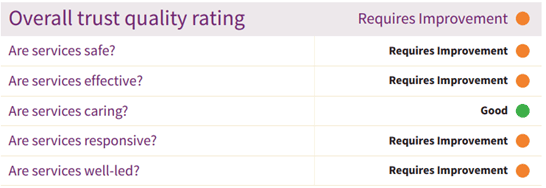
Register of Interests
The Trust is committed to openness and transparency in its work and decision-making. As part of that commitment, the Trust has published on its website an up-to-date register of interest, including gifts and hospitality for decision-making staff (as defined by the Trust with reference to the guidance) within the past twelve months, as required by the ‘Managing Conflicts of Interest in the NHS’ guidance.
Pension Scheme
As an employer with staff entitled to membership of the NHS Pension Scheme, control measures are in place to ensure that all employer obligations contained within the Scheme regulations are complied with. This includes ensuring that deductions from salary, employer’s contributions and payments into the Scheme are in accordance with the Scheme rules, and that member Pension Scheme records are accurately updated in accordance with the timescales detailed in the Regulations.
Equality, Diversity and Human Rights
Control measures are in place to ensure that all the organisation’s obligations under equality, diversity and human rights legislation are complied with. As part of the Trust’s culture improvement work, there is an Inclusivity Plan in place to deliver further improvements in relation to equality and diversity over the coming years.
UK Climate Projections
The Trust has plans in place which take account of the ‘Delivering a Net Zero Health Service’ report under the Greener NHS programme. The Trust ensures that its obligations under the Climate Change Act and the Adaptation Reporting requirements are complied with.
Review of economy, efficiency and effectiveness of the use of resources
The Trust has a range of processes to ensure that resources are used economically, efficiently, and effectively. This includes management and supervision arrangements for staff and a system of devolved budget management. This incorporates reviews of finance and performance at budget manager, service director and overall Trust-level, through detailed reporting to the Performance and Finance Committee. The Committee also scrutinises the Trust’s Quality Cost Improvement Programme and reviews delivery of this programme, which is supported by Quality Impact Assessments.
External auditors are required, as part of their annual audit, to satisfy themselves that the Trust has made proper arrangements for securing economy, efficiency and effectiveness in its use of resources, and report by exception if in their opinion the Trust has not.
Information governance
In 2023/24 a total of 39 cases were reported to the Information Commissioner’s Office (ICO) through the data security reporting tool. Of these, at the time of writing this report, the ICO took no further action in all of the cases, being satisfied with the investigation and actions taken by the Trust. Any recommendations provided by the ICO are monitored by the Trust’s Information Governance Group. An overview of the 39 incidents is as follows:
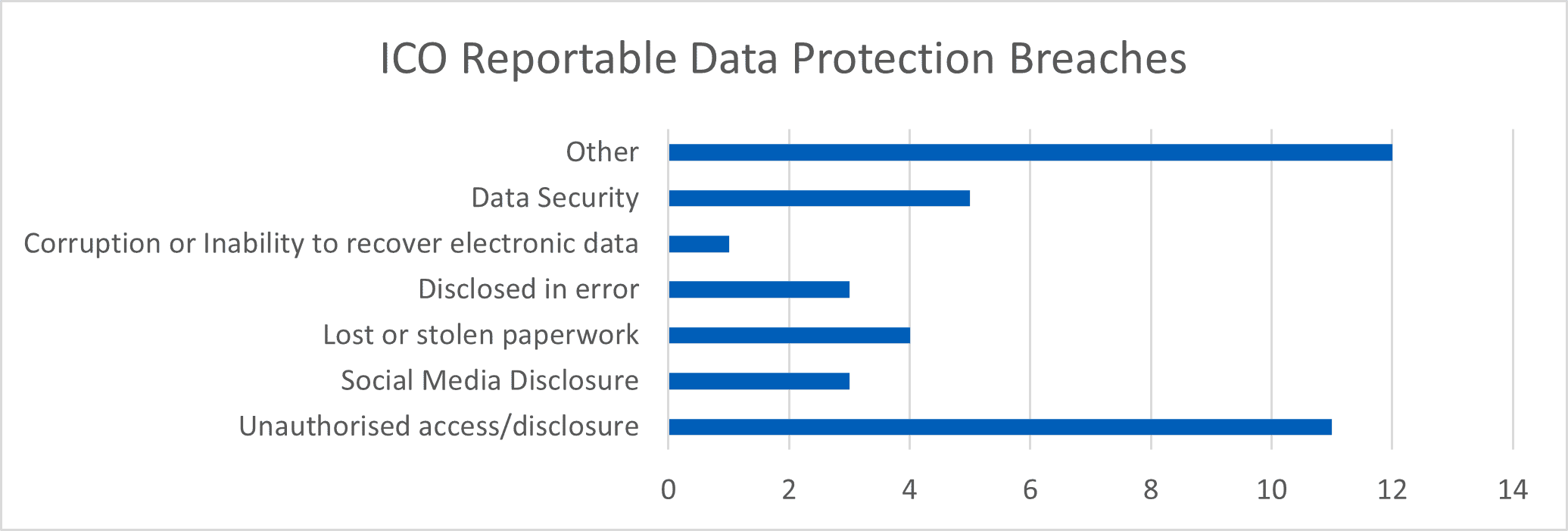
One incident met the Trust’s Serious Incident (SI) threshold and was managed under the Trust’s SI process. The incident related to accidental destruction of patient records and was reported to the ICO.
Data quality and governance
The directors are required under the Health Act 2009 and National Health Service (Quality Accounts) Regulations 2010 (as amended) to prepare service Quality Accounts for each financial year.
This account looks back at performance in the last year and sets priorities for the following year. The Board approves the account prior to publication. Arrangements are in place via Trust-wide groups to report quality and safety matters to the Quality Governance Committee, which in turn reports to the Board. This includes progress against the priorities set out in the Quality Account.
The Trust has several processes in place to ensure that data are accurate and provides a balanced view. These include:
- Clinical data and outcomes checked and verified by the Clinical Audit Manager (State Registered Paramedic) prior to submission to the national audit programmes.
- Monthly checks of Department of Health statistical reports to ensure latest comparative data are included.
- Assurance through governance processes to Board-level via the Integrated Board Report
Data Security and Protection Toolkit.
Assurance provided through the Information Governance Group and the Data Quality and Security Group to Trust Board via the Audit Committee.
Regular scrutiny of processes and information through Board Sub-Committees.
Continued transition activity to maintain and develop the Data Lake – a single source of our data that cannot be manipulated.
Key risks to data relate to the need for manual manipulation of aspects of the data set, due to multiple systems not yet interacting automatically with one another. Mitigations include the development of clear standard operating procedures for all data sets utilised. Operational data via the 999 and patient care records are assured as accurate as these are automated.
Review of effectiveness
As Accountable Officer, I have responsibility for reviewing the effectiveness of the system of internal control. My review of the effectiveness of the system of internal control is informed by the work of the internal auditors, clinical audit and the executive managers and clinical leads within the NHS Trust who have responsibility for the development and maintenance of the internal control framework. I have drawn on the information provided in this annual report and other performance information available to me. My review is also informed by comments made by the external auditors in their management letter and other reports. I have been advised on the implications of the result of my review of the effectiveness of the system of internal control by the Board, the Audit Committee and Quality Governance Committee, and a plan to address weaknesses and ensure continuous improvement of the system is in place.
The Trust Board recognises the importance of the principles of good corporate governance and is committed to ensuring these are effective and efficient. This is implemented through key governance documents, policies, and procedures of the Trust, including:
- The Board Governance and Assurance Framework, including the Sub-Committees.
- The Trust’s Standing Orders, Reservation of Powers to the Trust Board, Scheme of Delegation, and Standing Financial Instructions.
The Trust is led by a unitary Board, which provides leadership within a framework of internal control whilst promoting innovation and challenge to performance issues. The Board monitors the effectiveness of the internal control systems and processes through clear accountability arrangements. Each Executive Director is held to account for control systems and processes, monitoring methods and weaknesses within directorates; cross checking evidence of compliance with statutory functions to ensure that the Trust remains legally compliant.
Review of Effectiveness of the Trust Board and Sub-Committees
The Board and the Sub-Committees review their effectiveness on a regular basis and formally through the Board’s annual evaluation process. Assurance that each Committee has been compliant with its terms of reference and publication of an integrated effectiveness report has been achieved.
Area of improvement:
- Significant improvement on quality of papers, KPI delivery and levels of assurance. Reports, delegates, outcomes, quality of meetings and conversations.
- Decisions/recommendations supported by better quality analysis
- Pre-meets between Chair and lead Executives to prepare the agenda and discuss papers in advance. Focus on the BAF and the areas needing Committee priority and attention to deliver the strategic objectives
- Recognition of the work carried out by subgroups allowing prioritisation of more key issues.
Area for focus:
- Clear metrics and approach to managing and overseeing strategies to be developed
- Clarity around overlap/duplication with other Committees
- Data quality
- Ensuring that Committee does not slip into tactical operational management and remains focused on assurance and strategy
- Diversity of membership
Summary of activities
The following provides summary of the activities in maintaining and reviewing the effectiveness of the system of internal control:
| Trust Board | Audit Committee | Quality Governance Committee | Corporate Governance Team |
|---|---|---|---|
| Risk Management assurance – reviewing the BAF, risk escalation, Strategic risk review | Reviewing assurance pertaining to risk and governance via reports and deep dives | Review and assurance on action plans following the 2022 CQC inspection | Facilitation of well led development and working to support through NOF3 |
| Developing, reviewing and approving key Trust Strategies | Approval of the Board Governance and Assurance Framework and the Risk Management Strategy | Reviewing and approving the clinical audit plan and relevant clinical and quality annual reports | Ongoing embedding of the Board Governance and Assurance Framework and Risk Management strategy |
| Receiving and approving annual reports | Reviewing the Annual Accounts for the Trust and its charitable fund, as well as the annual governance statement | Review and approval of the Clinical Strategy | Facilitation and delivery of Board development programme |
| Approval of the annual report, accounts, and governance statement, Data Security and Protection Toolkit, and the Charitable funds annual accounts | Review in detail the Standing Orders, Standing Financial Instructions, Scheme of Delegation and Reservation of Powers to the Trust Board | Monitoring performance against the Ambulance Clinical Quality Indicators and key clinical indicators to assess quality of care | Facilitation of the CQC and other regulatory relationships. Ensuring Assurance mechanisms are in place to support improvements |
| Receiving assurance on plans and progress in relation to regulatory compliance | Reviewing in detail the system of control arrangements, including policy management, information governance, data quality and procurement. | Receiving and reviewing update reports in relation to Claims and Litigation cases, patient experience, research | Facilitation of the escalation and assurance mechanisms in support of the Board and its Sub-Committees |
| Close monitoring of the culture improvement programme as well as frequent oversight of freedom to speak up and whistle blowing | Reviewing the recommendations and action plans from internal audits. | Assessment and assurance of compliance with wider regulation, including the Civil Contingencies Act | |
| Analysis and monitoring of wider committee assurance and effectiveness in relation to risk management and internal controls. | Assuring patient safety and experience through patient network reports and deep dives into areas such as ‘No sends’ and performance ‘perfect weeks’ |
Clinical Audit activities
Clinical Audit forms part of the Quality Governance Framework and provides assurance that services are being delivered to patients at the required standard, in order that the Trust meets the dimensions of quality: patient safety, patient experience and clinical effectiveness.
The results of audits and experience audits are used to review and develop training for staff, and examples, themes and trends have enabled the Trust to identify areas that draw out the quality measures.
The Clinical Audit and Patient Experience programmes for 2023/24 focused on national, strategic, and regulatory driven audit projects that related to the priorities set within the Quality Account agenda. Full details of all audits undertaken are in the Quality Account.
The Head of Internal Audit opinion and Annual Internal Audit Programme
Head of internal audit’s annual opinion
TIAA is satisfied that, for the areas reviewed during the year, the East of England Ambulance Service NHS Trust has reasonable and effective risk management, control and governance processes in place.
This opinion is based solely on the matters that came to the attention of TIAA during the course of the internal audit reviews carried out during the year to date and is not an opinion on all elements of the risk management, control and governance processes, or the ongoing financial viability or its ability to meet financial obligations which must be obtained by the East of England Ambulance Service NHS Trust from its various sources of assurance.
Actions Taken to Address Internal Control Issues
The key challenges the Trust faced throughout 2023-24 and the actions taken were:
| Key Challenges to Internal Control | Actions taken |
|---|---|
| Operational capacity to meet demand and performance requirements | Closure of the operational workforce capacity gap; over-recruitment to control room roles; utilisation of additional private ambulance service provision to support delivery of care to patients. Collaboration on system improvement activities including development of intra-provider patient transfer (access to the stack). |
| Well led issues pertaining to culture, inclusivity, behaviours, capacity and capability | Improvement Director support; CQC improvement plan delivery in year; local culture interventions programme; enhanced staff engagement approach; strengthened whistle-blowing and freedom to speak up; Speak Up, Speak Out, Stop It campaign; Policy and procedure reviews and strengthening; increased training in values, behaviours and leadership around culture. |
Conclusion
I can confirm that there are no significant internal control issues identified that do not have a clear plan in place for effective mitigation. Where control issues have been identified, for example in relation to leadership and governance through CQC inspection, a process has been developed which ensures appropriate support and scrutiny in relation to the areas required, with robust reporting in place. Improvement is being seen across all areas of concern.
There is an acknowledgement that the Trust continues its improvement journey, with strengthened systems and controls being implemented to mitigate the internal control challenges that the Trust is actively managing. I am confident that appropriate mitigation plans are in place with clear oversight and scrutiny through the regulators and that we therefore have a generally sound system of internal control that supports the achievement of our policies, aims and objectives. We continue to identify opportunities to strengthen the internal control environment into 2024-25.
Chief Executive Officer, 19 June 2024
